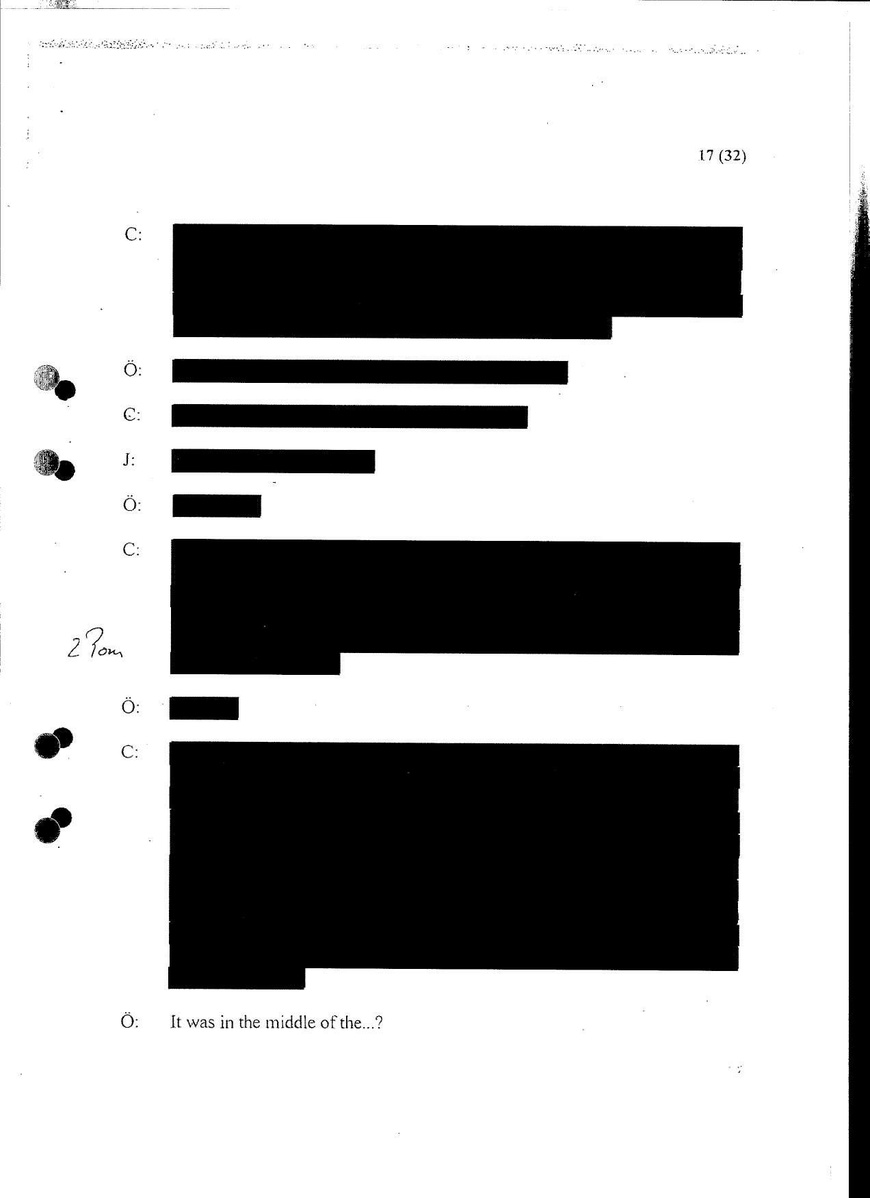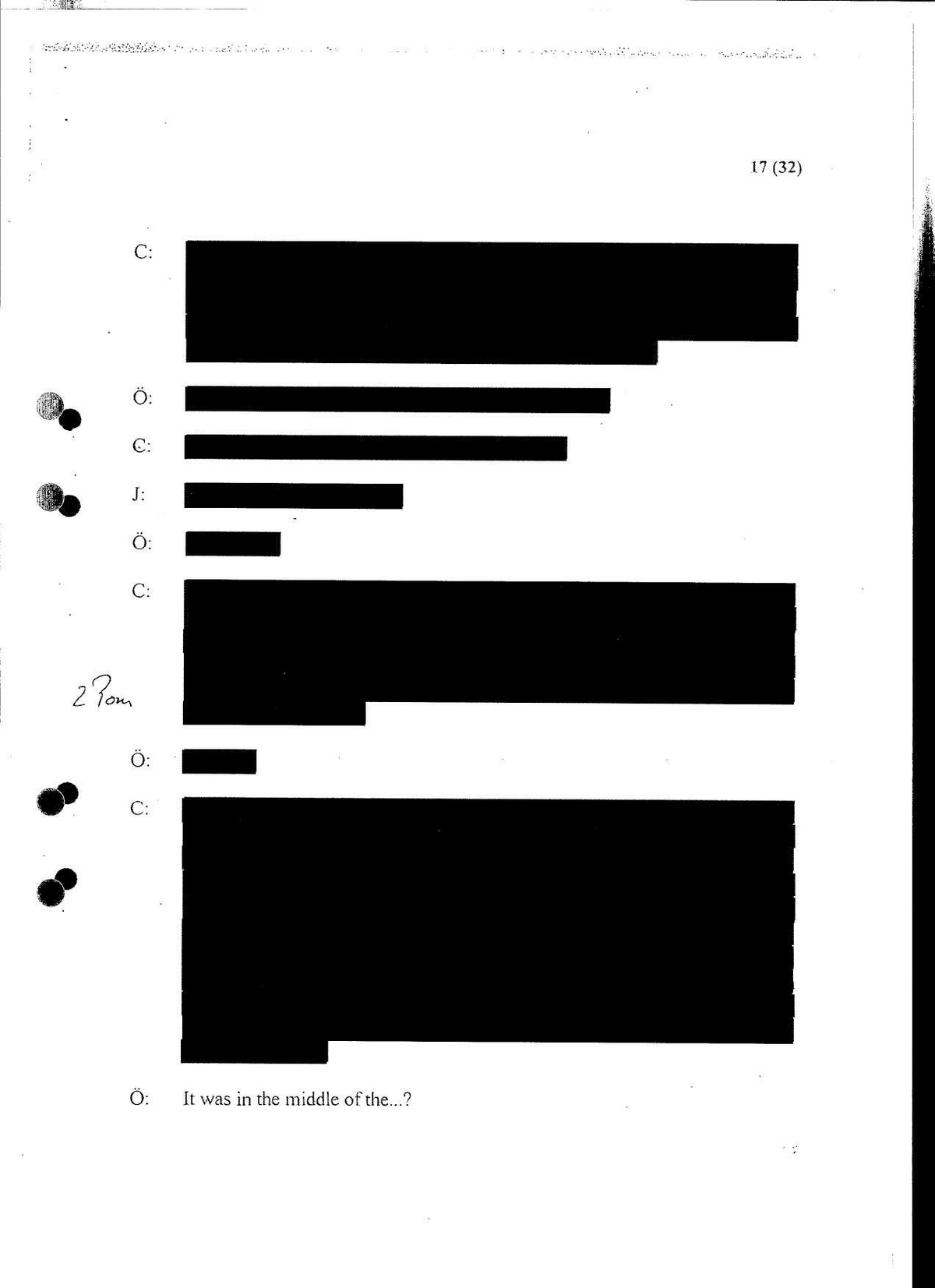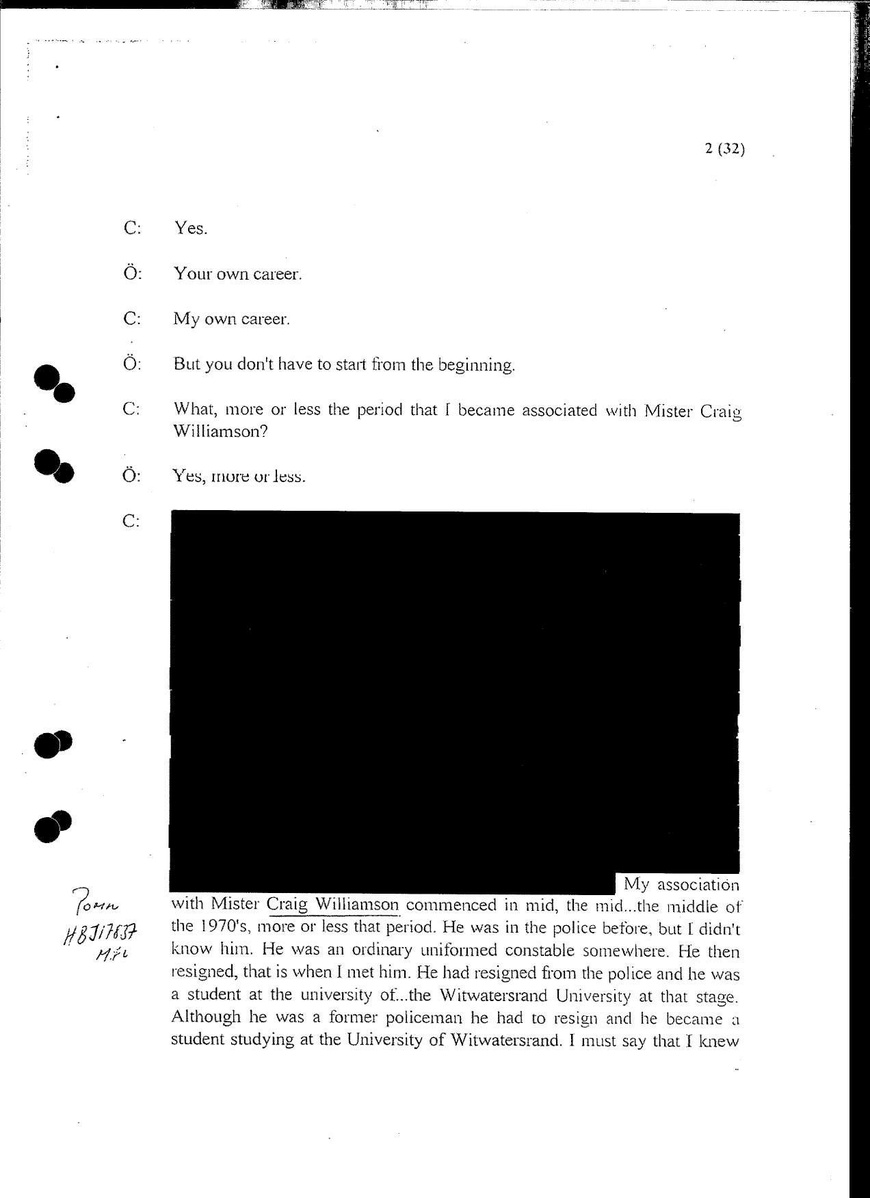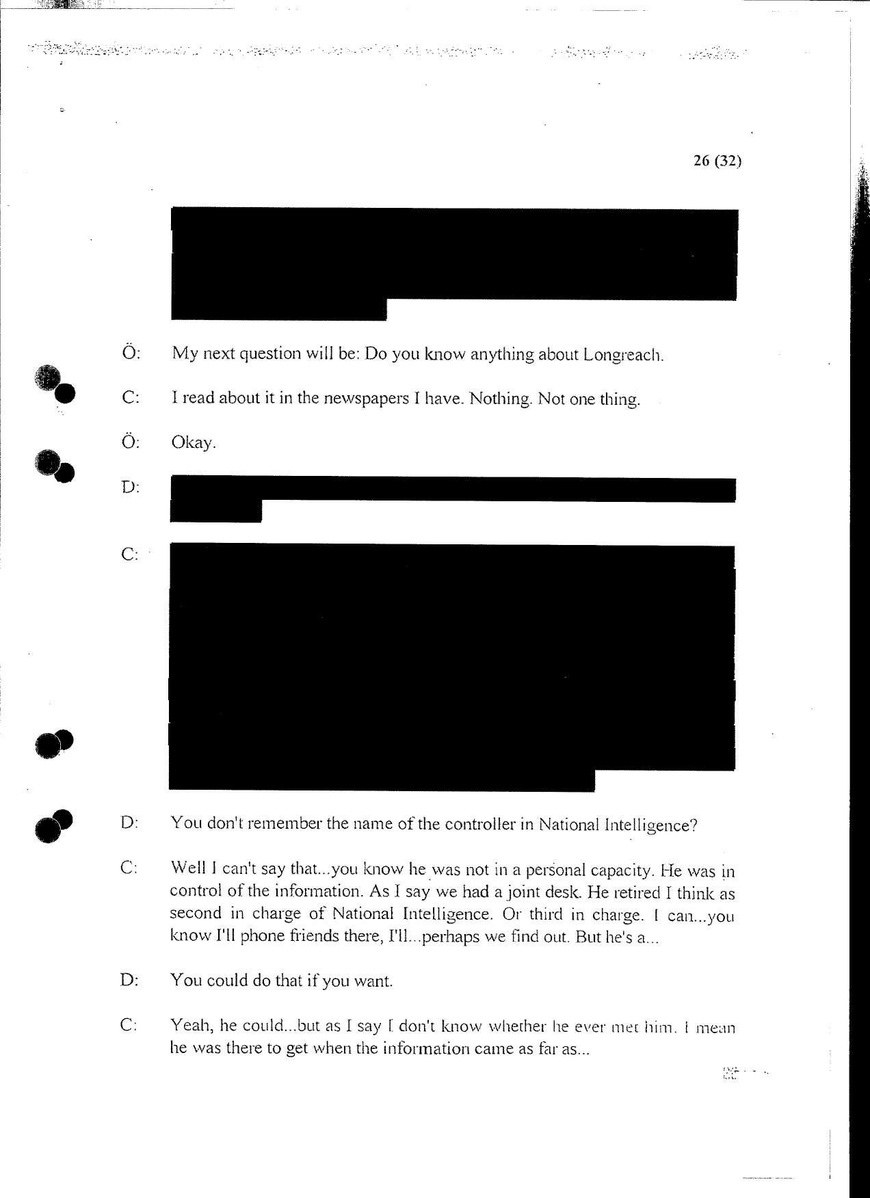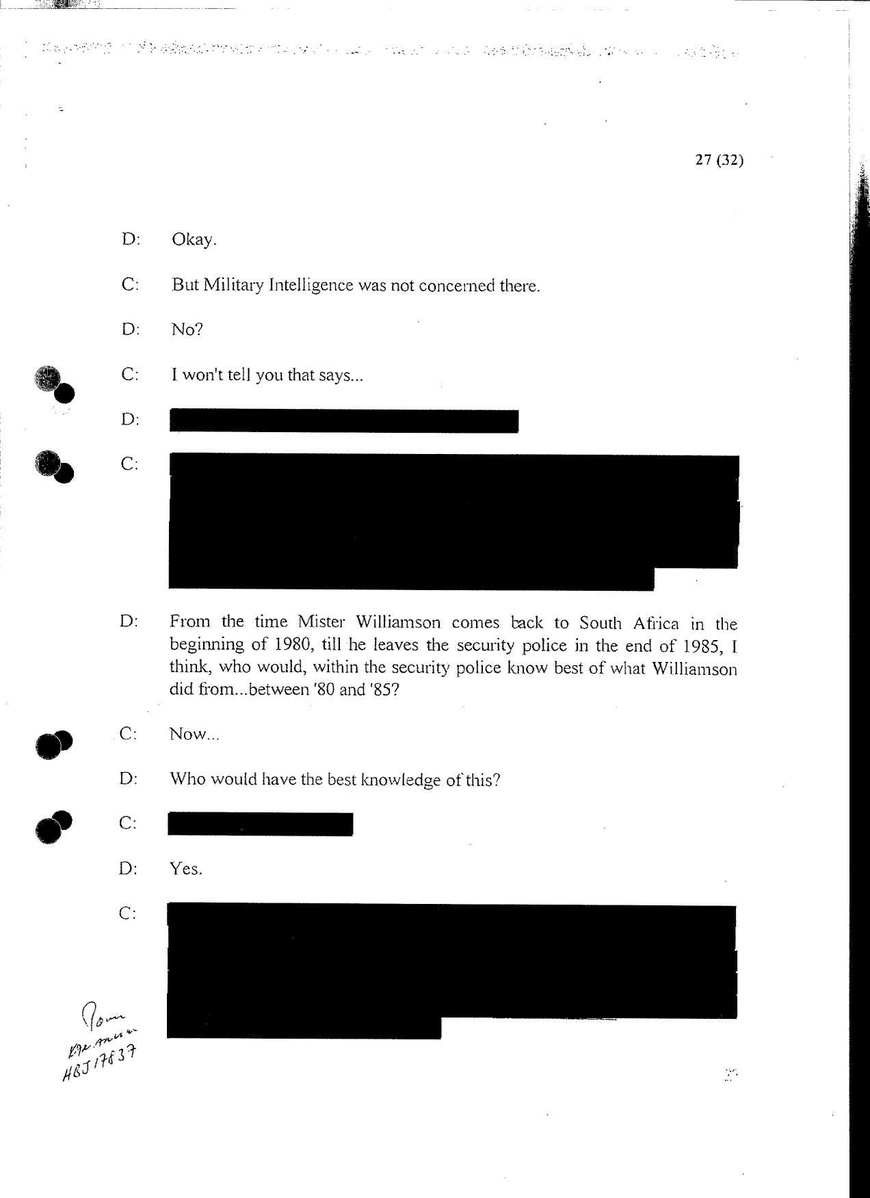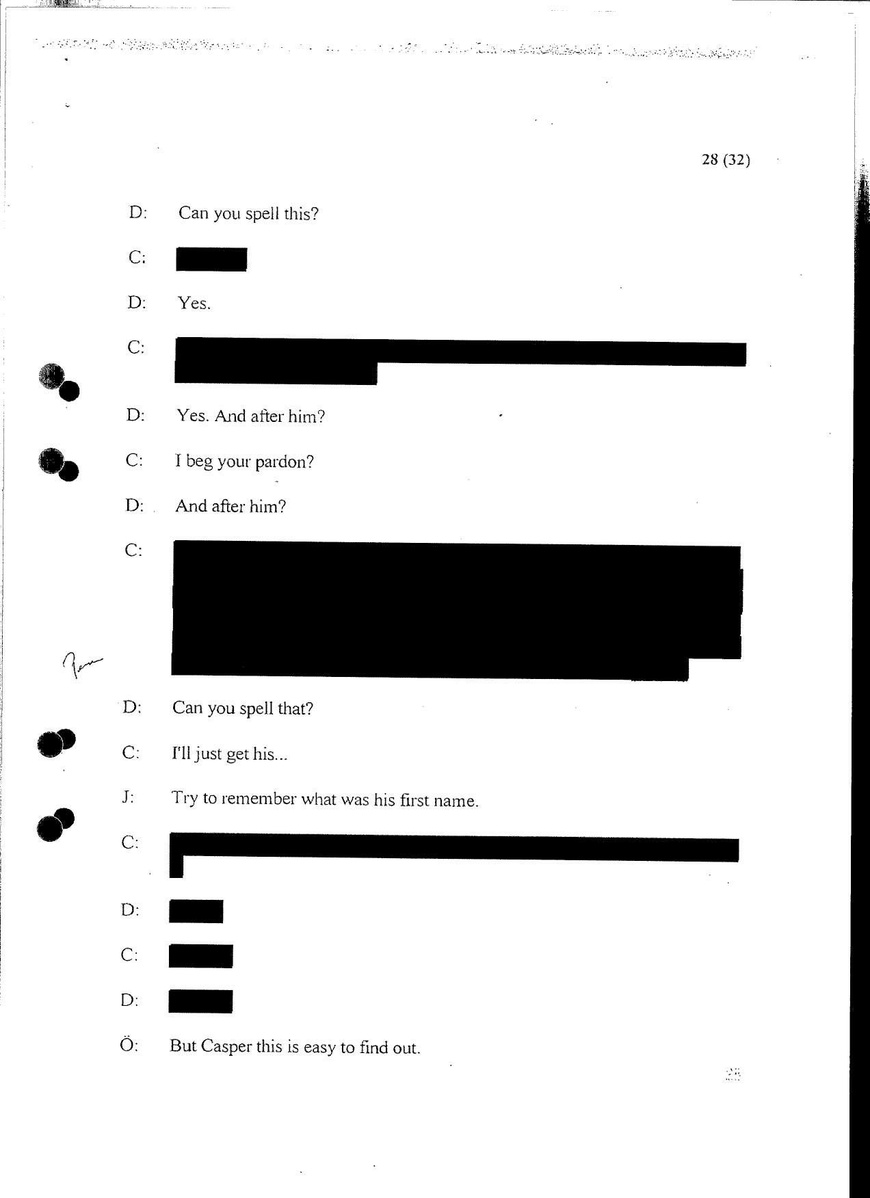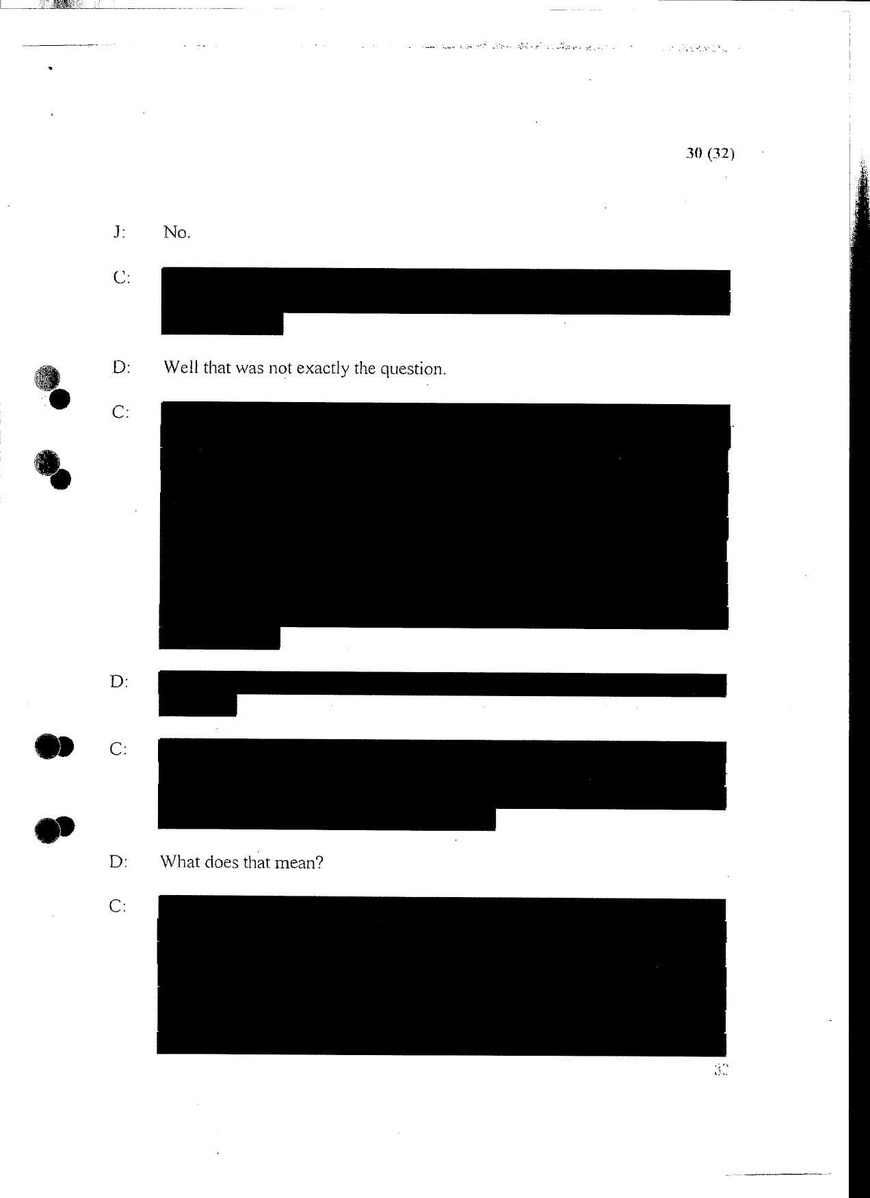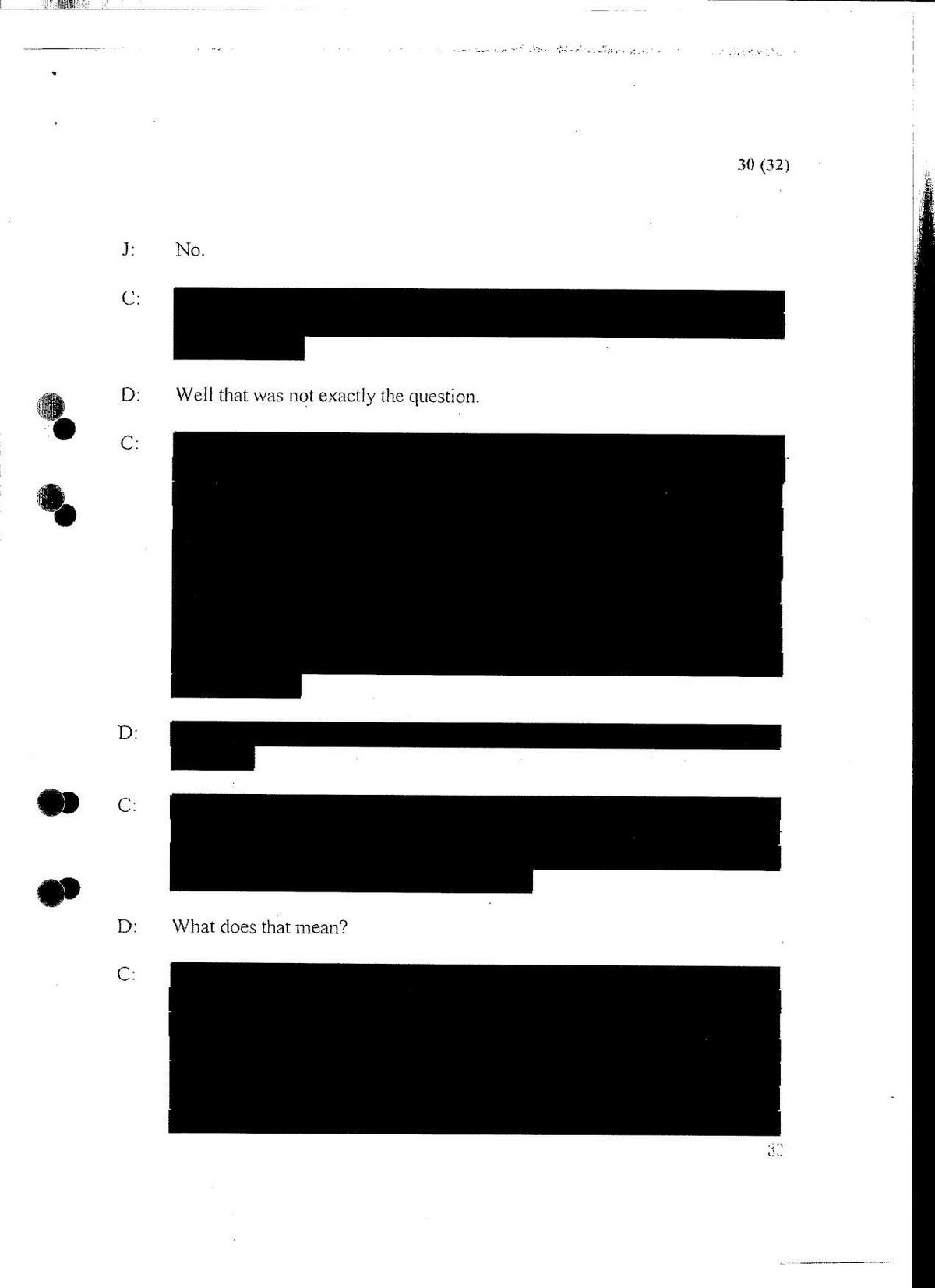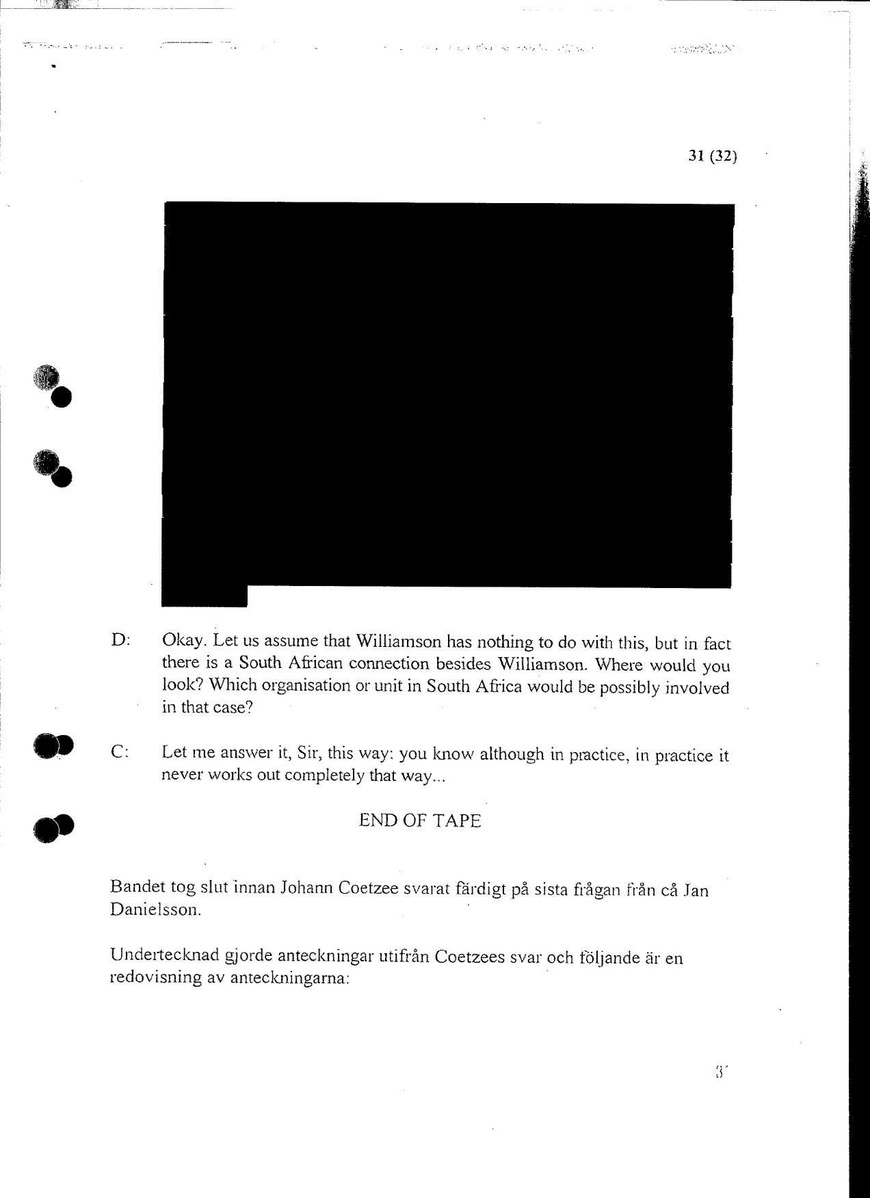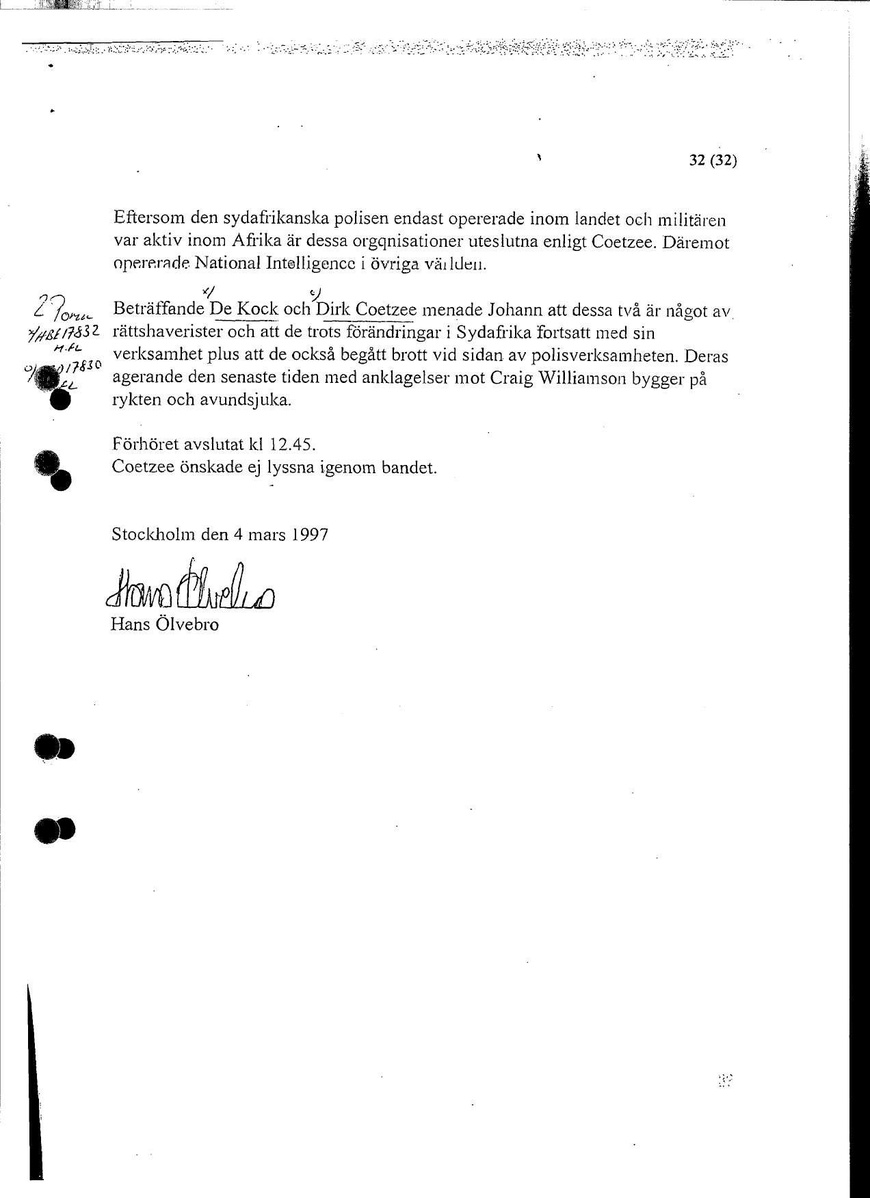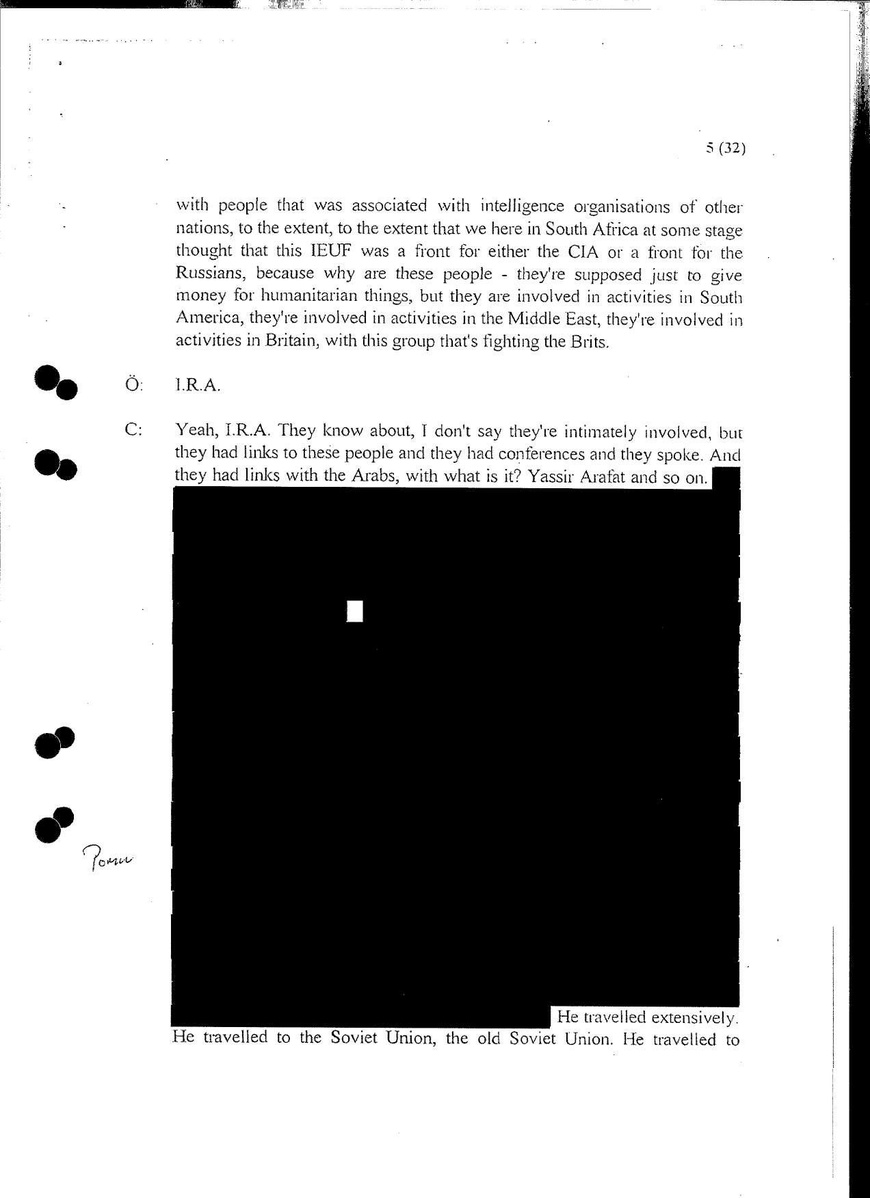Uppslag i samma avsnitt:
This is the record of the interrogation of pensioner JOHANN Coetzee,
commencing at 10:40.
Leading the interrogation is Detective Superintendent Hans Ölvebro, assisted by Chief Prosecutor Jan Danielsson.
Also present at the interrogation is Senior Superintendent (Supt) Casper Jonker.
The interrogation is being recorded on tape and is being held in English
Johann Coetzee has been informed prior to the interrogation that we are interested in obtaining information concerning his knowledge of Craig Williamson's activities during the middle of the 1980's.
Ö = FHL Hans Ölvebro
D = ÅKL Jan Danielsson
C = Johann Coetzee
J = Supt Jonker
Översättarens anmärkningar:
Där Johann Coetzee talar afrikaans, transkriberas meningen följd av en engelsk översättning inom parentes.
En obegriplig mening förekommer i förhöret samt två obegripliga ord i en annan mening.
Där stavningen av vissa namn är osäker, följs de av ett frågetecken inom parentes: (?)
FHL Hans Ölvebro: Yes, Sir, can we start with a brief information about your whole service in the police force in South Africa?
Anknytningar:
HB17684 ==> HBM17684 (Referens behövs
)
HB17745 ==> HBM17745
HBG16609 ==> HB16609 (Referens behövs
)
HBJ17837 (Förhör med Craig Williamson)
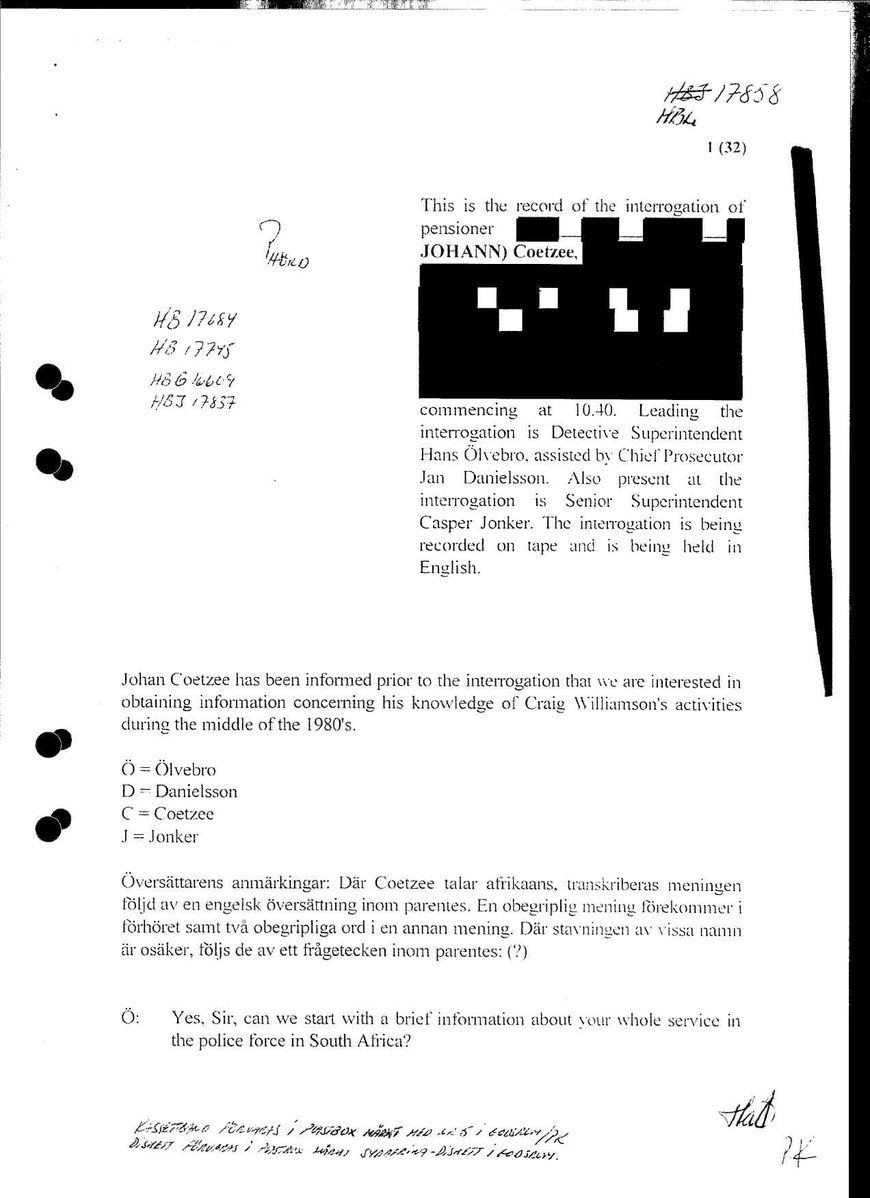
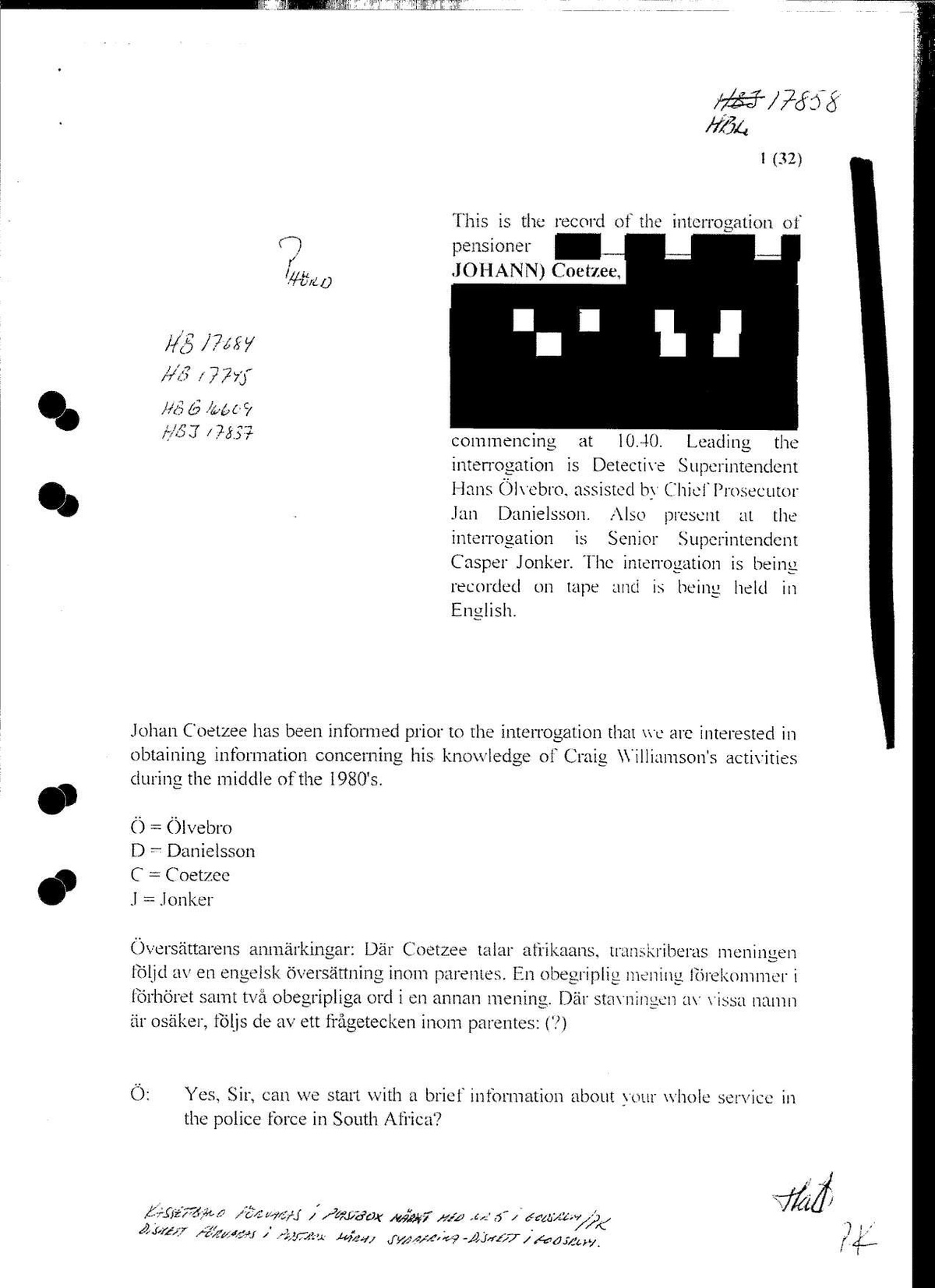
This is the record of the interrogation of pensioner JOHANN Coetzee,
commencing at 10:40.
Leading the interrogation is Detective Superintendent Hans Ölvebro, assisted by Chief Prosecutor Jan Danielsson.
Also present at the interrogation is Senior Superintendent (Supt) Casper Jonker.
The interrogation is being recorded on tape and is being held in English
Johann Coetzee has been informed prior to the interrogation that we are interested in obtaining information concerning his knowledge of Craig Williamson's activities during the middle of the 1980's.
Ö = FHL Hans Ölvebro
D = ÅKL Jan Danielsson
C = Johann Coetzee
J = Supt Jonker
Översättarens anmärkningar:
Där Johann Coetzee talar afrikaans, transkriberas meningen följd av en engelsk översättning inom parentes.
En obegriplig mening förekommer i förhöret samt två obegripliga ord i en annan mening.
Där stavningen av vissa namn är osäker, följs de av ett frågetecken inom parentes: (?)
FHL Hans Ölvebro: Yes, Sir, can we start with a brief information about your whole service in the police force in South Africa?
Anknytningar:
HB17684 ==> HBM17684 (Referens behövs
)
HB17745 ==> HBM17745
HBG16609 ==> HB16609 (Referens behövs
)
HBJ17837 (Förhör med Craig Williamson)
- - 10 (32) -
Johann Coetzee: with the money of the IUF?
How do you do that now? Whose money is it? What can you claim?
But what we did, we compiled a budget also. You know as if this organisation of Craig Williamson did exist here, as if it was a valid organisation, so that we could claim and say:
- "Well this is what the budget allowed us of the IUEF, and this is what we did with it" you understand.
So basically we followed, I think this is what I want to stress, we followed the instructions as if it was a subsidiary organisation of the IEUF.
You know if a man had to go for instance to a place we'd say:
- "Go and rent a car and pay for it out of this money, and the hotels when you stay when you go there, you stay on this money" and so on and so on and so on.
But if they say you can get a present, we're not giving it to you.
So basically it was an honest effort with Treasury to work out how are we going to do this in a proper legalistic fashion. I've mentioned the two aspects.
There were many cases, you must please realise I'm just taking one or two, but many cases like that you have throughout the length and breadth of South Africa.
I've mentioned that I saw Mister Craig Williamson once during this period in Belgium. I didn't go to Switzerland at this stage and so on.
And to discuss with him you know our views.
The problem was: he didn't get very much feedback from us.
We didn't have the capacity to, like you have with your people in South Africa, to give him instructions or say:
- "You must do this or do that or do that. Because we could make contact with him perhaps once in six months and so on.
Now what I again want to stress that in this process he really got to know very many people throughout the world of different categories, basically on a political level. Very little, very little on a university and academic level. Very little.
As far as I'm concerned, the reports that I've seen, it was ninety per cent concerned purely political issues that they were dealing with. That's why we became suspicious and said:
- "This is a big scam. This is not concerned with education at all, it's concerned with intelligence gathering.
Helt stycke maskerat
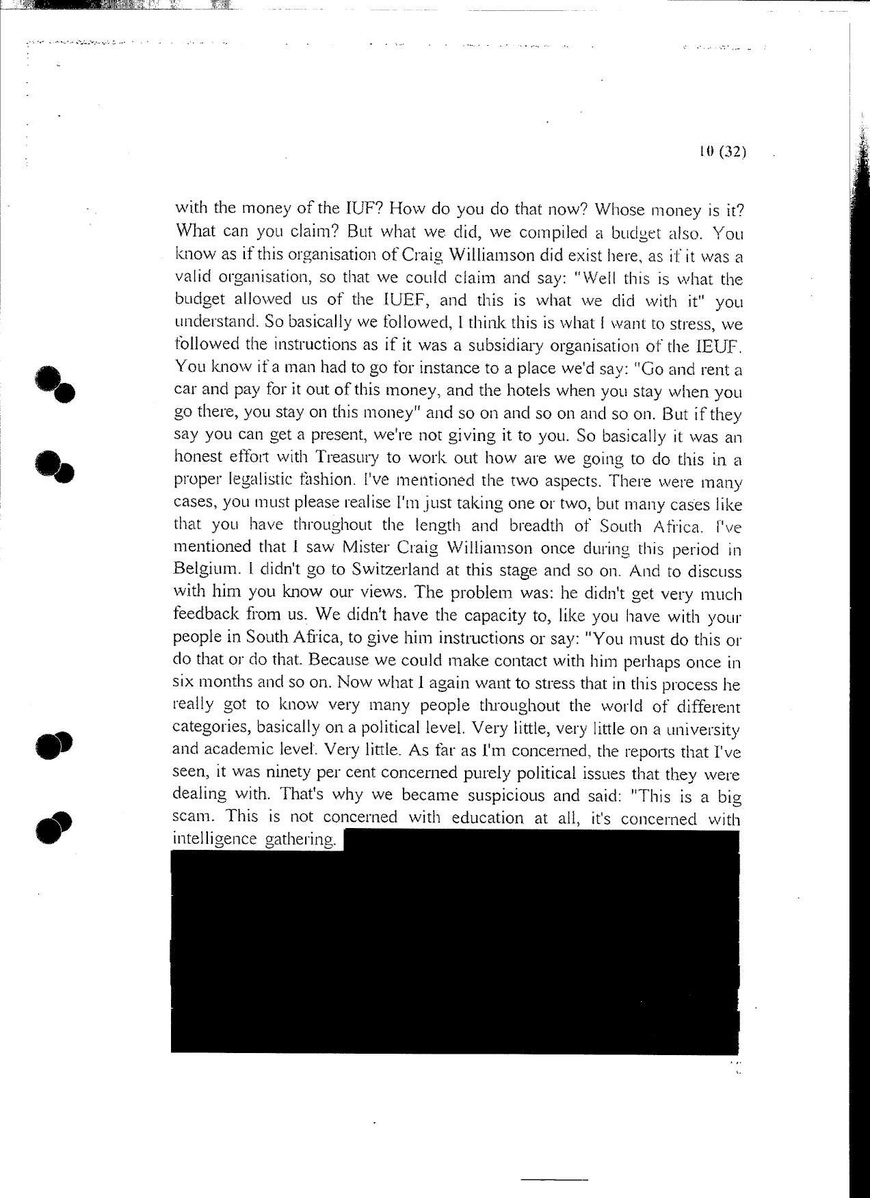
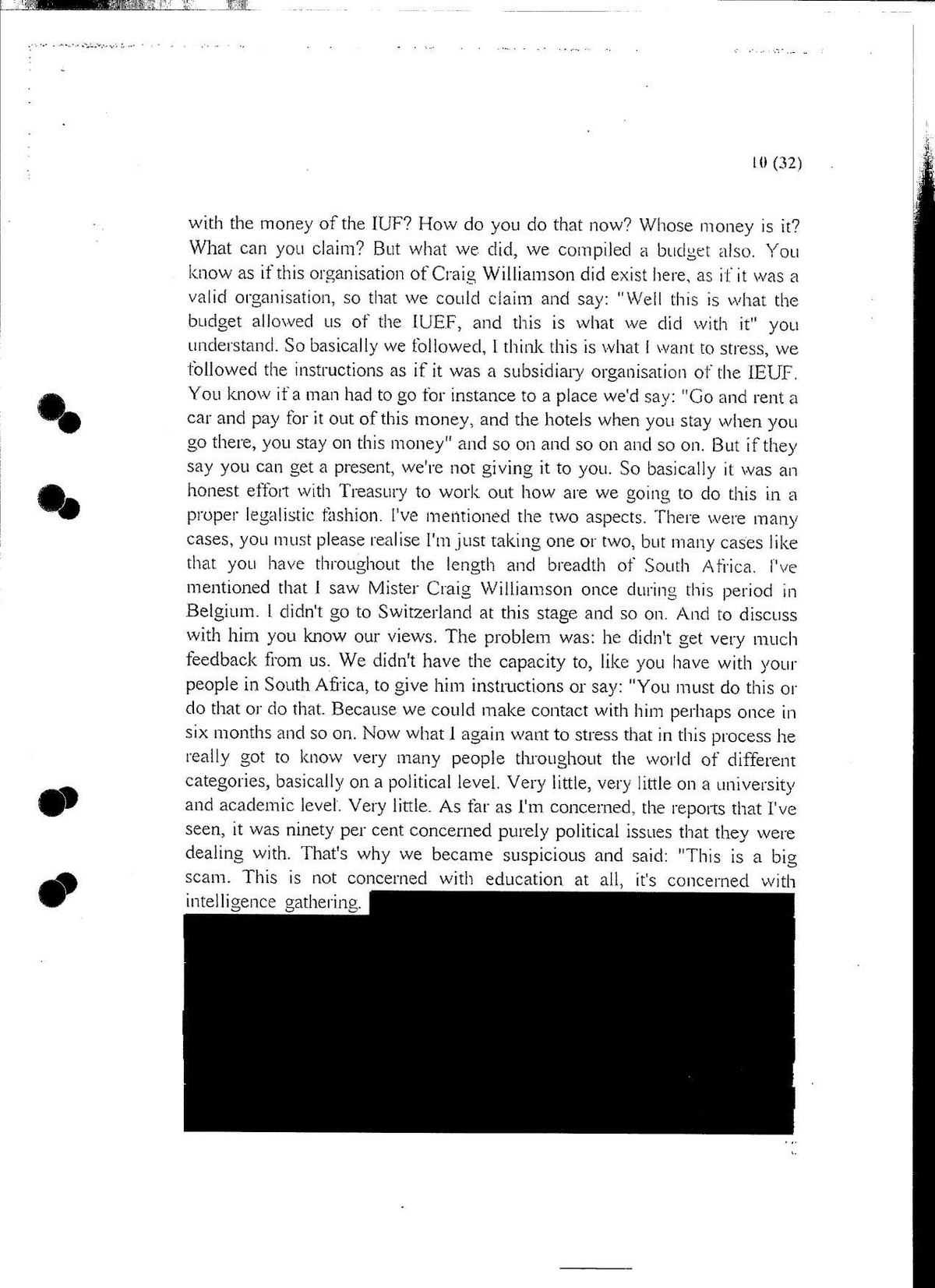
- - 10 (32) -
Johann Coetzee: with the money of the IUF?
How do you do that now? Whose money is it? What can you claim?
But what we did, we compiled a budget also. You know as if this organisation of Craig Williamson did exist here, as if it was a valid organisation, so that we could claim and say:
- "Well this is what the budget allowed us of the IUEF, and this is what we did with it" you understand.
So basically we followed, I think this is what I want to stress, we followed the instructions as if it was a subsidiary organisation of the IEUF.
You know if a man had to go for instance to a place we'd say:
- "Go and rent a car and pay for it out of this money, and the hotels when you stay when you go there, you stay on this money" and so on and so on and so on.
But if they say you can get a present, we're not giving it to you.
So basically it was an honest effort with Treasury to work out how are we going to do this in a proper legalistic fashion. I've mentioned the two aspects.
There were many cases, you must please realise I'm just taking one or two, but many cases like that you have throughout the length and breadth of South Africa.
I've mentioned that I saw Mister Craig Williamson once during this period in Belgium. I didn't go to Switzerland at this stage and so on.
And to discuss with him you know our views.
The problem was: he didn't get very much feedback from us.
We didn't have the capacity to, like you have with your people in South Africa, to give him instructions or say:
- "You must do this or do that or do that. Because we could make contact with him perhaps once in six months and so on.
Now what I again want to stress that in this process he really got to know very many people throughout the world of different categories, basically on a political level. Very little, very little on a university and academic level. Very little.
As far as I'm concerned, the reports that I've seen, it was ninety per cent concerned purely political issues that they were dealing with. That's why we became suspicious and said:
- "This is a big scam. This is not concerned with education at all, it's concerned with intelligence gathering.
Helt stycke maskerat
- - 11 (32) -
Johann Coetzee:
Now to come back to Mister Craig Williamson at this stage, which may have a link somewhere.
I don't know if you're aware of it, but the IEUF also had reasonably strong links with the Russian Intelligence. Did you know that?
ÅKL Jan Danielsson: No.
Johann Coetzee: They had very ... reasonably good intelligence. There were visitors. Russian.
I don't know if Craig Williamson will remember the name (?) that came regularly, on a regular basis from Russia to Switzerland to interview Mister Lars-Gunnar Eriksson.
One of the issues, and you must please be very circumspect with this information.
We got a message from Mister Craig Williamson that either this Russian or Mister Craig Williamson wanted to know about our atomic developments.
You know in South Africa at a place near Pretoria: Pelindaba. Wanted to know the particulars of that. And ... now it became an open secret afterwards.
It was revealed afterwards that South Africa was developing nuclear weapons. It was true.
And the note that we got from Williamson was that we must try and get the particulars of the building in which this reactor was situated.
And I went to the security people at this place Pelindaba. I was personally unaware that South Africa was doing this, because the government at that stage said it was peaceful.
But I went to the ... who was a general, an ex-police general. He was in charge of security there: . I went to him.
I knew him from my police days and I explained the situation to him. He had an understudy also.
He may be dead or he may be very ill, I don't ... I've never heard of him again.
But his second-in-charge must be still alive. He was a brigadier when he left and he went to work there and he afterwards became their chief of security.
And I explained confidentially the situation.
We worked out a scheme that we will pretend that we've got an agent that's working there.
No, but he hasn't got access to the big secrets, but he could get the whole plan first and so on.
So the things that was published you know openly about this Pelindaba we said to Craig Williamson in the beginning, and said:
- "now listen, this is initially but our agent has got instructions to try deeper to get people to give him information about this. At the end, the experts there at Pelindaba drew up a diagram of the real place where the reactor was, but which was completely wrong, it was not the real thing, it
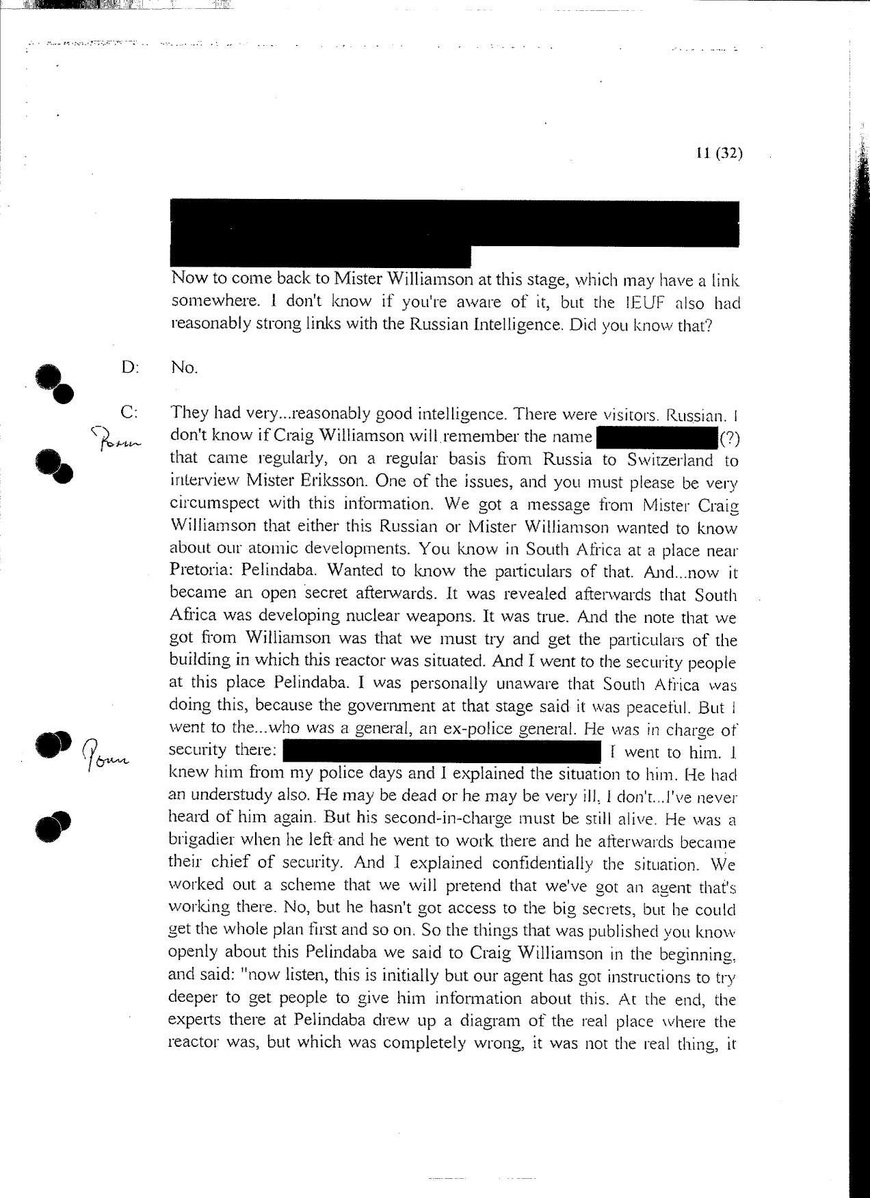
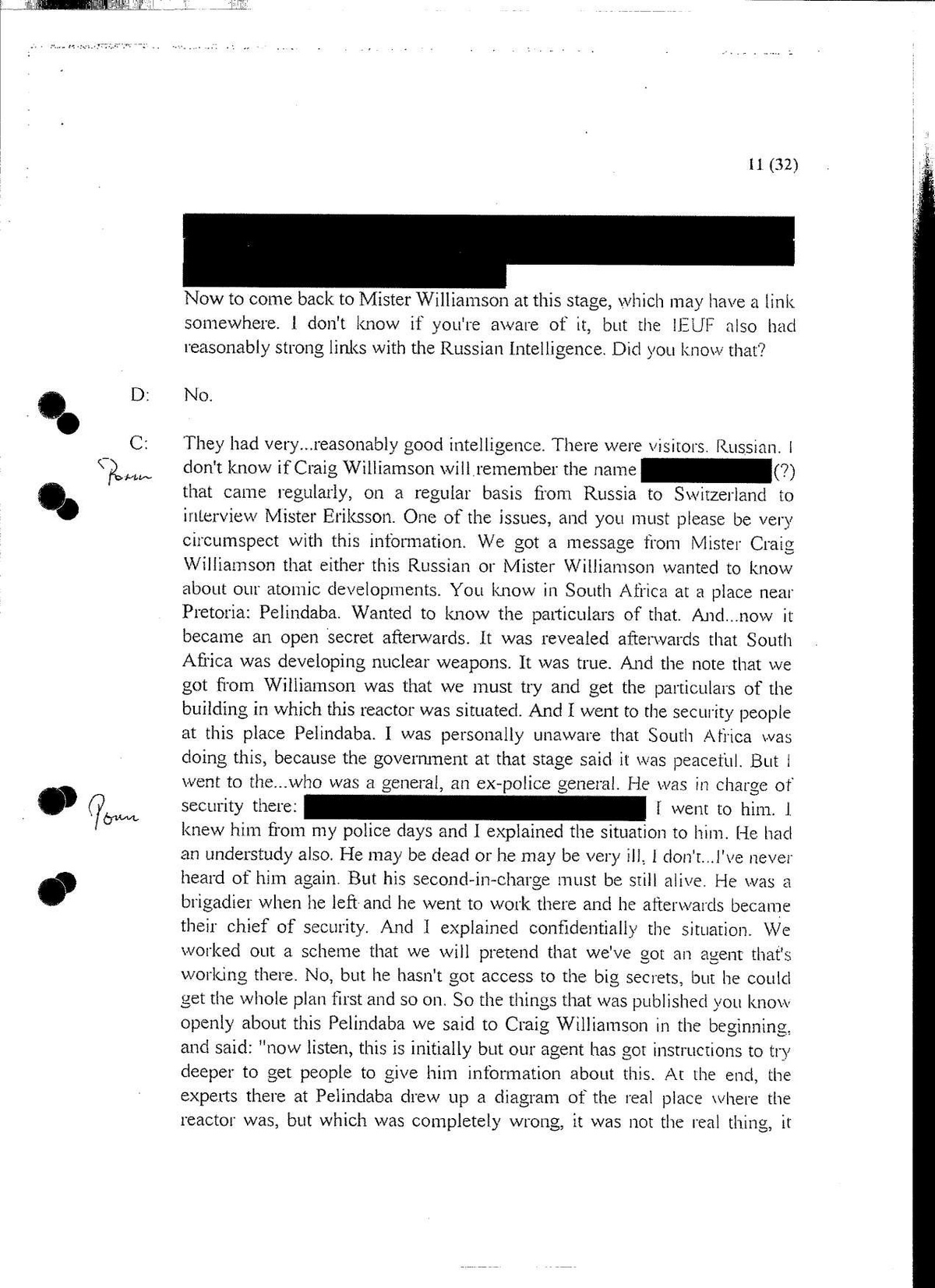
- - 11 (32) -
Johann Coetzee:
Now to come back to Mister Craig Williamson at this stage, which may have a link somewhere.
I don't know if you're aware of it, but the IEUF also had reasonably strong links with the Russian Intelligence. Did you know that?
ÅKL Jan Danielsson: No.
Johann Coetzee: They had very ... reasonably good intelligence. There were visitors. Russian.
I don't know if Craig Williamson will remember the name (?) that came regularly, on a regular basis from Russia to Switzerland to interview Mister Lars-Gunnar Eriksson.
One of the issues, and you must please be very circumspect with this information.
We got a message from Mister Craig Williamson that either this Russian or Mister Craig Williamson wanted to know about our atomic developments.
You know in South Africa at a place near Pretoria: Pelindaba. Wanted to know the particulars of that. And ... now it became an open secret afterwards.
It was revealed afterwards that South Africa was developing nuclear weapons. It was true.
And the note that we got from Williamson was that we must try and get the particulars of the building in which this reactor was situated.
And I went to the security people at this place Pelindaba. I was personally unaware that South Africa was doing this, because the government at that stage said it was peaceful.
But I went to the ... who was a general, an ex-police general. He was in charge of security there: . I went to him.
I knew him from my police days and I explained the situation to him. He had an understudy also.
He may be dead or he may be very ill, I don't ... I've never heard of him again.
But his second-in-charge must be still alive. He was a brigadier when he left and he went to work there and he afterwards became their chief of security.
And I explained confidentially the situation.
We worked out a scheme that we will pretend that we've got an agent that's working there.
No, but he hasn't got access to the big secrets, but he could get the whole plan first and so on.
So the things that was published you know openly about this Pelindaba we said to Craig Williamson in the beginning, and said:
- "now listen, this is initially but our agent has got instructions to try deeper to get people to give him information about this. At the end, the experts there at Pelindaba drew up a diagram of the real place where the reactor was, but which was completely wrong, it was not the real thing, it
- - 12 (32) -
Johann Coetzee: was a fabrication, but which indicated to people in the intelligence or the nuclear physics world that it was a peaceful thing, it couldn't be used for other purposes.
Now this we forwarded, you can go and ask Mister Craig Williamson, perhaps he's forgotten.
Now this was basically for the Russians, that they could get, that they asked for and to find out. Not the American chaps or anybody, it was the Russians that wanted to know.
Now this German ... this Russian guy, at one stage he was arrested by the Swiss police and he was detained for a day or two and then he was declared an illegal immigrant and he couldn't come back.
I know there was big problems and Lars-Gunnar Eriksson was very cross, you know because this man couldn't come, so he had definite links there, that is a fact. That's what I know. The only case that I know, you know.
I know that Craig Williamson reported that he came, he was a very ... they went out together and then they went to restaurants and so on, but this is the one occasion, to me it was definite, it wasn't just a family or a social relationship, it really had on the basis of gathering information.
So we've sent back four five six reports to Craig Williamson about this which he handed I think to Erik William Eriksson or to the Russian himself.
He must explain that, perhaps he's forgotten about it, I don't know, but this is a fact.
It was very important at that stage and I reported that to our government also: I said:
- "You know the Russians are now interested in this affair through links of ours and this is what we've done." The government was very perturbed and was very worried about it.
"(Pomn 1)
So that is basically what happened.
You can ask me more questions about that period, but that's an overall situation. Now I don't know the exact date, but when Craig Williamson was working att Witts University,
(Pomn 2)
Helt stycke maskerat
Personer omnämnda:
Pomn 1):
HB 10658 => HBO 10658 (Svenska Dagbladets scenario)
HBD 17830 (Förhör med Dirk Coetzee)
HBJ 17837 (Förhör 1996-10-18 med Craig Williamson)
Pomn ):
HB7178?? (Referens behövs
)
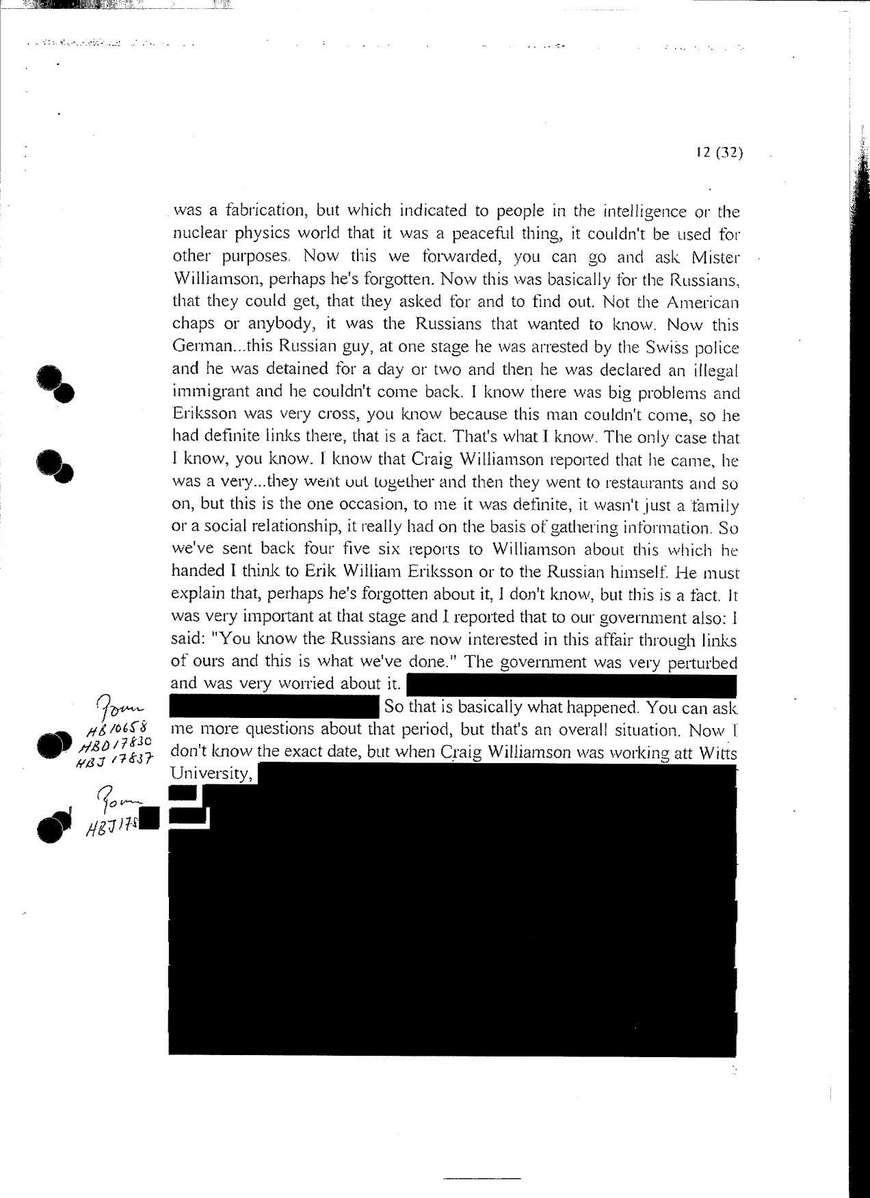
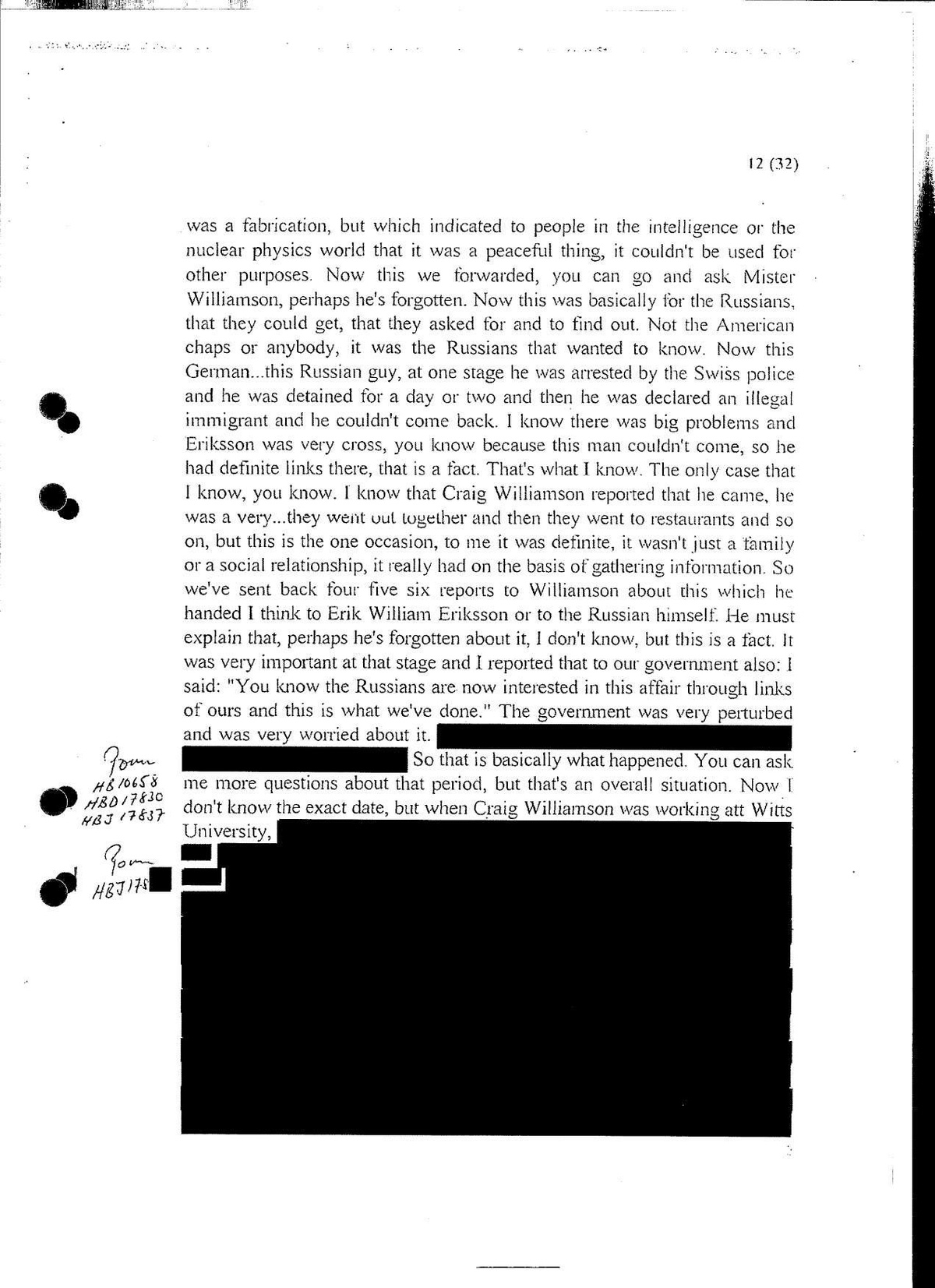
- - 12 (32) -
Johann Coetzee: was a fabrication, but which indicated to people in the intelligence or the nuclear physics world that it was a peaceful thing, it couldn't be used for other purposes.
Now this we forwarded, you can go and ask Mister Craig Williamson, perhaps he's forgotten.
Now this was basically for the Russians, that they could get, that they asked for and to find out. Not the American chaps or anybody, it was the Russians that wanted to know.
Now this German ... this Russian guy, at one stage he was arrested by the Swiss police and he was detained for a day or two and then he was declared an illegal immigrant and he couldn't come back.
I know there was big problems and Lars-Gunnar Eriksson was very cross, you know because this man couldn't come, so he had definite links there, that is a fact. That's what I know. The only case that I know, you know.
I know that Craig Williamson reported that he came, he was a very ... they went out together and then they went to restaurants and so on, but this is the one occasion, to me it was definite, it wasn't just a family or a social relationship, it really had on the basis of gathering information.
So we've sent back four five six reports to Craig Williamson about this which he handed I think to Erik William Eriksson or to the Russian himself.
He must explain that, perhaps he's forgotten about it, I don't know, but this is a fact.
It was very important at that stage and I reported that to our government also: I said:
- "You know the Russians are now interested in this affair through links of ours and this is what we've done." The government was very perturbed and was very worried about it.
"(Pomn 1)
So that is basically what happened.
You can ask me more questions about that period, but that's an overall situation. Now I don't know the exact date, but when Craig Williamson was working att Witts University,
(Pomn 2)
Helt stycke maskerat
Personer omnämnda:
Pomn 1):
HB 10658 => HBO 10658 (Svenska Dagbladets scenario)
HBD 17830 (Förhör med Dirk Coetzee)
HBJ 17837 (Förhör 1996-10-18 med Craig Williamson)
Pomn ):
HB7178?? (Referens behövs
)
- - 13 (32) -
Johann Coetzee:
Helt stycke maskerat
You know it was a long time ago.
So it was decided that I would go overseas and make contact with Craig Williamson there.
I went overseas and I met Craig Williamson again ... in Belgium on this particular issue.
His wife was also at that stage studying at the university in Switzerland as a ... for a doctor, she's completed the first year. So we were very worried about the situation.
Craig Williamson came to me in the hotel and we were about a day or two together to you know to work out exactly what did this chap know.
What could he reveal and what danger Craig Williamson was, etcetera.
His attitude was in any event that the game was up.
It was very very sorry but that you know there could be proof, you know and they even if they couldn't prove it in a court of law they'd side it, they'd side it ... put him on another railway line.
And he says
- "Unless, there's one thing and if we could solve that. Unless we could persuade Lars-Gunnar Eriksson."
Unless I could persuade him. I'd never met him in my whole life, but unless he and I could persuade him and tell him and persuade him that
- "Listen, we're not doing anything against the interests of Sweden. We're nor interested in Sweden."
That's true, I mean I never saw a report about Sweden. Craig Williamson never reported anything about Sweden, Swedish politics or anything of that nature.
And I said:
- "Now all right, there's only one way that this can be done, and we must arrange a meeting between him and myself."
And Craig Williamson phoned him. He was in Genève.
And I travelled by train to Zurich. And we stayed ... I stayed in an hotel and I went to another hotel and Mister Williams... Mister Lars-Gunnar Eriksson was called to this hotel.
Craig Williamson said he wanted to talk to him there about a very sensitive matter and so on. Well obviously Lars-Gunnar Eriksson was very worried because why? This is my man, he's working with me here, why does he want to see me now in Zurich?
But anyway he arrived that morning by plane, we went to the airport to see if he's been followed or what was happening and so on, and then we rushed off ... Is it nearly finished?
FHL Hans Ölvebro: Yes. You have to turn it over.
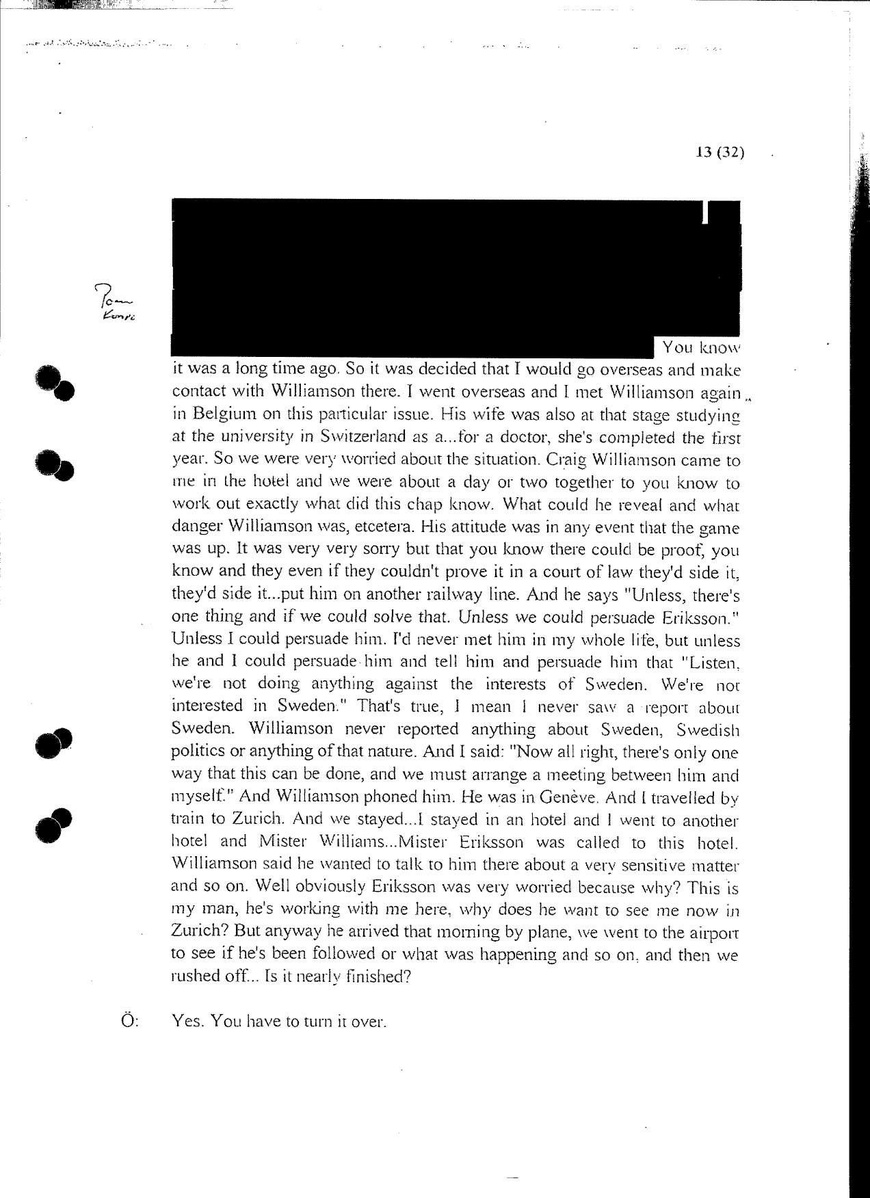
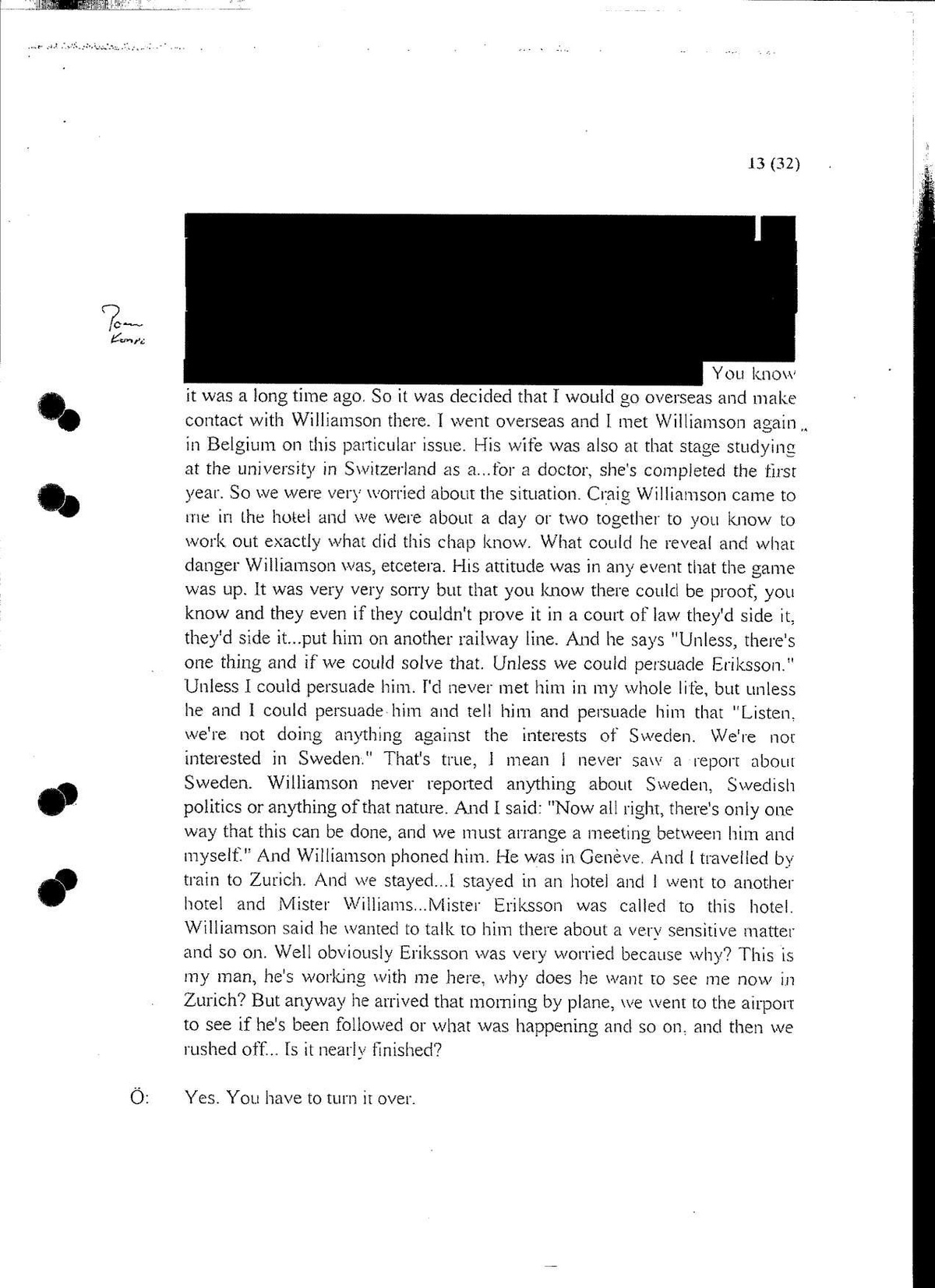
- - 13 (32) -
Johann Coetzee:
Helt stycke maskerat
You know it was a long time ago.
So it was decided that I would go overseas and make contact with Craig Williamson there.
I went overseas and I met Craig Williamson again ... in Belgium on this particular issue.
His wife was also at that stage studying at the university in Switzerland as a ... for a doctor, she's completed the first year. So we were very worried about the situation.
Craig Williamson came to me in the hotel and we were about a day or two together to you know to work out exactly what did this chap know.
What could he reveal and what danger Craig Williamson was, etcetera.
His attitude was in any event that the game was up.
It was very very sorry but that you know there could be proof, you know and they even if they couldn't prove it in a court of law they'd side it, they'd side it ... put him on another railway line.
And he says
- "Unless, there's one thing and if we could solve that. Unless we could persuade Lars-Gunnar Eriksson."
Unless I could persuade him. I'd never met him in my whole life, but unless he and I could persuade him and tell him and persuade him that
- "Listen, we're not doing anything against the interests of Sweden. We're nor interested in Sweden."
That's true, I mean I never saw a report about Sweden. Craig Williamson never reported anything about Sweden, Swedish politics or anything of that nature.
And I said:
- "Now all right, there's only one way that this can be done, and we must arrange a meeting between him and myself."
And Craig Williamson phoned him. He was in Genève.
And I travelled by train to Zurich. And we stayed ... I stayed in an hotel and I went to another hotel and Mister Williams... Mister Lars-Gunnar Eriksson was called to this hotel.
Craig Williamson said he wanted to talk to him there about a very sensitive matter and so on. Well obviously Lars-Gunnar Eriksson was very worried because why? This is my man, he's working with me here, why does he want to see me now in Zurich?
But anyway he arrived that morning by plane, we went to the airport to see if he's been followed or what was happening and so on, and then we rushed off ... Is it nearly finished?
FHL Hans Ölvebro: Yes. You have to turn it over.
- - 14 (32) -
Johann Coetzee: It's a nice story.
FHL Hans Ölvebro: Yes.
FHL Hans Ölvebro: Please go on.
Johann Coetzee: In any event Mister Williams ... Mister Lars-Gunnar Eriksson came to the hotel, in the lounge and we sat not, in a room, it was in an open lounge, other people were sitting at different tables there and so on. And he knew Craig Williamson and came immediately to where we were.
We've arranged it ... I think ... I'm not sure whether I had a tape recorder. I can't remember that. It would have been dangerous in any event for me to have a tape recorder there in a traditionally neutral country.
But he introduced me then. Craig Williamson introduced me and he says:
- "This is General Johann Coetzee,(Pomn)
- "
And Mister ... he went absolutely white, absolutely white. Without me saying one word he realised, you know, what the position was.
And then I said:
- "Well..."
- "
I merely said to him:
- "Mister Lars-Gunnar Eriksson, the fact is this you now understand, Mister Craig Williamson is our agent, he has, over the period of two three years, given us a lot of information about your activities. You know what it is. I needn't expand on it. But I want to give you one assurance: it is that we're not working against the interest of Sweden. We're not interested in Sweden. Sweden is not ..."
Supt Casper Jonker: May I just ask a question? Constance wants to know if she can arrange something for a light lunch or something like that now at a coffee house.
Johann Coetzee: I'm talking now to Mister Lars-Gunnar Eriksson.
And I said to him, you know, wasn't there a possibility, you know that if there are rumours or allegations that Mister Craig Williamson was working for South African police or intelligence and so on, that he would defend him and says that he has investigated his past.
It was true that he was on the police. Everyone knew that he was a young policeman, like everyone goes to the army or the police in South Africa. That's nothing.
But since then he cleared him and there's nothing wrong with that. He'd answer that. And in return for that, I will not reveal, because I couldn't hide it.
The moment that Craig Williamson came back to South Africa it would be revealed. There is no way that you could stop it.
And around this situation we had a say a ten or quarter minute of discussion: whether it was
Pomn): HB10658 => HBO10658 (Referens behövs
)
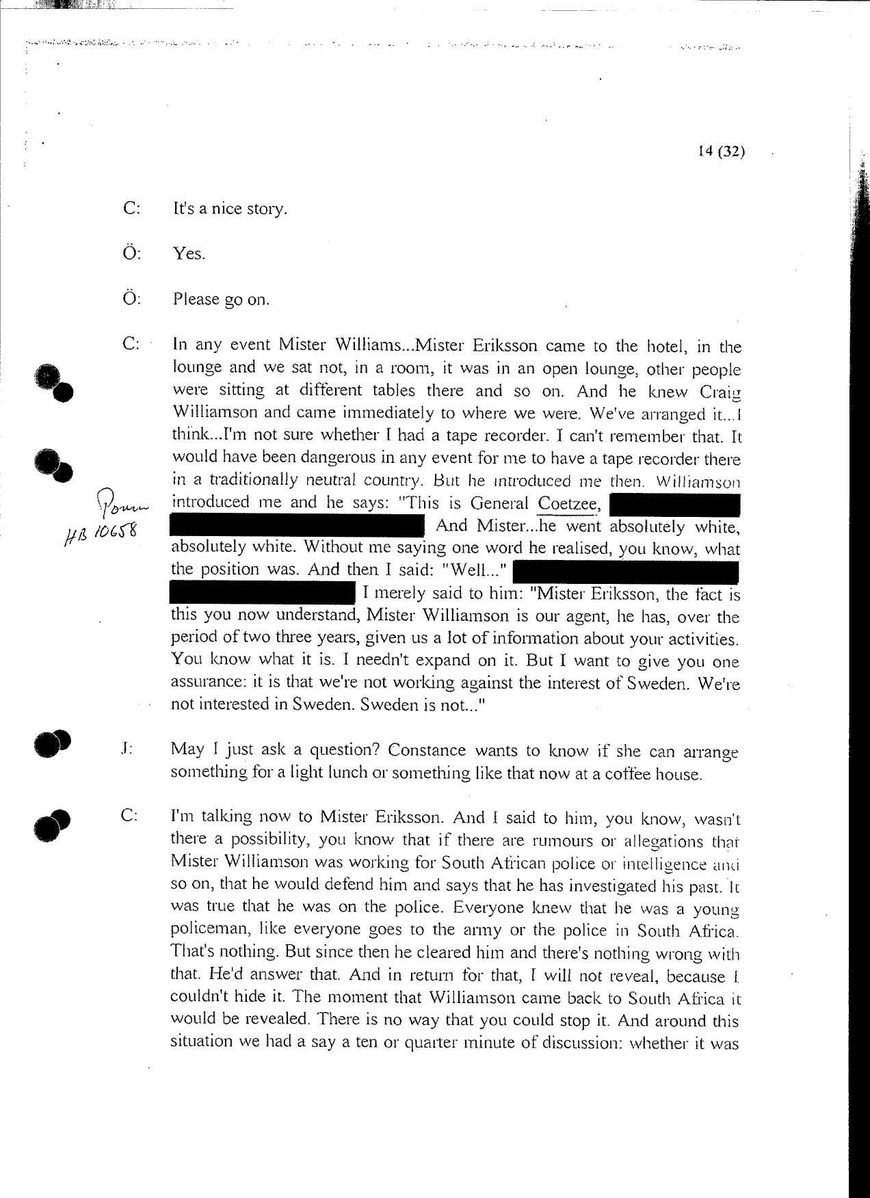
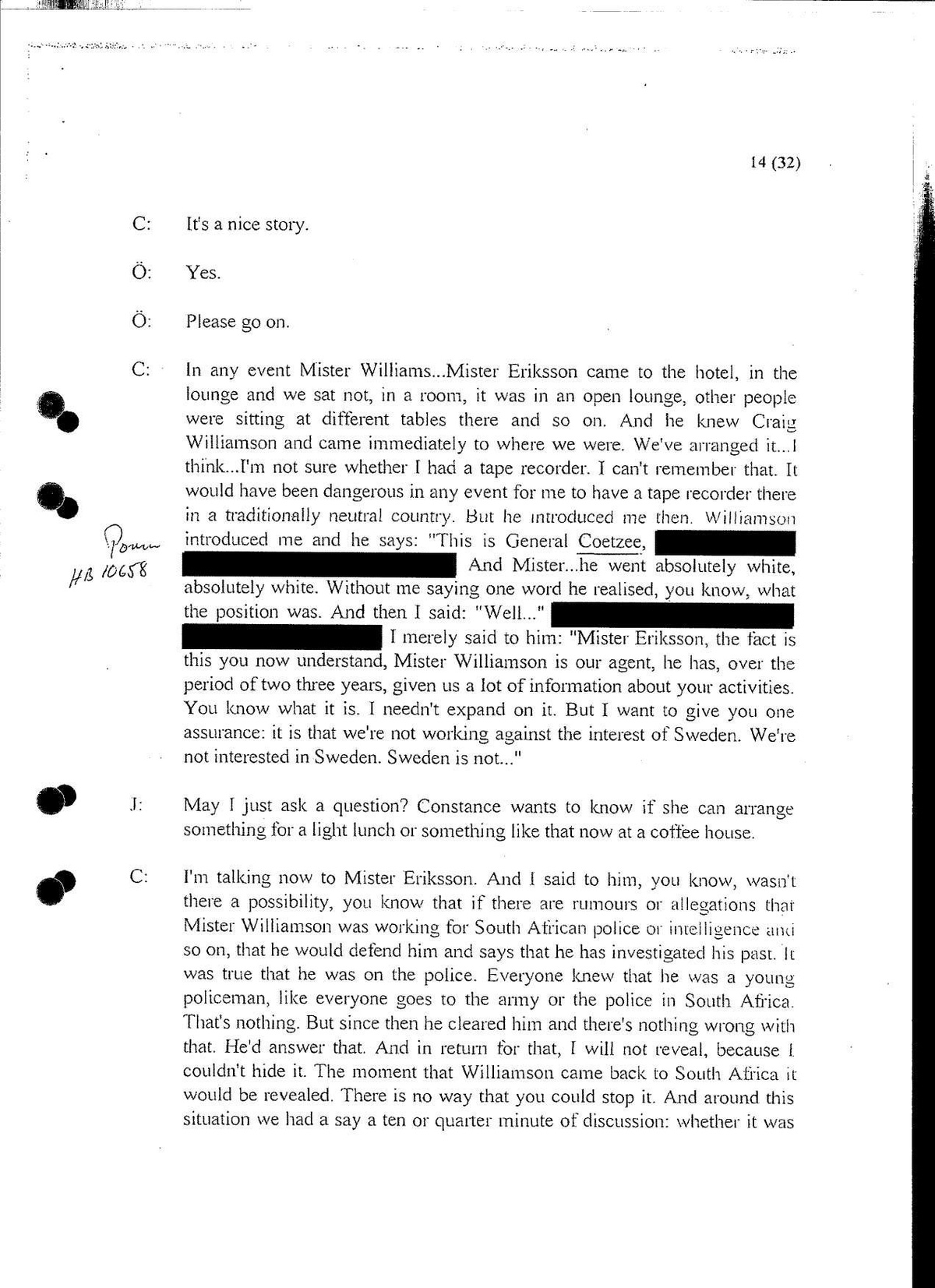
- - 14 (32) -
Johann Coetzee: It's a nice story.
FHL Hans Ölvebro: Yes.
FHL Hans Ölvebro: Please go on.
Johann Coetzee: In any event Mister Williams ... Mister Lars-Gunnar Eriksson came to the hotel, in the lounge and we sat not, in a room, it was in an open lounge, other people were sitting at different tables there and so on. And he knew Craig Williamson and came immediately to where we were.
We've arranged it ... I think ... I'm not sure whether I had a tape recorder. I can't remember that. It would have been dangerous in any event for me to have a tape recorder there in a traditionally neutral country.
But he introduced me then. Craig Williamson introduced me and he says:
- "This is General Johann Coetzee,(Pomn)
- "
And Mister ... he went absolutely white, absolutely white. Without me saying one word he realised, you know, what the position was.
And then I said:
- "Well..."
- "
I merely said to him:
- "Mister Lars-Gunnar Eriksson, the fact is this you now understand, Mister Craig Williamson is our agent, he has, over the period of two three years, given us a lot of information about your activities. You know what it is. I needn't expand on it. But I want to give you one assurance: it is that we're not working against the interest of Sweden. We're not interested in Sweden. Sweden is not ..."
Supt Casper Jonker: May I just ask a question? Constance wants to know if she can arrange something for a light lunch or something like that now at a coffee house.
Johann Coetzee: I'm talking now to Mister Lars-Gunnar Eriksson.
And I said to him, you know, wasn't there a possibility, you know that if there are rumours or allegations that Mister Craig Williamson was working for South African police or intelligence and so on, that he would defend him and says that he has investigated his past.
It was true that he was on the police. Everyone knew that he was a young policeman, like everyone goes to the army or the police in South Africa. That's nothing.
But since then he cleared him and there's nothing wrong with that. He'd answer that. And in return for that, I will not reveal, because I couldn't hide it.
The moment that Craig Williamson came back to South Africa it would be revealed. There is no way that you could stop it.
And around this situation we had a say a ten or quarter minute of discussion: whether it was
Pomn): HB10658 => HBO10658 (Referens behövs
)
- - 15 (32) -
Johann Coetzee: possible or not.
Now obviously to me it was very very evident that Mister Lars-Gunnar Eriksson knew that as far as he was concerned, he was all ... the game was up. It was evident.
There is no way that his position would be salvaged. There was no way at all. And that either he had to take my offer, keep Craig Williamson in this position and continue as if nothing has happened and so on and ... or he must destroy himself.
So it was unnecessary for me to threaten him. He knew it. He did ask me at one stage what do I think will happen if it becomes known that he had harboured a South African intelligence agent, that he was so naive or so foolish or that he knew it.
He says:
- "That is a possibility Some people will say that I knew it all along. It's a possibility that I was concerned."
And I said to him:
- "Mister Lars-Gunnar Eriksson, you know, the position is you must, you're best equipped to work these things out for yourself. I can't. You know exactly what your background is, who the people are that you are in contact with, what the real situation is.
- You know that you're in contact with the Russians. I told you that. You know that. I don't know why you're in contact, what the real factual situation is there. You must answer these things for yourself.
- And then you must decide. In the meantime you must give me a period, I don't want you to go rush out here and go to the Swiss police and say:
- "Here is a South African intelligence agent" and I'm arrested here because then in any event the game is up."
He says now all right now he's going to think about it and he's going to consult his wife. That's why I asked you, you know, what has happened to his wife. And he said to me he's in favour of my proposal but he thinks that his wife will not go along with it and he's got to go and confide with her.
And this is how we left one another there. You know we greeted and so on.
And I still I think stayed on a day or so and then I took the train back. I think the train was on back.
And I went to England. And it was three or four days after that meeting that suddenly appeared an article in the newspaper to say that Mister Lars-Gunnar Eriksson ... well I withdrew at that stage.
I also withdrew Craig Williamson as a safety step, and his wife. I withdrew them to ... I think it was to France, I'm not sure. To France or Belgium or Holland or one of those countries.
And I was already as I say I was in England on my way back. It was ... it must be three days subsequent to the meeting, that suddenly one evening a newsflash on television that Mister Lars-Gunnar Eriksson has made a statement to the effect that he's been threatened in Switzerland and you know it appeared now that Mister Craig Williamson that had worked for him, was working for South Africa: South African security.
And Craig Williamson joined me ... yeah it was Belgium. we were ... he and his wife was in Belgium. And they flew back to England and we came back to South
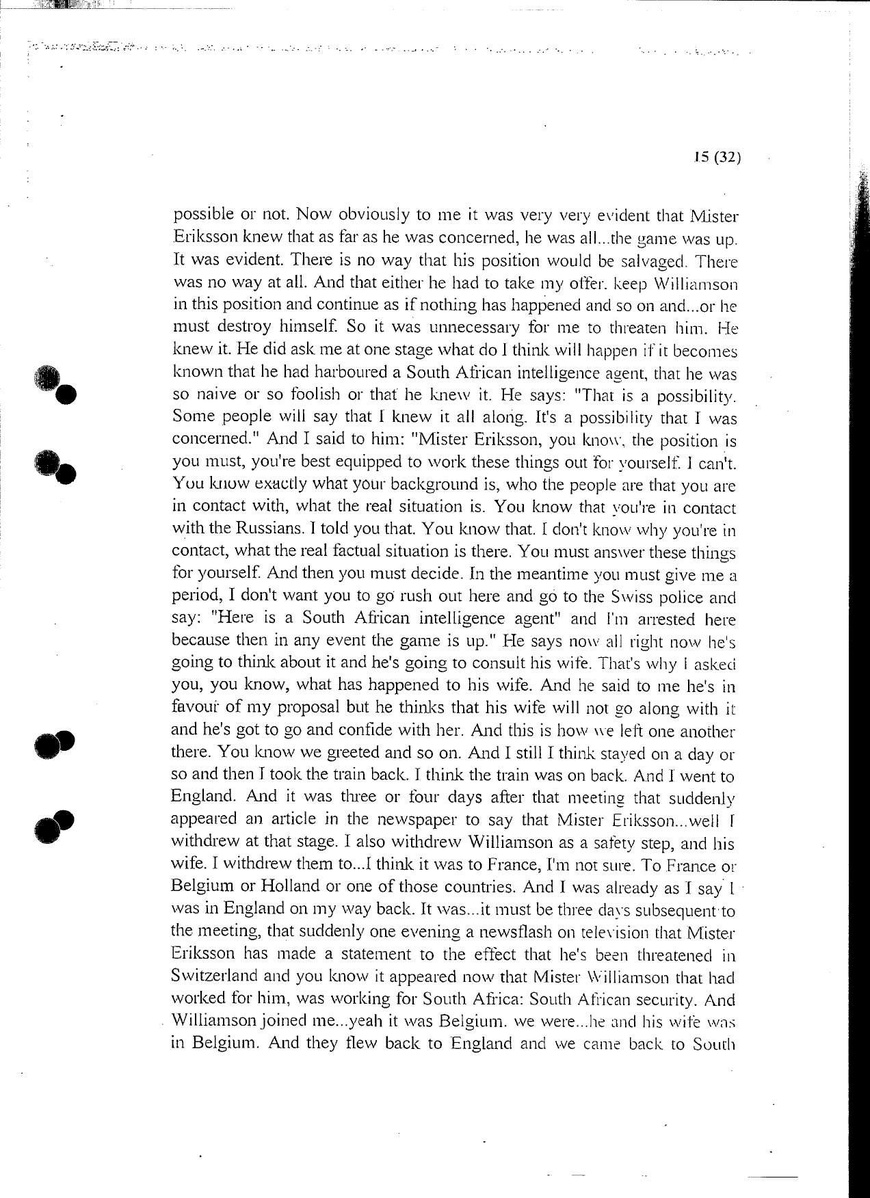
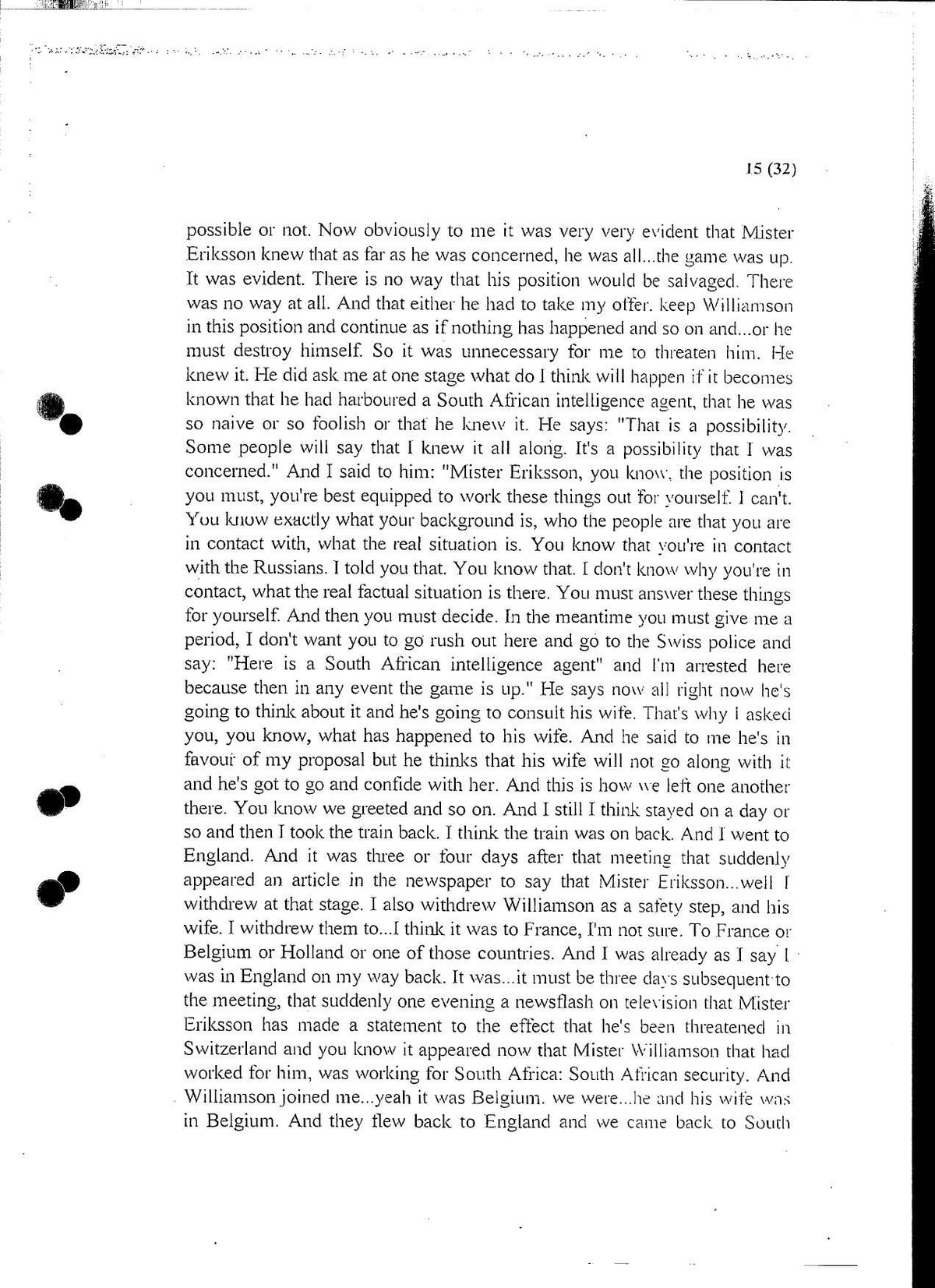
- - 15 (32) -
Johann Coetzee: possible or not.
Now obviously to me it was very very evident that Mister Lars-Gunnar Eriksson knew that as far as he was concerned, he was all ... the game was up. It was evident.
There is no way that his position would be salvaged. There was no way at all. And that either he had to take my offer, keep Craig Williamson in this position and continue as if nothing has happened and so on and ... or he must destroy himself.
So it was unnecessary for me to threaten him. He knew it. He did ask me at one stage what do I think will happen if it becomes known that he had harboured a South African intelligence agent, that he was so naive or so foolish or that he knew it.
He says:
- "That is a possibility Some people will say that I knew it all along. It's a possibility that I was concerned."
And I said to him:
- "Mister Lars-Gunnar Eriksson, you know, the position is you must, you're best equipped to work these things out for yourself. I can't. You know exactly what your background is, who the people are that you are in contact with, what the real situation is.
- You know that you're in contact with the Russians. I told you that. You know that. I don't know why you're in contact, what the real factual situation is there. You must answer these things for yourself.
- And then you must decide. In the meantime you must give me a period, I don't want you to go rush out here and go to the Swiss police and say:
- "Here is a South African intelligence agent" and I'm arrested here because then in any event the game is up."
He says now all right now he's going to think about it and he's going to consult his wife. That's why I asked you, you know, what has happened to his wife. And he said to me he's in favour of my proposal but he thinks that his wife will not go along with it and he's got to go and confide with her.
And this is how we left one another there. You know we greeted and so on.
And I still I think stayed on a day or so and then I took the train back. I think the train was on back.
And I went to England. And it was three or four days after that meeting that suddenly appeared an article in the newspaper to say that Mister Lars-Gunnar Eriksson ... well I withdrew at that stage.
I also withdrew Craig Williamson as a safety step, and his wife. I withdrew them to ... I think it was to France, I'm not sure. To France or Belgium or Holland or one of those countries.
And I was already as I say I was in England on my way back. It was ... it must be three days subsequent to the meeting, that suddenly one evening a newsflash on television that Mister Lars-Gunnar Eriksson has made a statement to the effect that he's been threatened in Switzerland and you know it appeared now that Mister Craig Williamson that had worked for him, was working for South Africa: South African security.
And Craig Williamson joined me ... yeah it was Belgium. we were ... he and his wife was in Belgium. And they flew back to England and we came back to South
- - 16 (32) -
Johann Coetzee: Africa.
Now this is the last time I that I've seen or heard of Mister ... the day that I left that hotel on the (obegripliga ord).
Now this was all in the press now in South Africa, you know everyone knew about Craig Williamson, he was there and came back and so on and so on and so on.
And I had a friend then, not an agent, just a friend who was the editor of the Sunday Times which is our main English-speaking newspaper: Mister Tasius Myberg. And he phoned me and he says:
- "Yeah, this is a big story."
And I said:
- "Well, what do you want to know about it now?"
He says he's going to detail a journalist by the name of Mister Ken Owen, who afterwards also became the editor of the Sunday Times.
And I said:
- "Well, I'm going to make Mister Craig Williamson available for you and everything, and all the documents that we now brought back to police headquarters."
He can go through all these documents and write whatever he wants to about this whole story. And there appeared a lot of articles about it in the Sunday Times.
Now all right, now we're back in South Africa with Mister Craig Williamson, he is a man that did very well, he's got the expertise, he's got the knowledge, he's been through the whole mill, but now he's out from my command.
Helt stycke maskerat
But Mister Craig Williamson at that stage, now he is now giving lectures. That was his job.
He must now try and ... which he did very effectively. From all the security branches in South Africa, and I think also attended at some stage by agents from other countries, came and they attended the lectures that he worked out.
And as far as I'm concerned, for the rest of the period that I was with security, he was busy with this work. With this work and trying to work out, there's some agent that he still had.
Supt Jonker:
Personer omnämnda:
HBJ 17837 (Förhör 1996-10-18 med Craig Williamson)
HBJ 17861 => HBL17861 (Förhör av Carl Edwards)
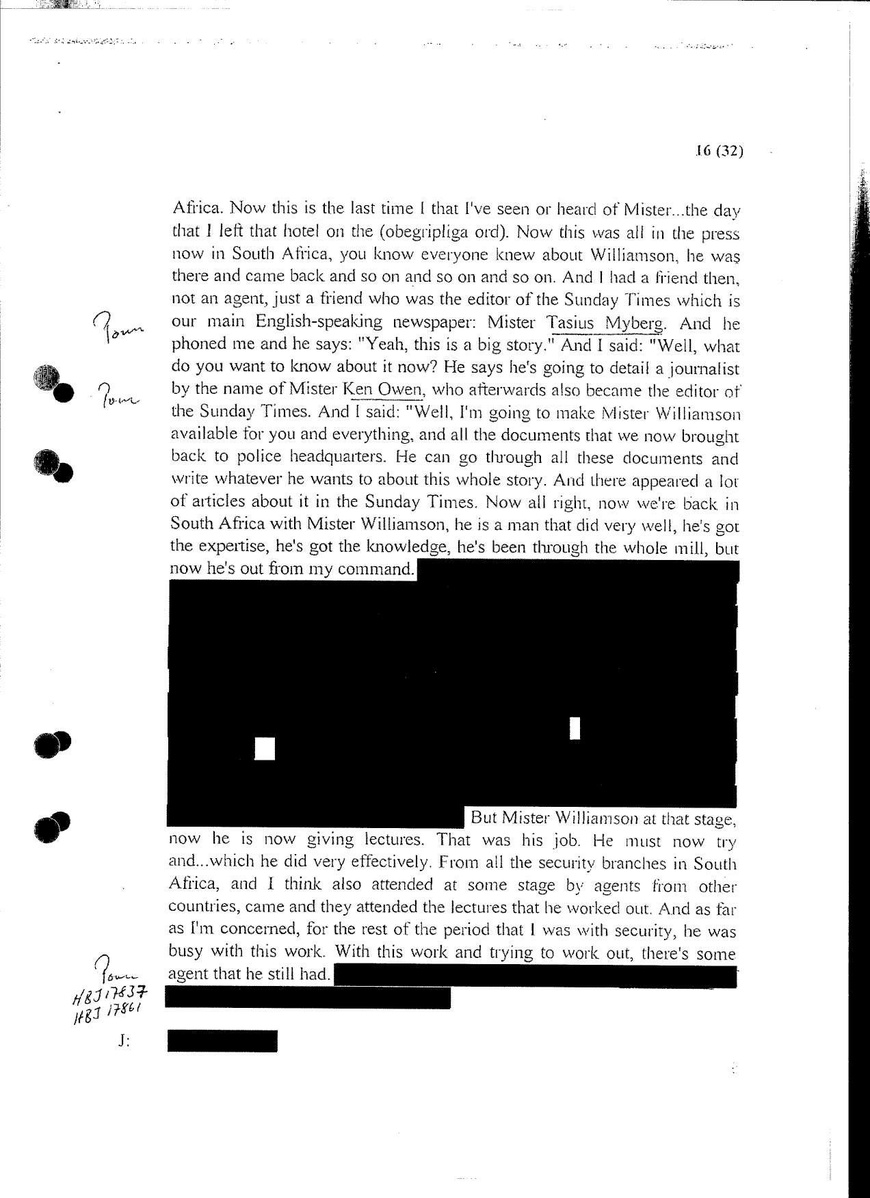
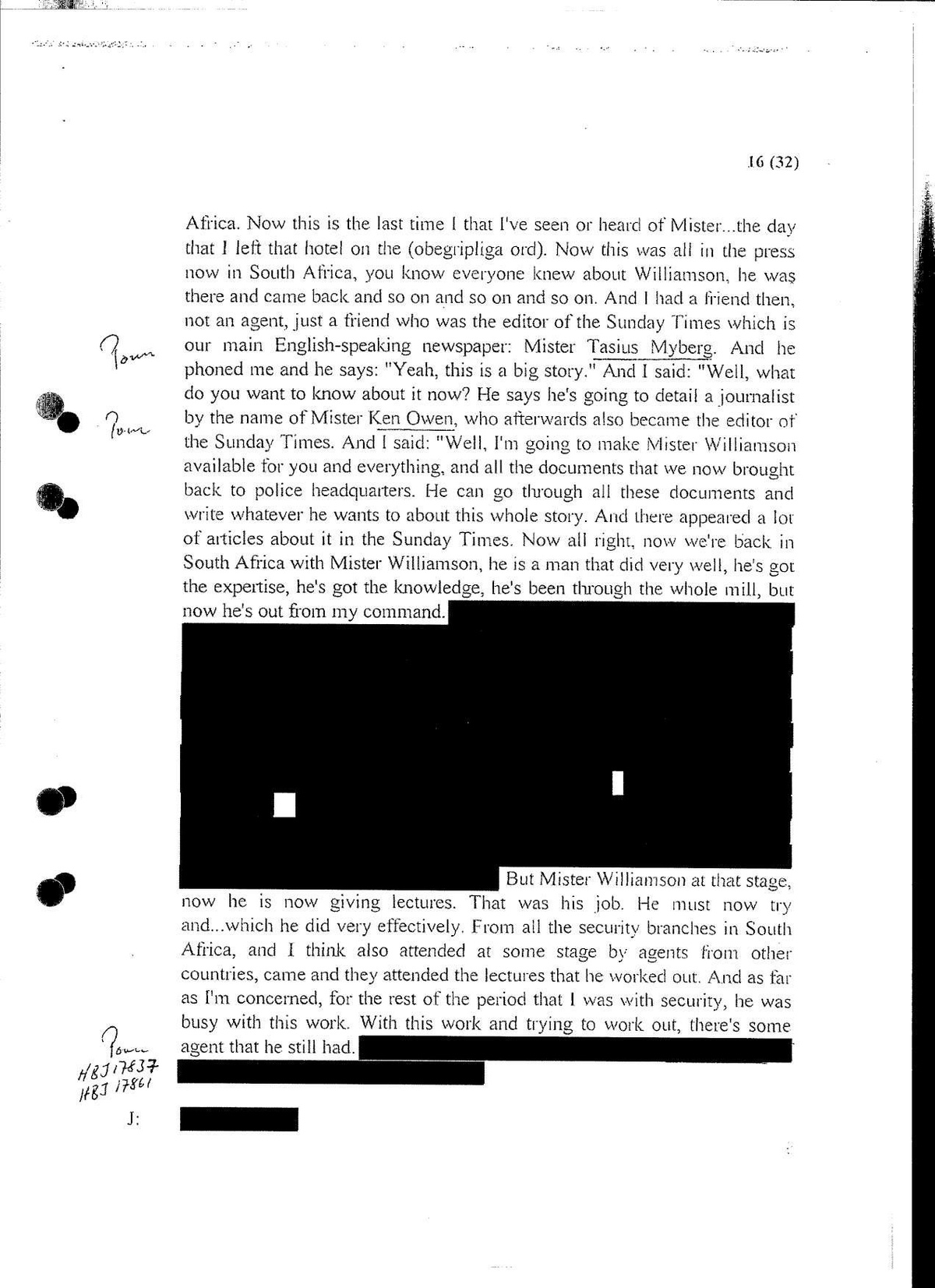
- - 16 (32) -
Johann Coetzee: Africa.
Now this is the last time I that I've seen or heard of Mister ... the day that I left that hotel on the (obegripliga ord).
Now this was all in the press now in South Africa, you know everyone knew about Craig Williamson, he was there and came back and so on and so on and so on.
And I had a friend then, not an agent, just a friend who was the editor of the Sunday Times which is our main English-speaking newspaper: Mister Tasius Myberg. And he phoned me and he says:
- "Yeah, this is a big story."
And I said:
- "Well, what do you want to know about it now?"
He says he's going to detail a journalist by the name of Mister Ken Owen, who afterwards also became the editor of the Sunday Times.
And I said:
- "Well, I'm going to make Mister Craig Williamson available for you and everything, and all the documents that we now brought back to police headquarters."
He can go through all these documents and write whatever he wants to about this whole story. And there appeared a lot of articles about it in the Sunday Times.
Now all right, now we're back in South Africa with Mister Craig Williamson, he is a man that did very well, he's got the expertise, he's got the knowledge, he's been through the whole mill, but now he's out from my command.
Helt stycke maskerat
But Mister Craig Williamson at that stage, now he is now giving lectures. That was his job.
He must now try and ... which he did very effectively. From all the security branches in South Africa, and I think also attended at some stage by agents from other countries, came and they attended the lectures that he worked out.
And as far as I'm concerned, for the rest of the period that I was with security, he was busy with this work. With this work and trying to work out, there's some agent that he still had.
Supt Jonker:
Personer omnämnda:
HBJ 17837 (Förhör 1996-10-18 med Craig Williamson)
HBJ 17861 => HBL17861 (Förhör av Carl Edwards)
- - 17 (32) -
Johann Coetzee: Helt stycke maskerat
FHL Hans Ölvebro:
Johann Coetzee:
Supt Jonker:
FHL Hans Ölvebro:
Johann Coetzee: Helt stycke maskerat
FHL Hans Ölvebro:
Johann Coetzee: Helt stycke maskerat
FHL Hans Ölvebro: It was in the middle of the...?
- - 17 (32) -
Johann Coetzee: Helt stycke maskerat
FHL Hans Ölvebro:
Johann Coetzee:
Supt Jonker:
FHL Hans Ölvebro:
Johann Coetzee: Helt stycke maskerat
FHL Hans Ölvebro:
Johann Coetzee: Helt stycke maskerat
FHL Hans Ölvebro: It was in the middle of the...?
- - 18 (32) -
Johann Coetzee: 1990 ... 1980 ... 1993.
FHL Hans Ölvebro: 1983 yes.
Johann Coetzee:
You're six (6) months in Cape Town, where Parliament is sitting, and six (6) months in Pretoria.
And I mean even though you liked people or they were good policemen or bad policemen, you haven't got the time at all to be in contact with them.
In 1985, I remember that you know he applied for his discharge from the police.
I think it must have been. I don't know exactly, one day from about half of 1985 towards the end he applied and so on.
And I met him there, you know the security branch headquarters is next to police headquarters and sometimes you meet people in the alleys and I says:
- "But Craig Williamson you know you've got a good career, you're a major, why do you want to leave now?"
I must say this though, that Craig Williamson was not in the police for money, money was never an issue with him.
He comes from a rich family. He's a rich man in his own right, so one would expect that at some stage a man like that would not remain in a job for a pension and so on, but I said:
- "Well, you're a major already, why do you want to leave?"
Now he told me that he was going into business. He was going to be a businessman.
I said:
- "All right".
And so he left the police.
The first time that I again heard about Mister Craig Williamson was when ... now I must tell you that I left in ... the police as I've said effectively end of 1986, effectively, although I went to parliament in the beginning of 1987, but then parliament was sitting and when I came back, it was just saying good bye: different parties all over the country and I'm gone.
So it must have been 1987, late in 1987 or 1988. The police still invited me Santon City, it was a very big function, invited me and my wife.
Very very big occasion: police, all the generals were there and so on and so on. I was with Foreign Affairs now at this stage.
And then he came as we went into the foyer, he came and he had two gentlemen with him. And he said:
- "Hello, General, can I introduce my friends?"
And they were Portuguese people as far as I'm concerned. And then my wife still said:
- "They must be selling prawns or something. They must be in the prawn business."
This is the last time that I saw Mister Craig Williamson. Now I want to add this, Sir
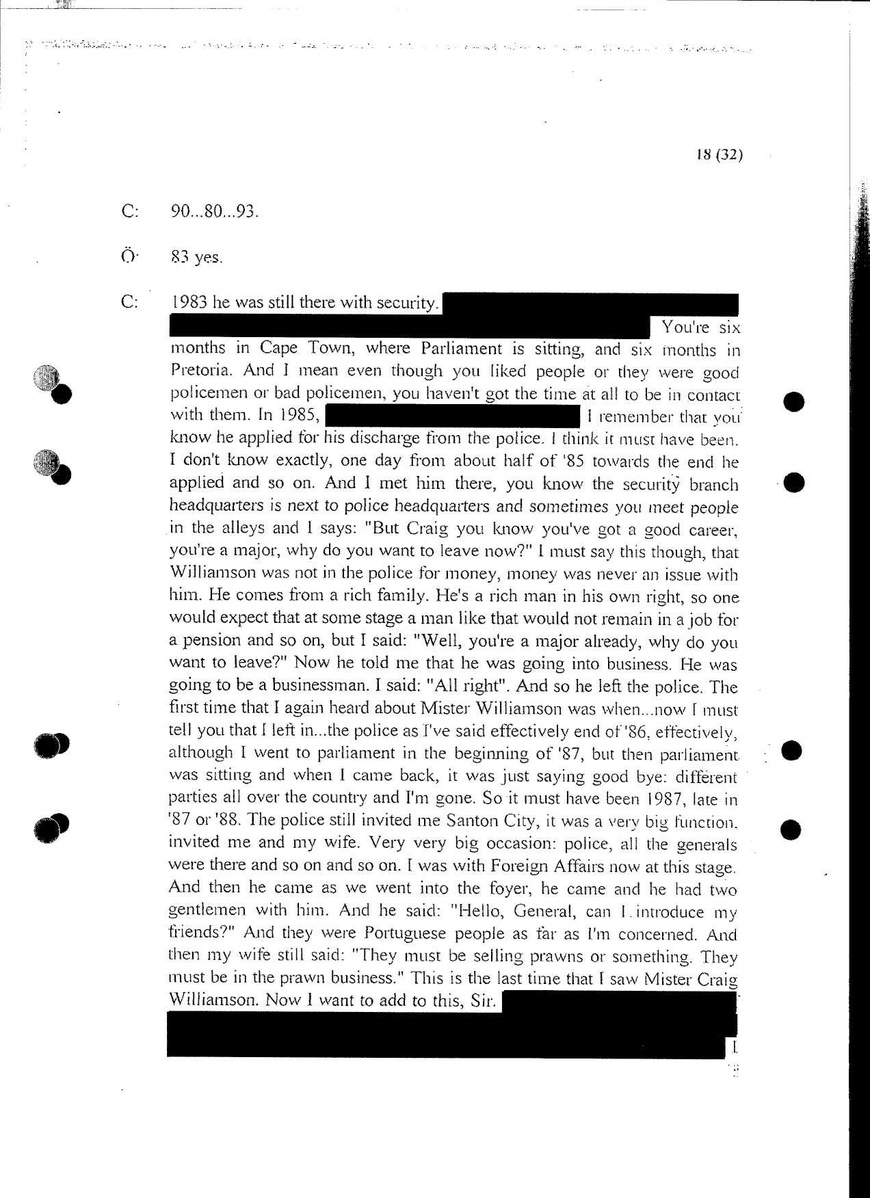
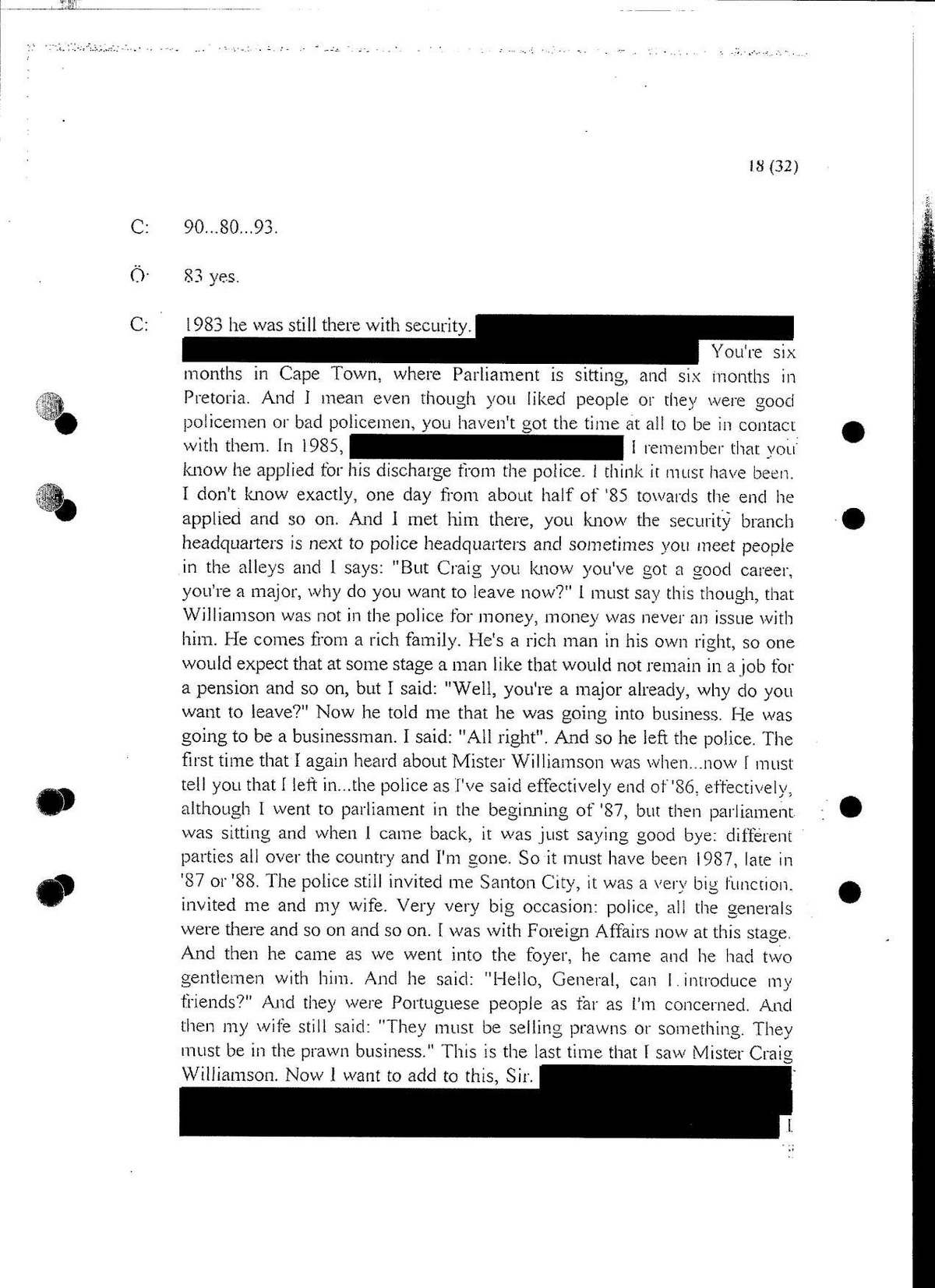
- - 18 (32) -
Johann Coetzee: 1990 ... 1980 ... 1993.
FHL Hans Ölvebro: 1983 yes.
Johann Coetzee:
You're six (6) months in Cape Town, where Parliament is sitting, and six (6) months in Pretoria.
And I mean even though you liked people or they were good policemen or bad policemen, you haven't got the time at all to be in contact with them.
In 1985, I remember that you know he applied for his discharge from the police.
I think it must have been. I don't know exactly, one day from about half of 1985 towards the end he applied and so on.
And I met him there, you know the security branch headquarters is next to police headquarters and sometimes you meet people in the alleys and I says:
- "But Craig Williamson you know you've got a good career, you're a major, why do you want to leave now?"
I must say this though, that Craig Williamson was not in the police for money, money was never an issue with him.
He comes from a rich family. He's a rich man in his own right, so one would expect that at some stage a man like that would not remain in a job for a pension and so on, but I said:
- "Well, you're a major already, why do you want to leave?"
Now he told me that he was going into business. He was going to be a businessman.
I said:
- "All right".
And so he left the police.
The first time that I again heard about Mister Craig Williamson was when ... now I must tell you that I left in ... the police as I've said effectively end of 1986, effectively, although I went to parliament in the beginning of 1987, but then parliament was sitting and when I came back, it was just saying good bye: different parties all over the country and I'm gone.
So it must have been 1987, late in 1987 or 1988. The police still invited me Santon City, it was a very big function, invited me and my wife.
Very very big occasion: police, all the generals were there and so on and so on. I was with Foreign Affairs now at this stage.
And then he came as we went into the foyer, he came and he had two gentlemen with him. And he said:
- "Hello, General, can I introduce my friends?"
And they were Portuguese people as far as I'm concerned. And then my wife still said:
- "They must be selling prawns or something. They must be in the prawn business."
This is the last time that I saw Mister Craig Williamson. Now I want to add this, Sir
- - 19 (32) -
Johann Coetzee: want to tell you that Sweden's name was never ever mentioned there in my ... listen, the minutes, I suppose one can get the minutes.
They must be in the archives. The death of this particular gentleman was never mentioned. Not one senior minister of foreign affairs or the then state president or someone said:
- "Ah there's now a big enemy of South Africa gone."
Whether or not, no-one took any notice of it.
That's why I said I'd be very very surprised, very surprised, you know if South Africa ... I mean we had big enemies there: Mister Fidel Castro.
I could understand if someone ... they were fighting us, we were losing men in Namibia. There was a war on, we were fighting against the Cubans in Angola and so on. If someone had tried to do that, but Mister Parmer... Palmer...
FHL Hans Ölvebro: Olof Palme.
Johann Coetzee: Olof Palme. I mean I don't even know. I don't know. But I've asked myself already: did Mister Lars-Gunnar Eriksson and Mister Olof Palme ... were they friends?
FHL Hans Ölvebro: Yeah, I think so.
Johann Coetzee: Were they ...?
FHL Hans Ölvebro: Not friends, but they knew one another, yes.
Johann Coetzee: They knew one another. Because in the reports of Craig Williamson, I can't to ... take up to you and say:
- "Listen there's never ever any mention of Mister Olof Palme."
You know I can't do that. Obviously I mean there were so thousands of names that it's impossible.
In the process of trying to find out where does this money come from, because as I say we suspected at some stage: either it was a scam by someone else, or someone else was also working, also using this whole thing the same way that we're doing it, or we thought:
- perhaps Mister Lars-Gunnar Eriksson was Swedish Intelligence.
That's not impossible. Perhaps he was. How would we know? You know, he knew everyone. He was communicating with people in his room, he was going to the ... he and I think he and this Russian, Craig Williamson will tell you, I think they were keen on Helt stycke maskerat
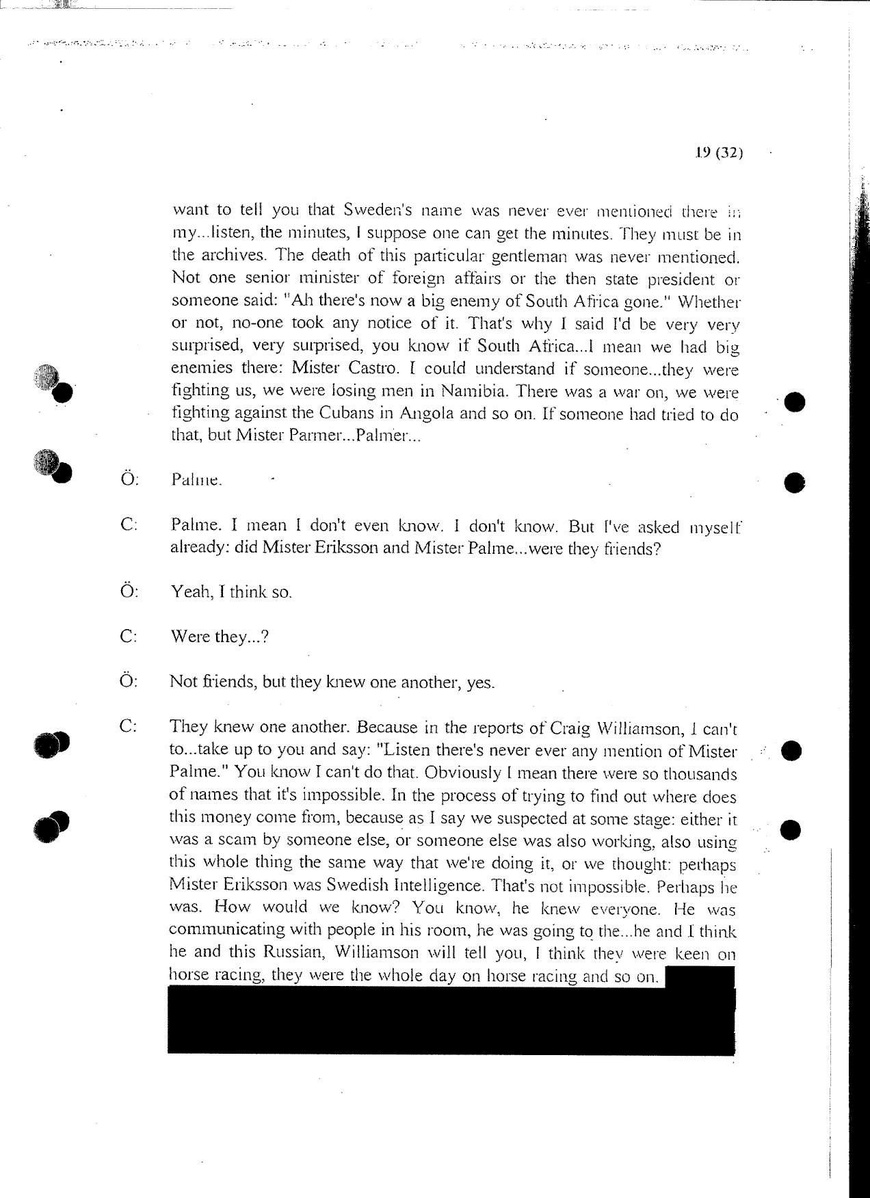
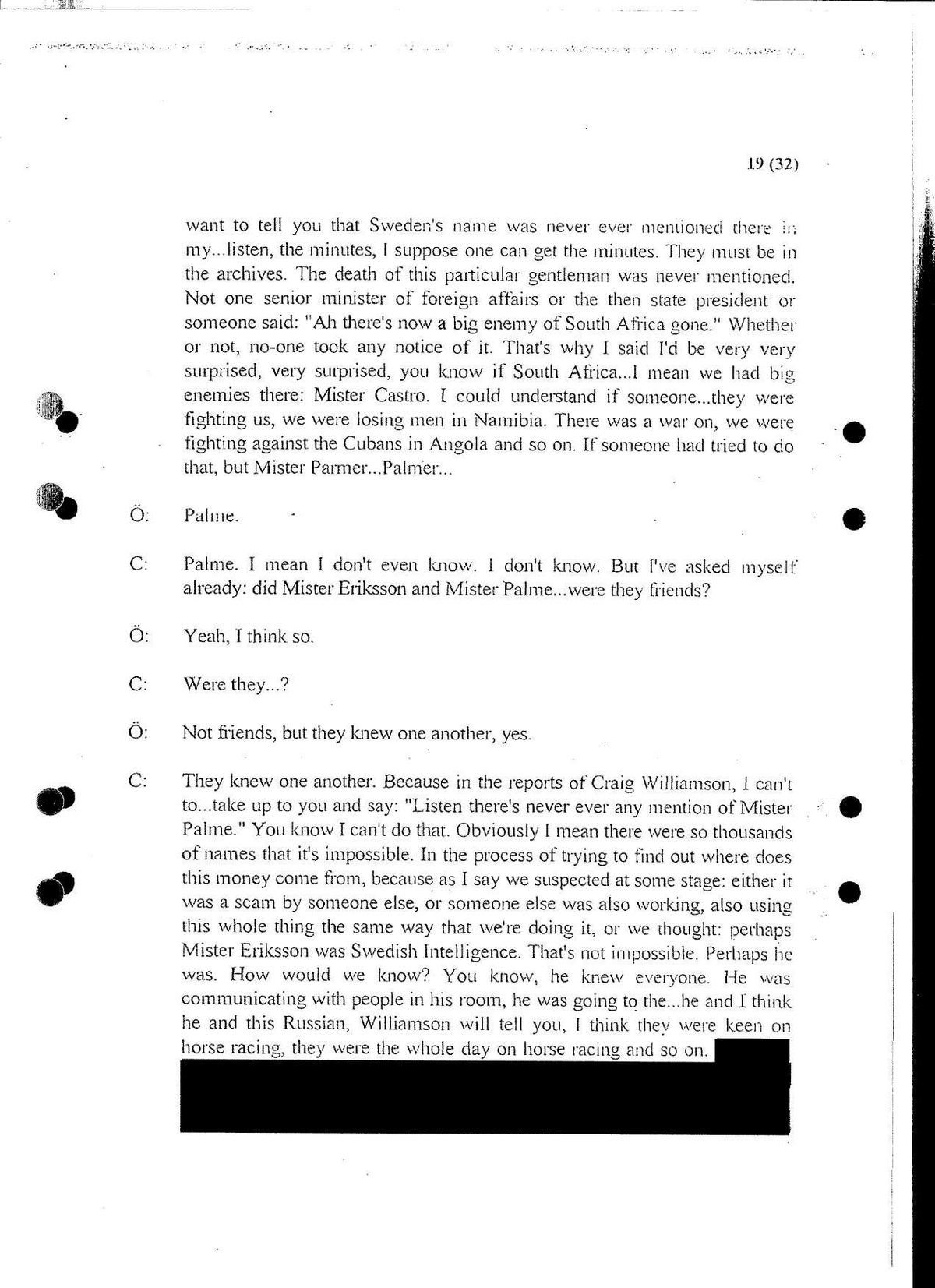
- - 19 (32) -
Johann Coetzee: want to tell you that Sweden's name was never ever mentioned there in my ... listen, the minutes, I suppose one can get the minutes.
They must be in the archives. The death of this particular gentleman was never mentioned. Not one senior minister of foreign affairs or the then state president or someone said:
- "Ah there's now a big enemy of South Africa gone."
Whether or not, no-one took any notice of it.
That's why I said I'd be very very surprised, very surprised, you know if South Africa ... I mean we had big enemies there: Mister Fidel Castro.
I could understand if someone ... they were fighting us, we were losing men in Namibia. There was a war on, we were fighting against the Cubans in Angola and so on. If someone had tried to do that, but Mister Parmer... Palmer...
FHL Hans Ölvebro: Olof Palme.
Johann Coetzee: Olof Palme. I mean I don't even know. I don't know. But I've asked myself already: did Mister Lars-Gunnar Eriksson and Mister Olof Palme ... were they friends?
FHL Hans Ölvebro: Yeah, I think so.
Johann Coetzee: Were they ...?
FHL Hans Ölvebro: Not friends, but they knew one another, yes.
Johann Coetzee: They knew one another. Because in the reports of Craig Williamson, I can't to ... take up to you and say:
- "Listen there's never ever any mention of Mister Olof Palme."
You know I can't do that. Obviously I mean there were so thousands of names that it's impossible.
In the process of trying to find out where does this money come from, because as I say we suspected at some stage: either it was a scam by someone else, or someone else was also working, also using this whole thing the same way that we're doing it, or we thought:
- perhaps Mister Lars-Gunnar Eriksson was Swedish Intelligence.
That's not impossible. Perhaps he was. How would we know? You know, he knew everyone. He was communicating with people in his room, he was going to the ... he and I think he and this Russian, Craig Williamson will tell you, I think they were keen on Helt stycke maskerat
- - 2 (32) -
Johann Coetzee: Yes.
Hans Ölvebro: Your own career.
Johann Coetzee: My own career.
Hans Ölvebro: But you don't have to start from the beginning.
Johann Coetzee: What, more or less the period that I became associated with Mister Craig Williamson?
Hans Ölvebro: Yes, more or less.
Johann Coetzee: My association with Mister Craig Williamson commenced in mid, the mid...the middle of the 1970's, more or less that period. He was in the police before, but I didn't know him. He was an ordinary uniformed constable somewhere.
He then resigned, that is when I met him. He had resigned from the police and he was a student at the university of ... the Witwatersrand University at that stage.
Although he was a former policeman he had to resign and he became a student studying at the University of Witwatersrand.
I must say that I knew
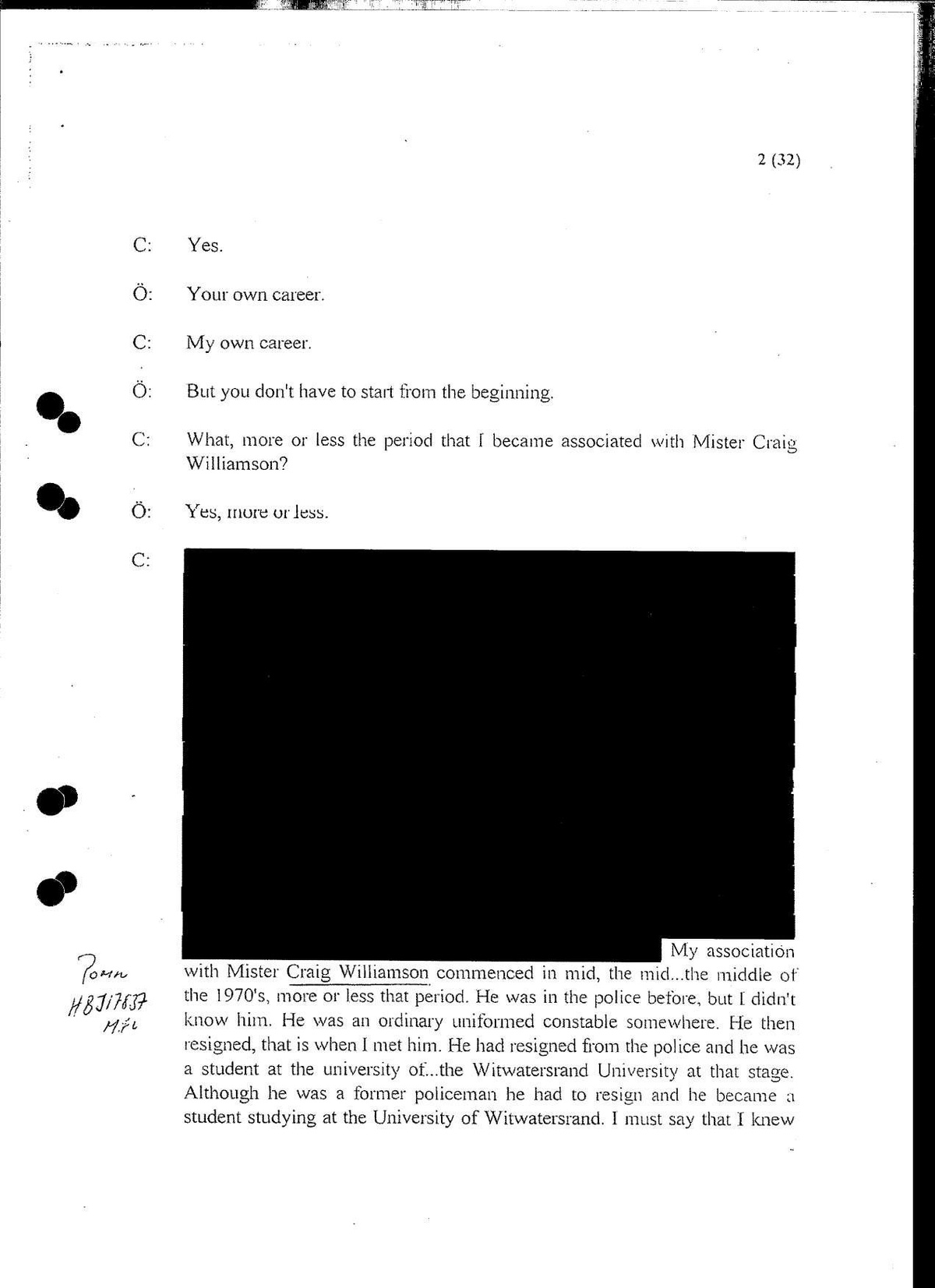
- - 2 (32) -
Johann Coetzee: Yes.
Hans Ölvebro: Your own career.
Johann Coetzee: My own career.
Hans Ölvebro: But you don't have to start from the beginning.
Johann Coetzee: What, more or less the period that I became associated with Mister Craig Williamson?
Hans Ölvebro: Yes, more or less.
Johann Coetzee: My association with Mister Craig Williamson commenced in mid, the mid...the middle of the 1970's, more or less that period. He was in the police before, but I didn't know him. He was an ordinary uniformed constable somewhere.
He then resigned, that is when I met him. He had resigned from the police and he was a student at the university of ... the Witwatersrand University at that stage.
Although he was a former policeman he had to resign and he became a student studying at the University of Witwatersrand.
I must say that I knew
- - 20 (32) -
Johann Coetzee: . He gives you the things that you need.
His desk about South Africa and so on is open to you, I mean so you don't know what else he is doing.
When I spoke to him I hinted that,
- "well, you know, perhaps you should consult your masters. You know what your position is."
And when I went away from him, I distinctly got the impression that he's going to go on, he was prepared to go on with this thing, because he has links somewhere else, you know would be such that he could protect himself.
Apparently it wasn't the case. I don't know. But as i say, that assurance, this prime minister of Sweden's name never cropped up.
I can't say that he didn't say:
- "well the money...this man is..."
Was Mister Olof Palme, was he in politics there, was he in a government position?
FHL Hans Ölvebro: Yeah, he was the prime minister.
Johann Coetzee: In the time that Craig Williamson was working for IUF?
FHL Hans Ölvebro: I think so.
ÅKL Jan Danielsson: No, then he was in opposition between 1976 and 1982. He was in opposition.
Johann Coetzee: Because I remember that you know that in the process of asking Craig Williamson:
- "Where does this money all come from?"
you know, he said it was Danish money, Norwegian money, Finnish money, as far as he could understand, and it was Swedish money.
You know Swedish money meant for ... really meant for upliftment of people and schemes like that.
You know that is what he, Craig Williamson said and that they were in fact not doing what the people that originated the thing were supposed ... that they were supposed to do.
They're misusing this thing on this intelligence and that is why he said he thinks Lars-Gunnar Eriksson is also, you know, working for intelligence, or it's a big scam by the Swedish government to get all this information and so on, but never ever was it told that Lars-Gunnar Eriksson did it.
His boss was Mister Olof Palme. You know, not in the period that I was there. Now as I say, I don't know anything else about it.. You're free to ask me any questions. This is more or less my association with Mister Craig Williamson.
FHL Hans Ölvebro: Well, I have a few questions. You said before we started the tape recorder that you had never been in Sweden, so...
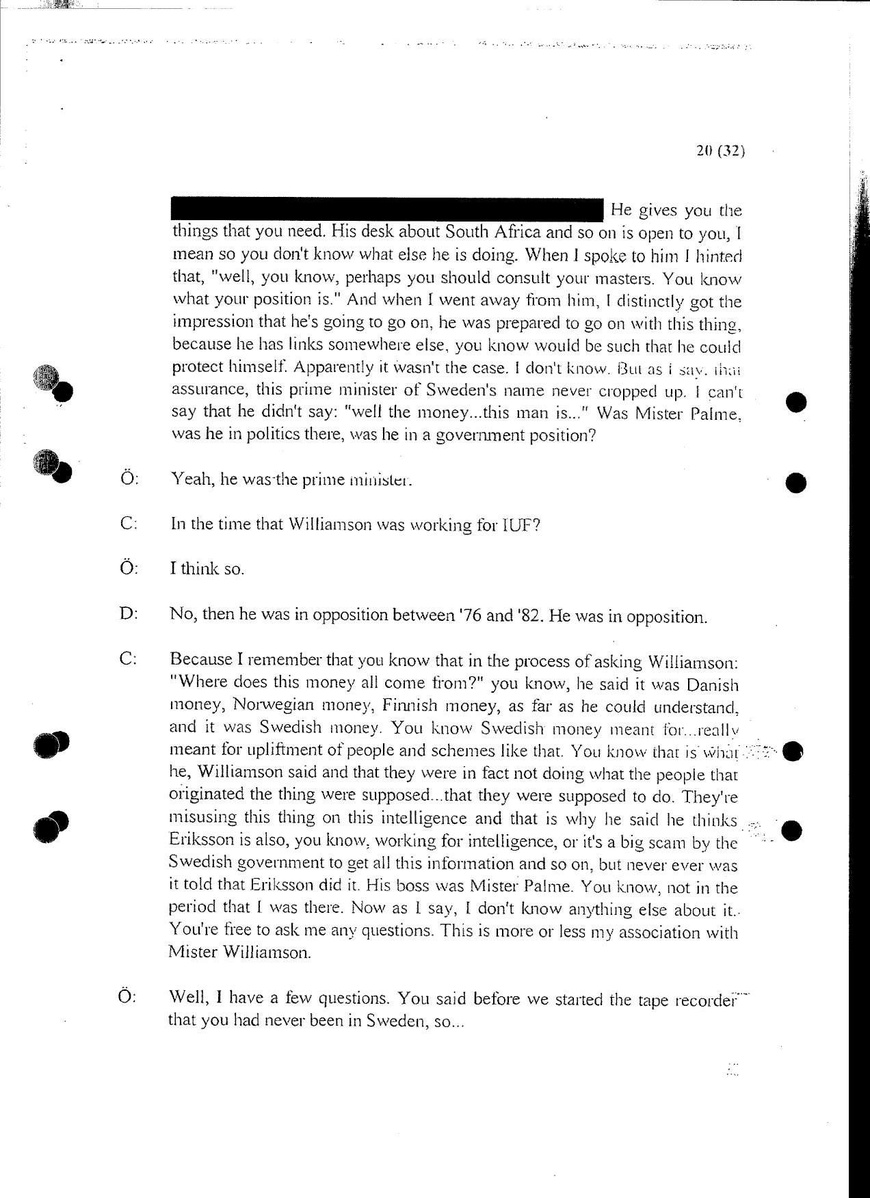
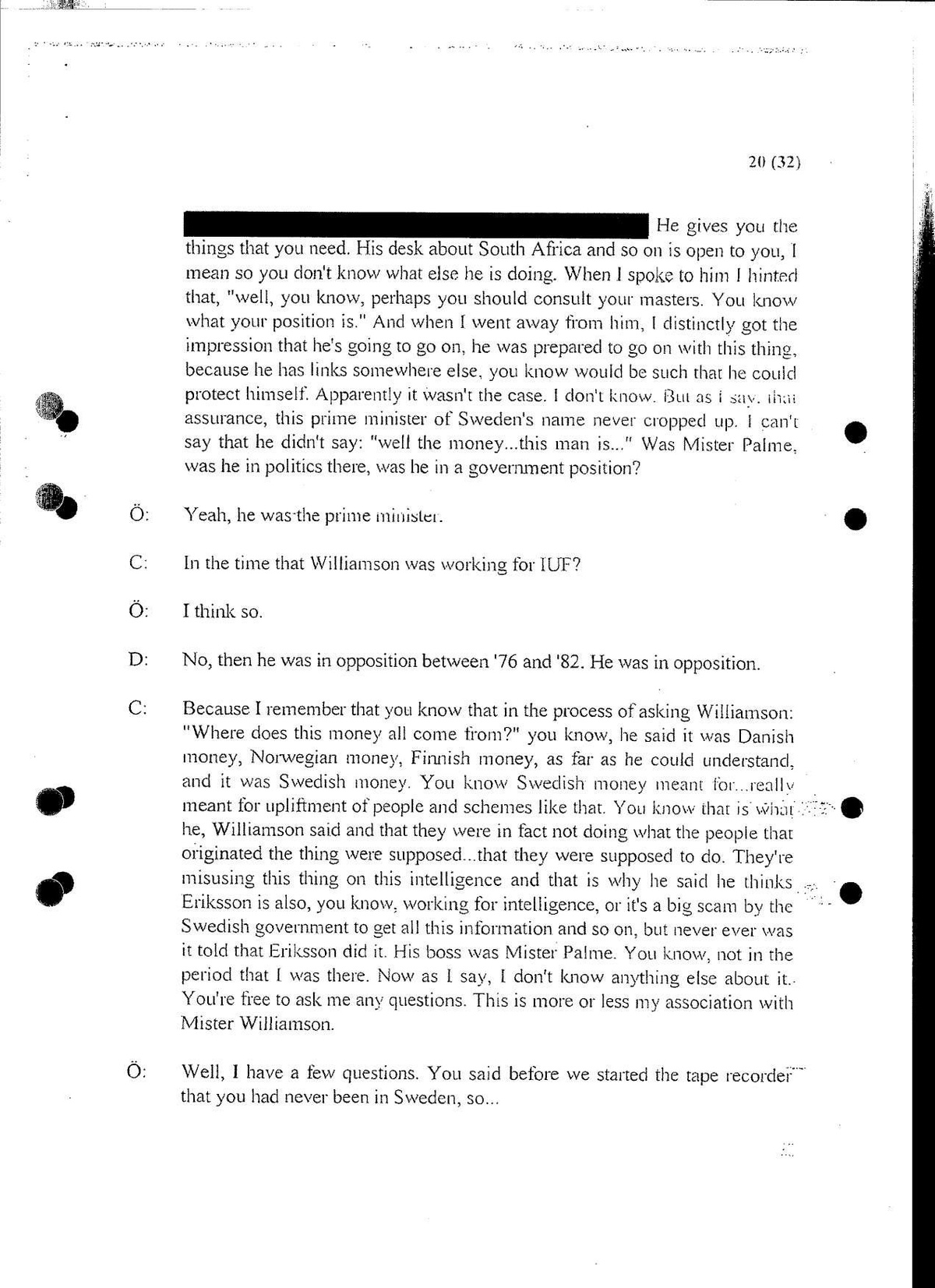
- - 20 (32) -
Johann Coetzee: . He gives you the things that you need.
His desk about South Africa and so on is open to you, I mean so you don't know what else he is doing.
When I spoke to him I hinted that,
- "well, you know, perhaps you should consult your masters. You know what your position is."
And when I went away from him, I distinctly got the impression that he's going to go on, he was prepared to go on with this thing, because he has links somewhere else, you know would be such that he could protect himself.
Apparently it wasn't the case. I don't know. But as i say, that assurance, this prime minister of Sweden's name never cropped up.
I can't say that he didn't say:
- "well the money...this man is..."
Was Mister Olof Palme, was he in politics there, was he in a government position?
FHL Hans Ölvebro: Yeah, he was the prime minister.
Johann Coetzee: In the time that Craig Williamson was working for IUF?
FHL Hans Ölvebro: I think so.
ÅKL Jan Danielsson: No, then he was in opposition between 1976 and 1982. He was in opposition.
Johann Coetzee: Because I remember that you know that in the process of asking Craig Williamson:
- "Where does this money all come from?"
you know, he said it was Danish money, Norwegian money, Finnish money, as far as he could understand, and it was Swedish money.
You know Swedish money meant for ... really meant for upliftment of people and schemes like that.
You know that is what he, Craig Williamson said and that they were in fact not doing what the people that originated the thing were supposed ... that they were supposed to do.
They're misusing this thing on this intelligence and that is why he said he thinks Lars-Gunnar Eriksson is also, you know, working for intelligence, or it's a big scam by the Swedish government to get all this information and so on, but never ever was it told that Lars-Gunnar Eriksson did it.
His boss was Mister Olof Palme. You know, not in the period that I was there. Now as I say, I don't know anything else about it.. You're free to ask me any questions. This is more or less my association with Mister Craig Williamson.
FHL Hans Ölvebro: Well, I have a few questions. You said before we started the tape recorder that you had never been in Sweden, so...
- - 21 (32) -
Johann Coetzee: No, yeah. Never in my whole life been to Sweden.
FHL Hans Ölvebro: No. You haven't been to Denmark?
Johann Coetzee: No. I've been one afternoon: Sunday afternoon the German police drove me through when I was with the German police on a visit, on a bit of a secondment. They said,
- "well I think there's some place that you could just drive through on an afternoon."
FHL Hans Ölvebro: Okay.
Johann Coetzee: And we came back the same day.
FHL Hans Ölvebro: Do you know any Swedish policemen?
Johann Coetzee: Not one. Never met one.
FHL Hans Ölvebro: No. Have you heard about any Swedish policemen who have been in South Africa for training?
Johann Coetzee: No. When I was with the academy here, the police academy, I was on what was termed an international committee to investigate a new type of police service for South Africa, you know which is now in operation.
And I remember that Mister Mufumadi, there was a party in Pretoria and there, was ... I spoke to a lady who was the Swedish ambassador: I think she's ... or she's second in charge there.
And she mentioned that Sweden has also made available in South Africa some Swedish policemen.
But I've met people, but I mean I can't say that he told me he's Swedish or Finnish or Danish and so on. And what I know that we've sent some people to Denmark I think.
FHL Hans Ölvebro: But that...
Johann Coetzee: Didn't we send here this guy?
Supt Jonker: Oh yeah.
Johann Coetzee: While I was here on a non-operation, the Danes offered, but not Sweden as far as I know.
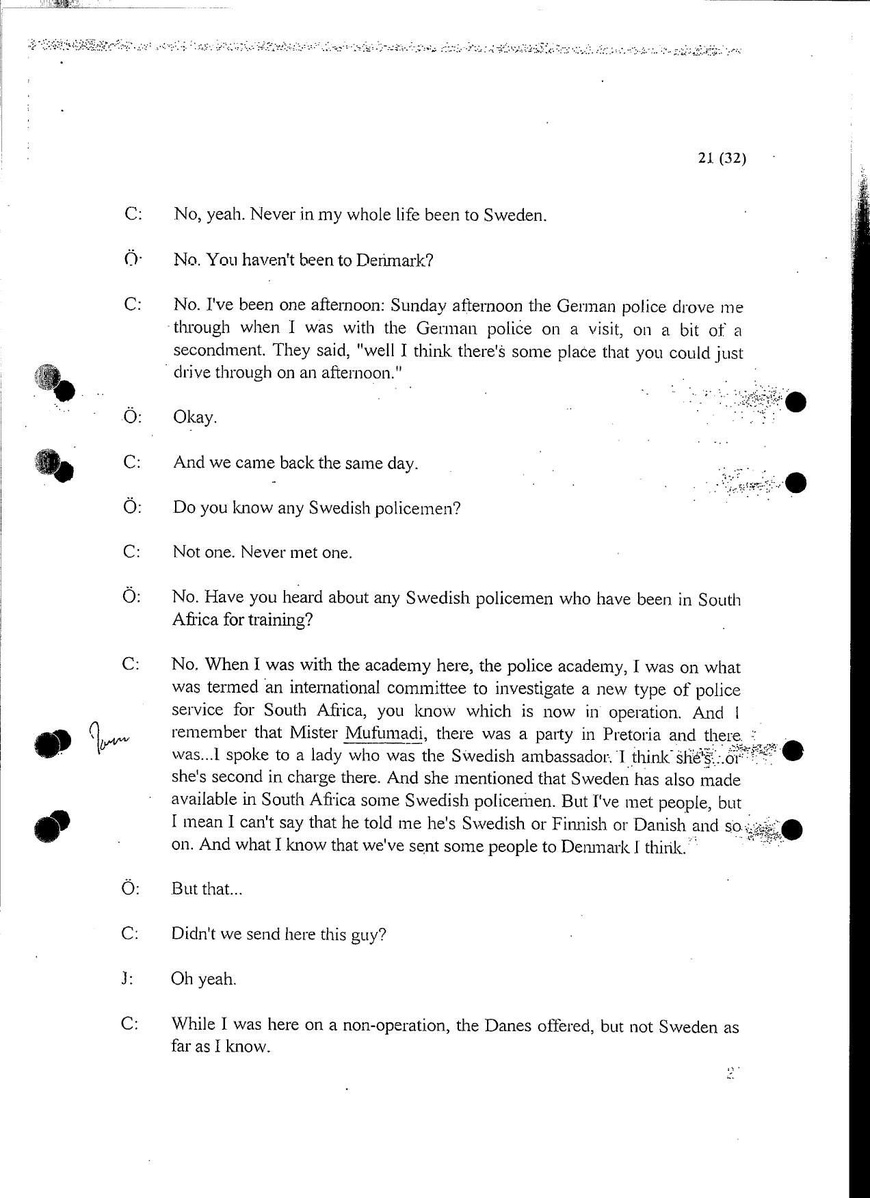
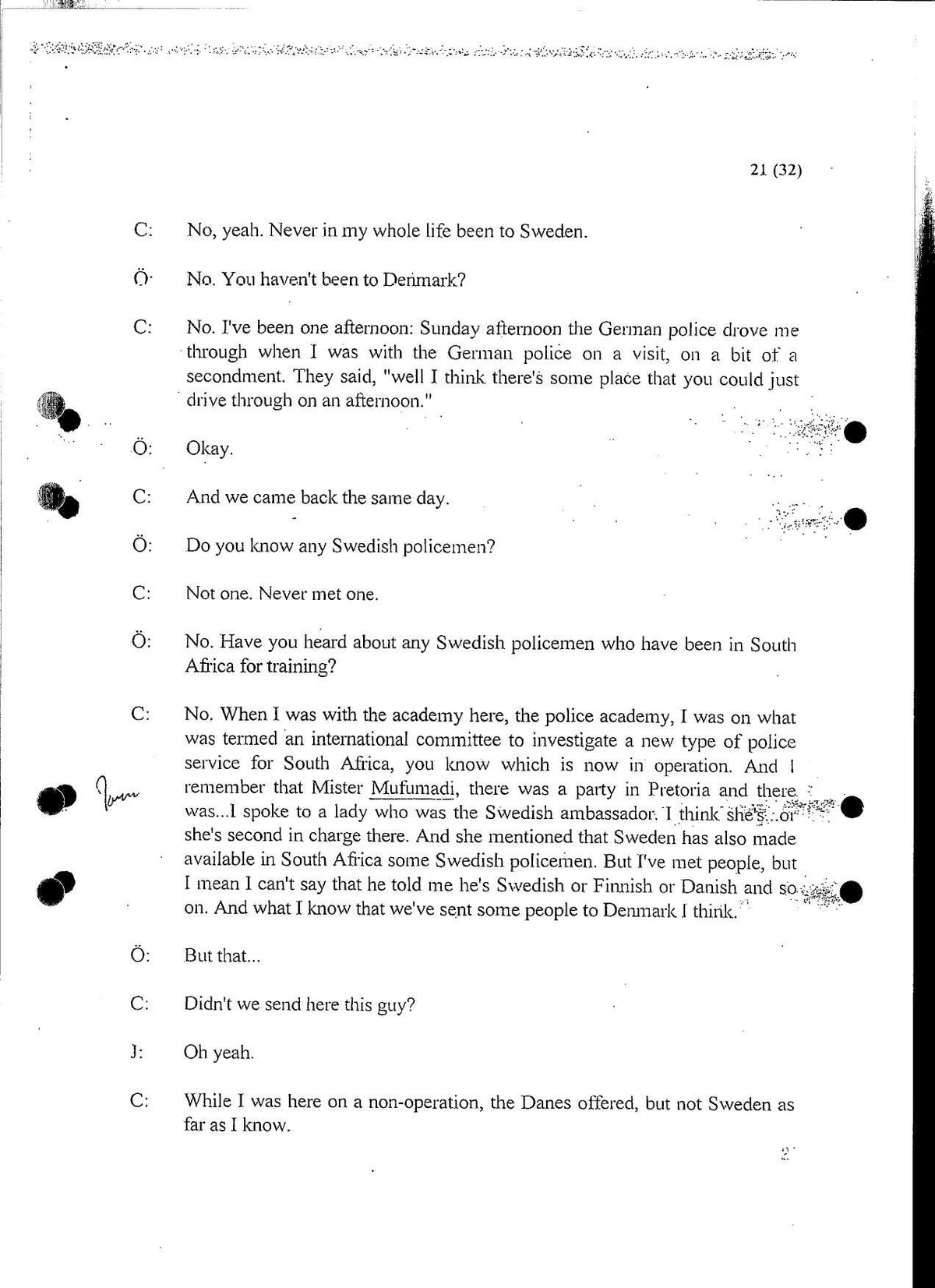
- - 21 (32) -
Johann Coetzee: No, yeah. Never in my whole life been to Sweden.
FHL Hans Ölvebro: No. You haven't been to Denmark?
Johann Coetzee: No. I've been one afternoon: Sunday afternoon the German police drove me through when I was with the German police on a visit, on a bit of a secondment. They said,
- "well I think there's some place that you could just drive through on an afternoon."
FHL Hans Ölvebro: Okay.
Johann Coetzee: And we came back the same day.
FHL Hans Ölvebro: Do you know any Swedish policemen?
Johann Coetzee: Not one. Never met one.
FHL Hans Ölvebro: No. Have you heard about any Swedish policemen who have been in South Africa for training?
Johann Coetzee: No. When I was with the academy here, the police academy, I was on what was termed an international committee to investigate a new type of police service for South Africa, you know which is now in operation.
And I remember that Mister Mufumadi, there was a party in Pretoria and there, was ... I spoke to a lady who was the Swedish ambassador: I think she's ... or she's second in charge there.
And she mentioned that Sweden has also made available in South Africa some Swedish policemen.
But I've met people, but I mean I can't say that he told me he's Swedish or Finnish or Danish and so on. And what I know that we've sent some people to Denmark I think.
FHL Hans Ölvebro: But that...
Johann Coetzee: Didn't we send here this guy?
Supt Jonker: Oh yeah.
Johann Coetzee: While I was here on a non-operation, the Danes offered, but not Sweden as far as I know.
- - 22 (32) -
FHL Hans Ölvebro: But I mean before 1986 when the murder took place.
Nowadays Sweden supplies South Africa with this kind of help of course, but I mean if there had been...if you had heard about a Swedish policeman who came down for training.
Johann Coetzee: No, not one. No. Training here?
FHL Hans Ölvebro: Yes.
Johann Coetzee: No. Never heard of it.
FHL Hans Ölvebro: Never heard of it. When Craig Williamson left the police force, do you think he joined another force in the military intelligence or something?
Johann Coetzee: I've got no factual information about this, but it's always, you know if a good agent leaves, there's always rumours:
- 'Ah, he's been offered a better position', you know.
And now I didn't ask him specifically, because if you leave you leave and that's that.
But I personally thought that it was strange, you know that although he's going into business and so on, perhaps he's, you know he's been offered. It has happened, it's happened very often in South Africa.
As a matter of fact this whole thing, I don't know if you've heard about the organisation in South Africa called ... what is this bureau for? BISKOP? Weermacht se ouers (the army boys). This BSV.
Supt Jonker: Oh yeah. What were they ... Civil Cooperation Bureau.
Johann Coetzee: Civil Cooperation Bureau.
Now this thing was created also I believe at the beginning of 1987 or during 1987.
It was an undercover organisation of military intelligence or the military. I don't know what it's actual position is.
But what they did, they recruited just the branch, a whole branch of the police, a component in Johannesburg. They recruited them in secret.
Afterwards you know these people said
- "We're going to leave now, we're going" and so on and so on and so on.
And afterwards when some of their things were revealed, we learned that these are people that were policemen before, you know.
Because they would probably think 'well this is people with experience, you know of the law, of working under cover and so on.
But it was not security branch people, it was robbery and murder people.
Weren't
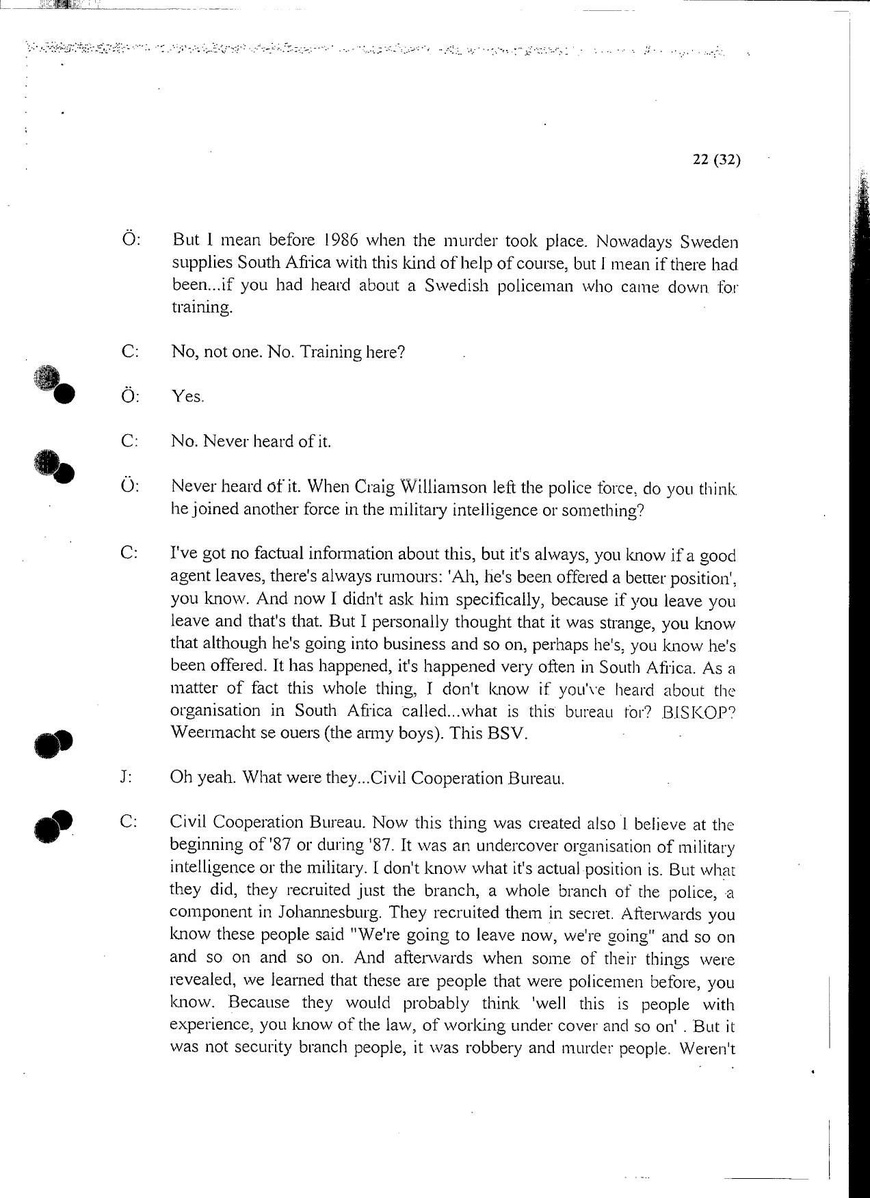
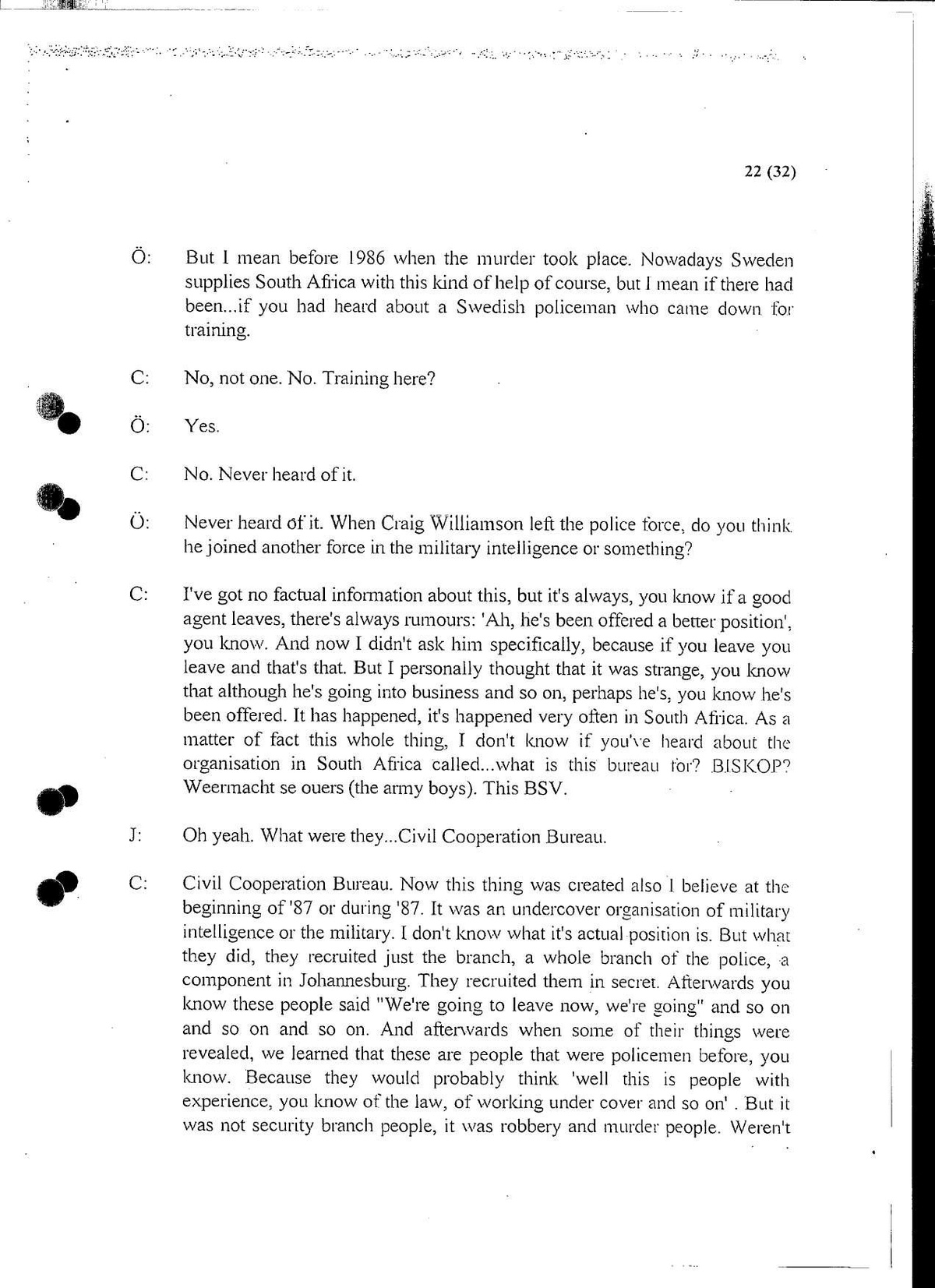
- - 22 (32) -
FHL Hans Ölvebro: But I mean before 1986 when the murder took place.
Nowadays Sweden supplies South Africa with this kind of help of course, but I mean if there had been...if you had heard about a Swedish policeman who came down for training.
Johann Coetzee: No, not one. No. Training here?
FHL Hans Ölvebro: Yes.
Johann Coetzee: No. Never heard of it.
FHL Hans Ölvebro: Never heard of it. When Craig Williamson left the police force, do you think he joined another force in the military intelligence or something?
Johann Coetzee: I've got no factual information about this, but it's always, you know if a good agent leaves, there's always rumours:
- 'Ah, he's been offered a better position', you know.
And now I didn't ask him specifically, because if you leave you leave and that's that.
But I personally thought that it was strange, you know that although he's going into business and so on, perhaps he's, you know he's been offered. It has happened, it's happened very often in South Africa.
As a matter of fact this whole thing, I don't know if you've heard about the organisation in South Africa called ... what is this bureau for? BISKOP? Weermacht se ouers (the army boys). This BSV.
Supt Jonker: Oh yeah. What were they ... Civil Cooperation Bureau.
Johann Coetzee: Civil Cooperation Bureau.
Now this thing was created also I believe at the beginning of 1987 or during 1987.
It was an undercover organisation of military intelligence or the military. I don't know what it's actual position is.
But what they did, they recruited just the branch, a whole branch of the police, a component in Johannesburg. They recruited them in secret.
Afterwards you know these people said
- "We're going to leave now, we're going" and so on and so on and so on.
And afterwards when some of their things were revealed, we learned that these are people that were policemen before, you know.
Because they would probably think 'well this is people with experience, you know of the law, of working under cover and so on.
But it was not security branch people, it was robbery and murder people.
Weren't
- - 23 (32) -
Johann Coetzee: you recruited also? Not? You're not a good policeman I suppose. There they recruited, so it's not strange and there are always allegations, so I mean whether he joined a thing like that, I don't know, and the military, what I want is the military never approached me.
FHL Hans Ölvebro: Okay.
Johann Coetzee: There they never approached me and says:
- "Listen, you want to give a recommendation in secret or confidential?"
They never approached me, so factually I don't know. I saw him once. Since then...
FHL Hans Ölvebro: You don't have any idea who could be his controller at that time?
Johann Coetzee: No, but it won't be difficult to find out who was in charge of military intelligence then.
Supt Jonker: Yeah, of course not.
Johann Coetzee: It would be possible to find out.
FHL Hans Ölvebro: Okay. Do you know any of those alias Mister Craig Williamson used when he was in Europe? Can you tell? Do you remember?
Johann Coetzee: He was plain Craig Williamson.
FHL Hans Ölvebro: He didn't use any ...?
Johann Coetzee: I didn't ... he never ... you know he was well known everywhere as Craig Williamson. The papers that came back about the meetings that he'd been, you know that he's ... he would go for instance to an international conference in Africa, you understand, and now afterwards the minutes are forwarded ...
FHL Hans Ölvebro: I understand that he was Craig Williamson in this job, but when he went to meet you for instance and he went...
Johann Coetzee: He came as Craig Williamson.
FHL Hans Ölvebro: He was?
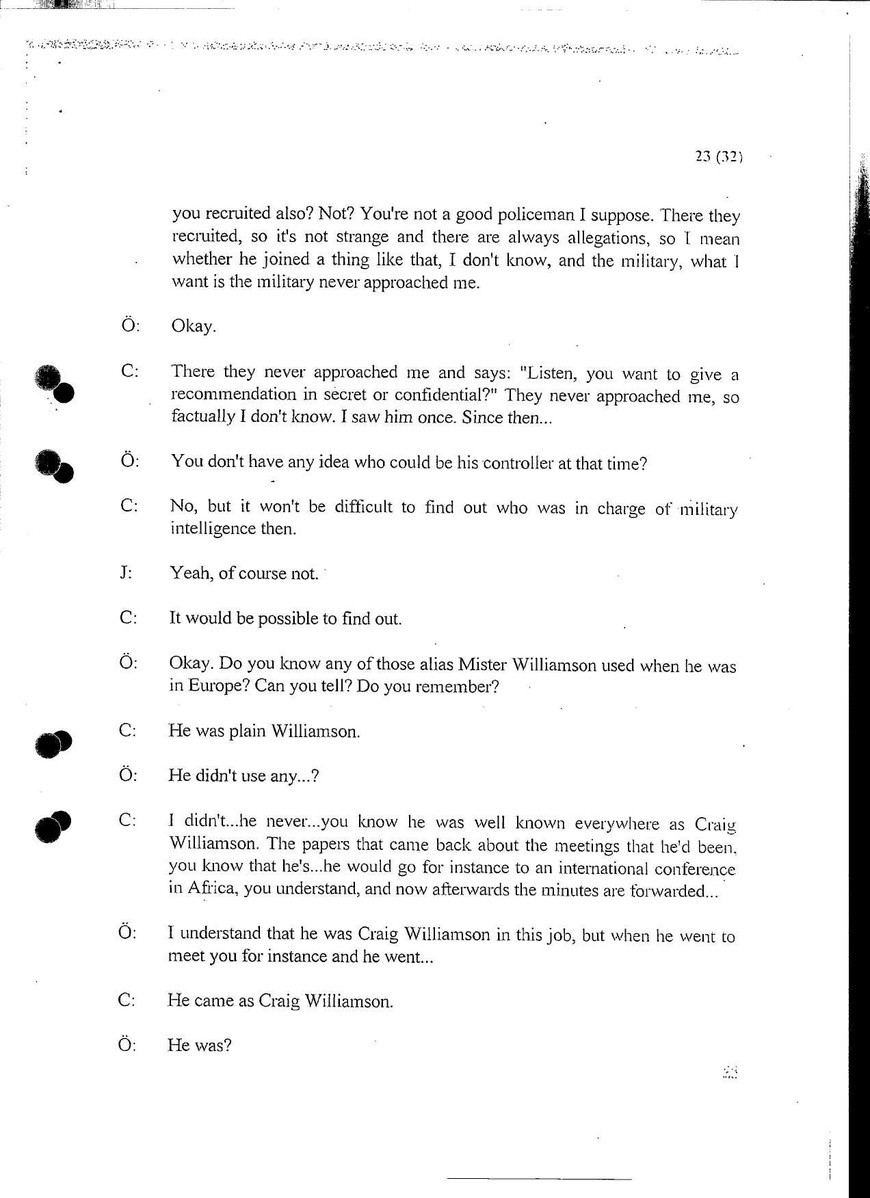
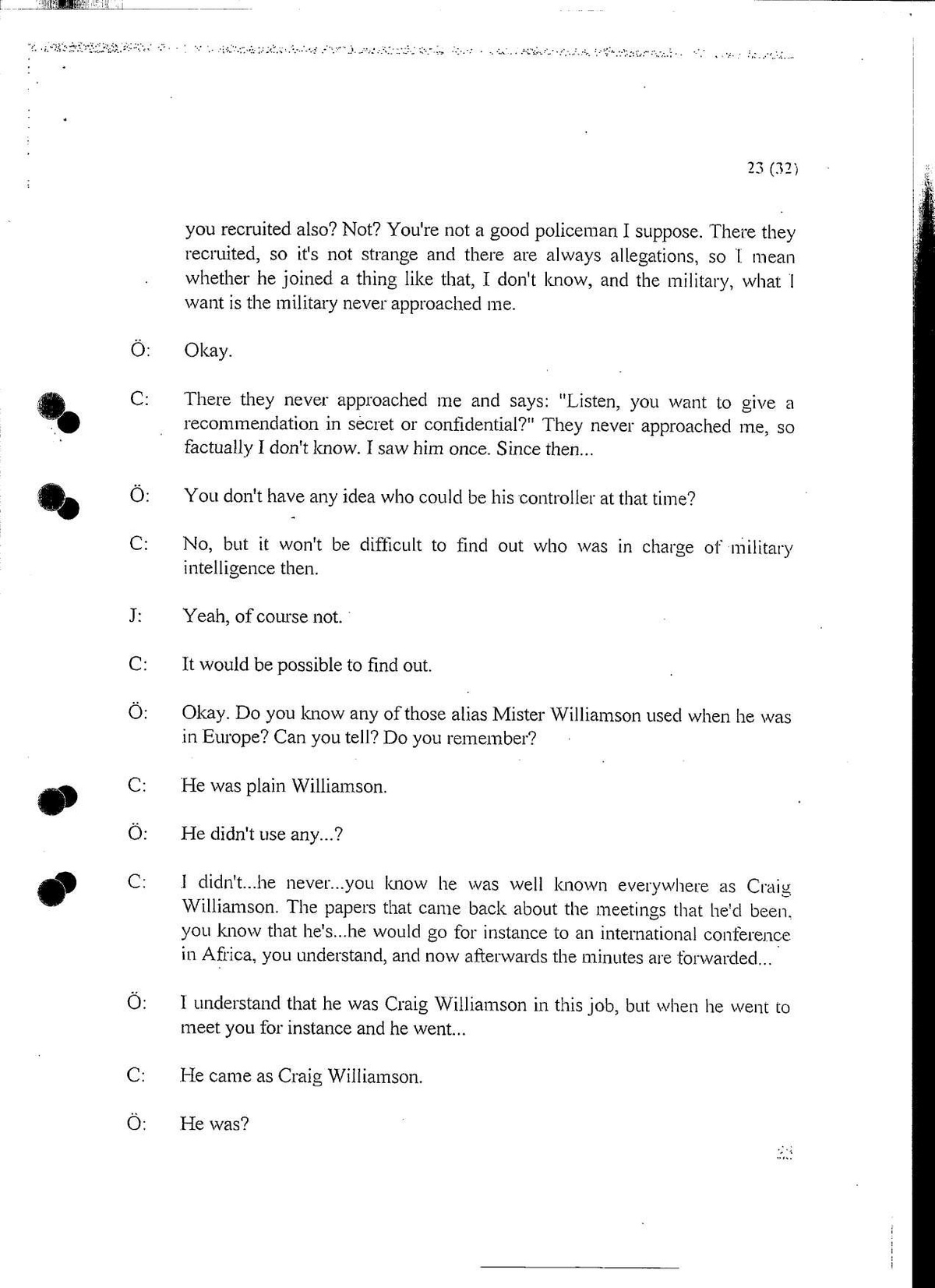
- - 23 (32) -
Johann Coetzee: you recruited also? Not? You're not a good policeman I suppose. There they recruited, so it's not strange and there are always allegations, so I mean whether he joined a thing like that, I don't know, and the military, what I want is the military never approached me.
FHL Hans Ölvebro: Okay.
Johann Coetzee: There they never approached me and says:
- "Listen, you want to give a recommendation in secret or confidential?"
They never approached me, so factually I don't know. I saw him once. Since then...
FHL Hans Ölvebro: You don't have any idea who could be his controller at that time?
Johann Coetzee: No, but it won't be difficult to find out who was in charge of military intelligence then.
Supt Jonker: Yeah, of course not.
Johann Coetzee: It would be possible to find out.
FHL Hans Ölvebro: Okay. Do you know any of those alias Mister Craig Williamson used when he was in Europe? Can you tell? Do you remember?
Johann Coetzee: He was plain Craig Williamson.
FHL Hans Ölvebro: He didn't use any ...?
Johann Coetzee: I didn't ... he never ... you know he was well known everywhere as Craig Williamson. The papers that came back about the meetings that he'd been, you know that he's ... he would go for instance to an international conference in Africa, you understand, and now afterwards the minutes are forwarded ...
FHL Hans Ölvebro: I understand that he was Craig Williamson in this job, but when he went to meet you for instance and he went...
Johann Coetzee: He came as Craig Williamson.
FHL Hans Ölvebro: He was?
- - 24 (32) -
Johann Coetzee: Yeah.
FHL Hans Ölvebro: Okay.
Johann Coetzee: As far as I'm concerned. He never said to me for instance when I'm in an hotel. I had to hide in Brussels, in a hotel. I had to hide, you know.
And he would phone me and he would say:
- "It's Craig".
He didn't even have a code to me, you know, although I knew his voice.
And he'd come in the evening or he'd book in the same hotel a room for himself, but as Craig Williamson as far as I am concerned.
And then he'd come and then he'd speak to me that evening, the whole evening and we'd go through all the things and so on. But I never knew that he had a pseudonym of any nature or code name.
FHL Hans Ölvebro: Well when you said that he had to leave Europe and move back to South Africa, did you provide him with some certain passport at that time?
Johann Coetzee: He had an international Passport given to him by IEUF. They were able, this is ... I remember that, they were able for him to travel in Africa, all over Africa with this, but it was in his name, you understand?
They were able to go to some organisation, I don't know, IUF, and then they would issue ... although you're a South African with a South African passport that's not allowed without visa to go somewhere, you ... with this United, I think it's a United Nations, I'm not sure, United Nations passport, you could travel with this without visa facilities and you could come everywhere.
FHL Hans Ölvebro: Do you have any questions?
ÅKL Jan Danielsson: Yes. What Mister Hans Ölvebro was referring to is that Mister Craig Williamson has told us that he had sometimes an alias with according travel documents: at least one of them issued by you. Do you remember that?
Johann Coetzee: Do you mean whilst he was there?
ÅKL Jan Danielsson: Yes, or when he left them. Well, it's not important actually, but he had an alias, he says himself or a false travel document, but you don't remember.
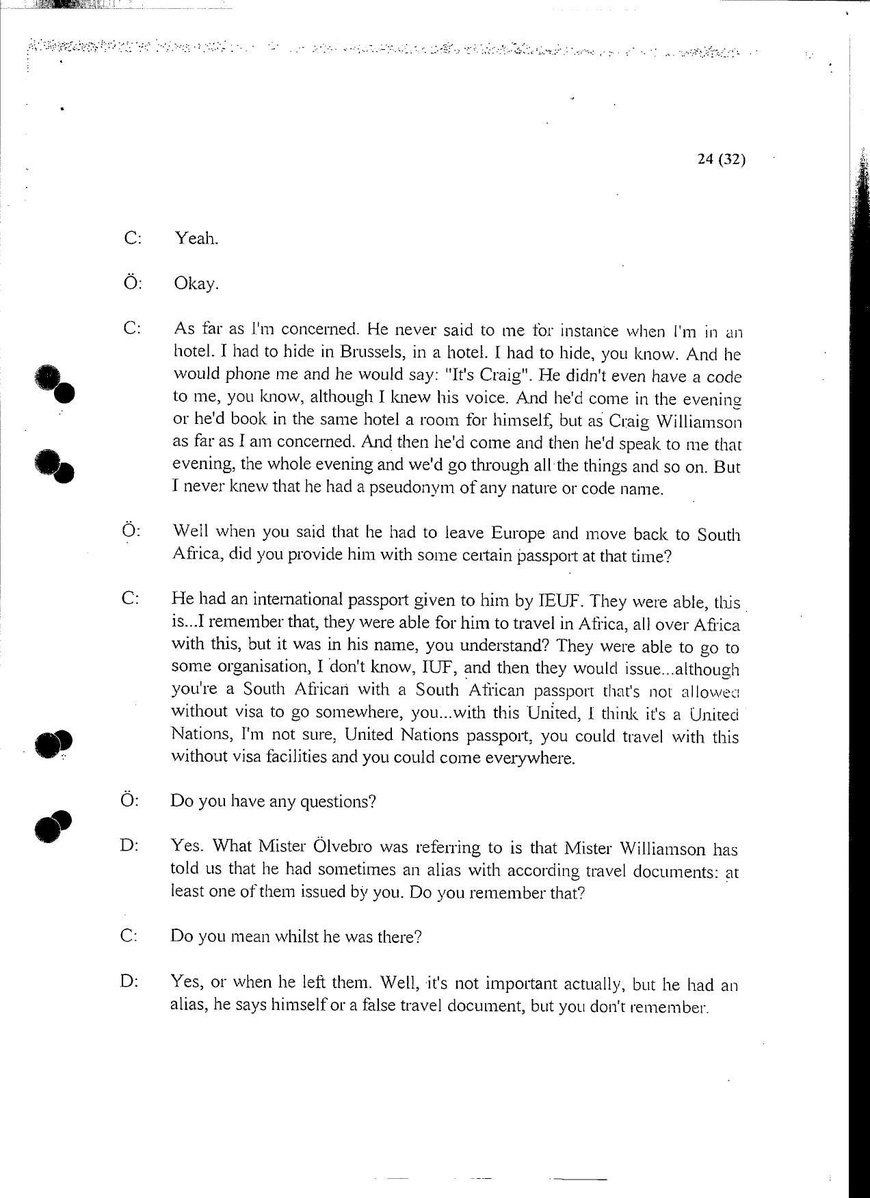
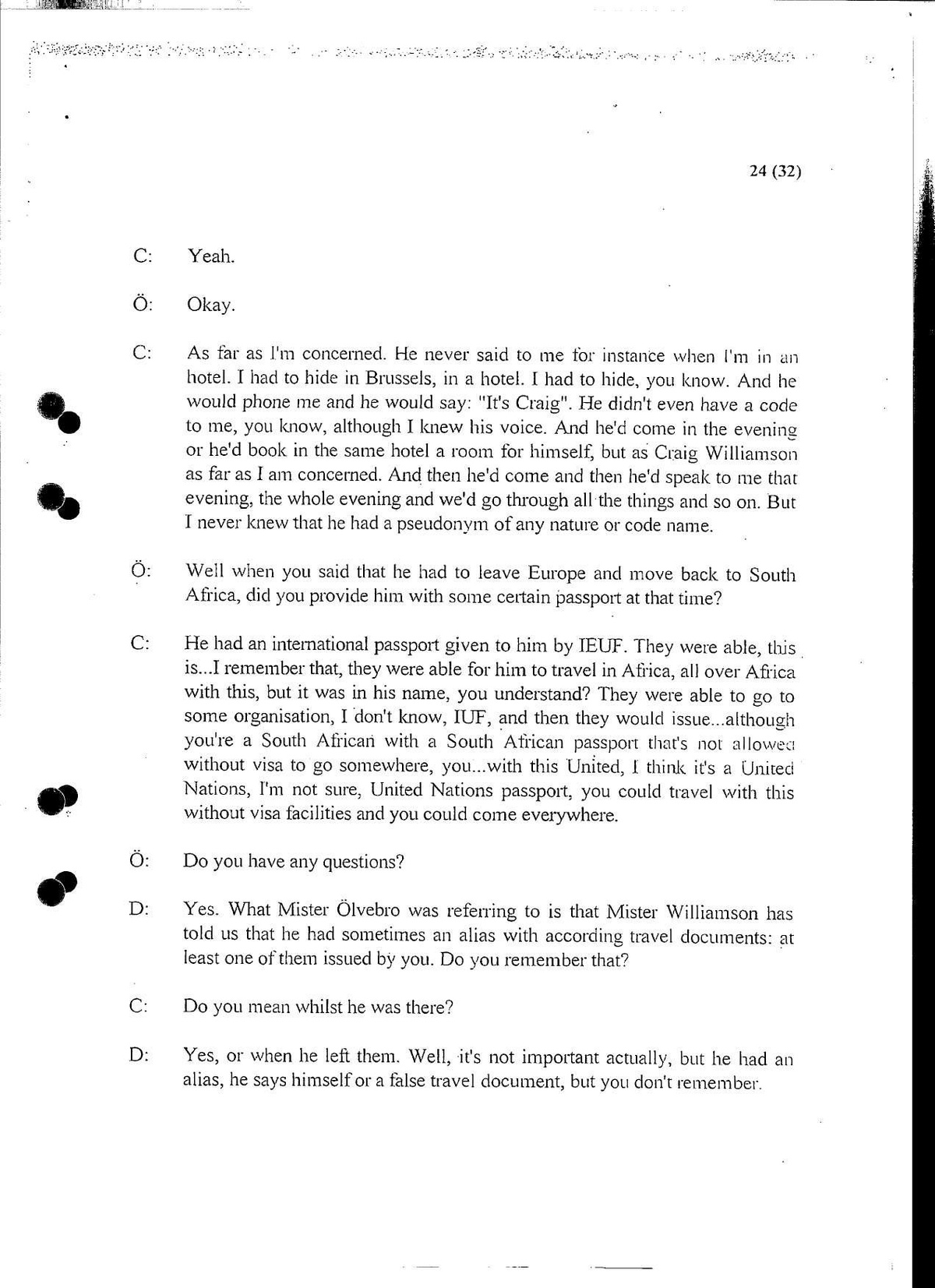
- - 24 (32) -
Johann Coetzee: Yeah.
FHL Hans Ölvebro: Okay.
Johann Coetzee: As far as I'm concerned. He never said to me for instance when I'm in an hotel. I had to hide in Brussels, in a hotel. I had to hide, you know.
And he would phone me and he would say:
- "It's Craig".
He didn't even have a code to me, you know, although I knew his voice.
And he'd come in the evening or he'd book in the same hotel a room for himself, but as Craig Williamson as far as I am concerned.
And then he'd come and then he'd speak to me that evening, the whole evening and we'd go through all the things and so on. But I never knew that he had a pseudonym of any nature or code name.
FHL Hans Ölvebro: Well when you said that he had to leave Europe and move back to South Africa, did you provide him with some certain passport at that time?
Johann Coetzee: He had an international Passport given to him by IEUF. They were able, this is ... I remember that, they were able for him to travel in Africa, all over Africa with this, but it was in his name, you understand?
They were able to go to some organisation, I don't know, IUF, and then they would issue ... although you're a South African with a South African passport that's not allowed without visa to go somewhere, you ... with this United, I think it's a United Nations, I'm not sure, United Nations passport, you could travel with this without visa facilities and you could come everywhere.
FHL Hans Ölvebro: Do you have any questions?
ÅKL Jan Danielsson: Yes. What Mister Hans Ölvebro was referring to is that Mister Craig Williamson has told us that he had sometimes an alias with according travel documents: at least one of them issued by you. Do you remember that?
Johann Coetzee: Do you mean whilst he was there?
ÅKL Jan Danielsson: Yes, or when he left them. Well, it's not important actually, but he had an alias, he says himself or a false travel document, but you don't remember.
- - 25 (32) -
FHL Hans Ölvebro: He went back to South Africa, not in his own name. It was a false name and a false passport and the passport was provided to him by you.
Johann Coetzee: No no no. I think what could have happened is that ... and one will have to find out from Namn maskerat .
We had an officer that could go to the Department of the Interior and ask for passports for different ... for people, you understand, on other names, you know and he would take it there and so on and I would for instance say well this ... would sign it.
I would sign it and say:
- "Well, it's for government."
But as you know this is issued. Now in that way you could say, well perhaps I recommend that and so on. That is possible.
I've done that for people like this and so on. You know one day this, you know ... it's possible that he applied at some stage, so because i Helt stycke maskerat
Now if he had a false passport, why didn't he just use it to come over the border?
I don't know. Perhaps he thought it was too dangerous. But I don't remember you know, but it's a possibility that he could in the process have thought it's necessary for him to have also. That would have been provided. It's not strange for an intelligence operator to have two or three passports, that's...
FHL Hans Ölvebro: But you're not aware of it.
Johann Coetzee: No, I'm not aware of it. I can't remember it. But the man that did it, that did it, his name is Namn maskerat , I don't know if he's still in the police.
Supt Jonker: No, he's not.
Johann Coetzee: I know last time he was in Cape Town.
Supt Jonker: It was issued in Cape Town.
Johann Coetzee: But he was the man. I never went. I personally never went to the department and said
- "Well please issue this and this".
And I personally never, ever. Helt stycke maskerat
Kan anknyta: HBJ17837
(Förhör 1996-10-18 med Craig Williamson)
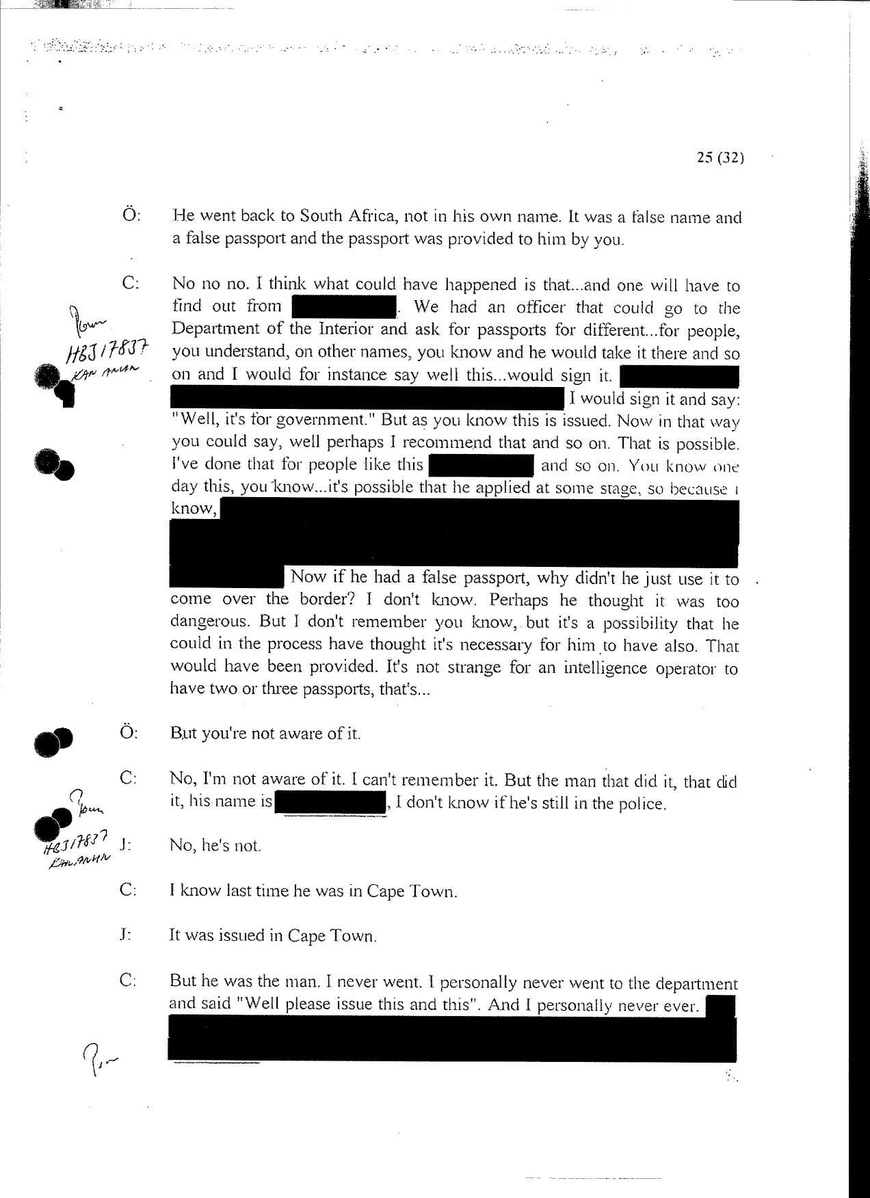
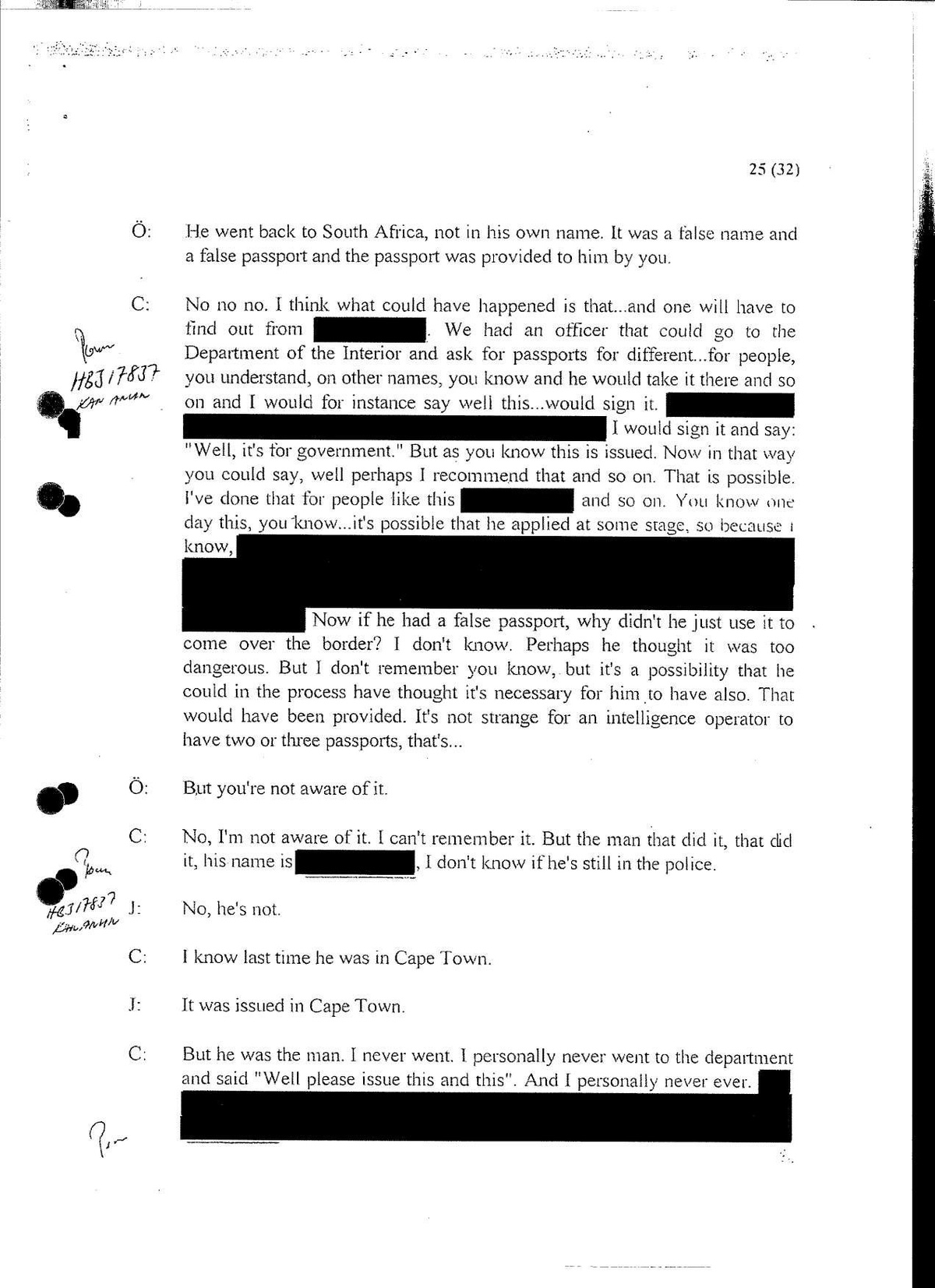
- - 25 (32) -
FHL Hans Ölvebro: He went back to South Africa, not in his own name. It was a false name and a false passport and the passport was provided to him by you.
Johann Coetzee: No no no. I think what could have happened is that ... and one will have to find out from Namn maskerat .
We had an officer that could go to the Department of the Interior and ask for passports for different ... for people, you understand, on other names, you know and he would take it there and so on and I would for instance say well this ... would sign it.
I would sign it and say:
- "Well, it's for government."
But as you know this is issued. Now in that way you could say, well perhaps I recommend that and so on. That is possible.
I've done that for people like this and so on. You know one day this, you know ... it's possible that he applied at some stage, so because i Helt stycke maskerat
Now if he had a false passport, why didn't he just use it to come over the border?
I don't know. Perhaps he thought it was too dangerous. But I don't remember you know, but it's a possibility that he could in the process have thought it's necessary for him to have also. That would have been provided. It's not strange for an intelligence operator to have two or three passports, that's...
FHL Hans Ölvebro: But you're not aware of it.
Johann Coetzee: No, I'm not aware of it. I can't remember it. But the man that did it, that did it, his name is Namn maskerat , I don't know if he's still in the police.
Supt Jonker: No, he's not.
Johann Coetzee: I know last time he was in Cape Town.
Supt Jonker: It was issued in Cape Town.
Johann Coetzee: But he was the man. I never went. I personally never went to the department and said
- "Well please issue this and this".
And I personally never, ever. Helt stycke maskerat
Kan anknyta: HBJ17837
(Förhör 1996-10-18 med Craig Williamson)
- - 26 (32) -
Johann Coetzee: Helt stycke maskerat
FHL Hans Ölvebro: My next question will be: Do you know anything about Longreach?
Johann Coetzee: I read about it in the newspapers I have. Nothing. Not one thing.
FHL Hans Ölvebro: Okay.
ÅKL Jan Danielsson:
Johann Coetzee: Helt stycke maskerat
ÅKL Jan Danielsson: You don't remember the name of the controller in National Intelligence?
Johann Coetzee: Well I can't say that ... you know he was not in a personal capacity. He was in control of the information. As I say we had a joint desk. He retired I think as second in charge of National Intelligence. Or third in charge. I can ... you know I'll phone friends there, I'll ... perhaps we find out. But he's a ...
ÅKL Jan Danielsson: You could do that if you want.
Johann Coetzee: Yeah, he could ... but as I say I don't know whether he ever met him. I mean he was there to get when the information came as far as ...
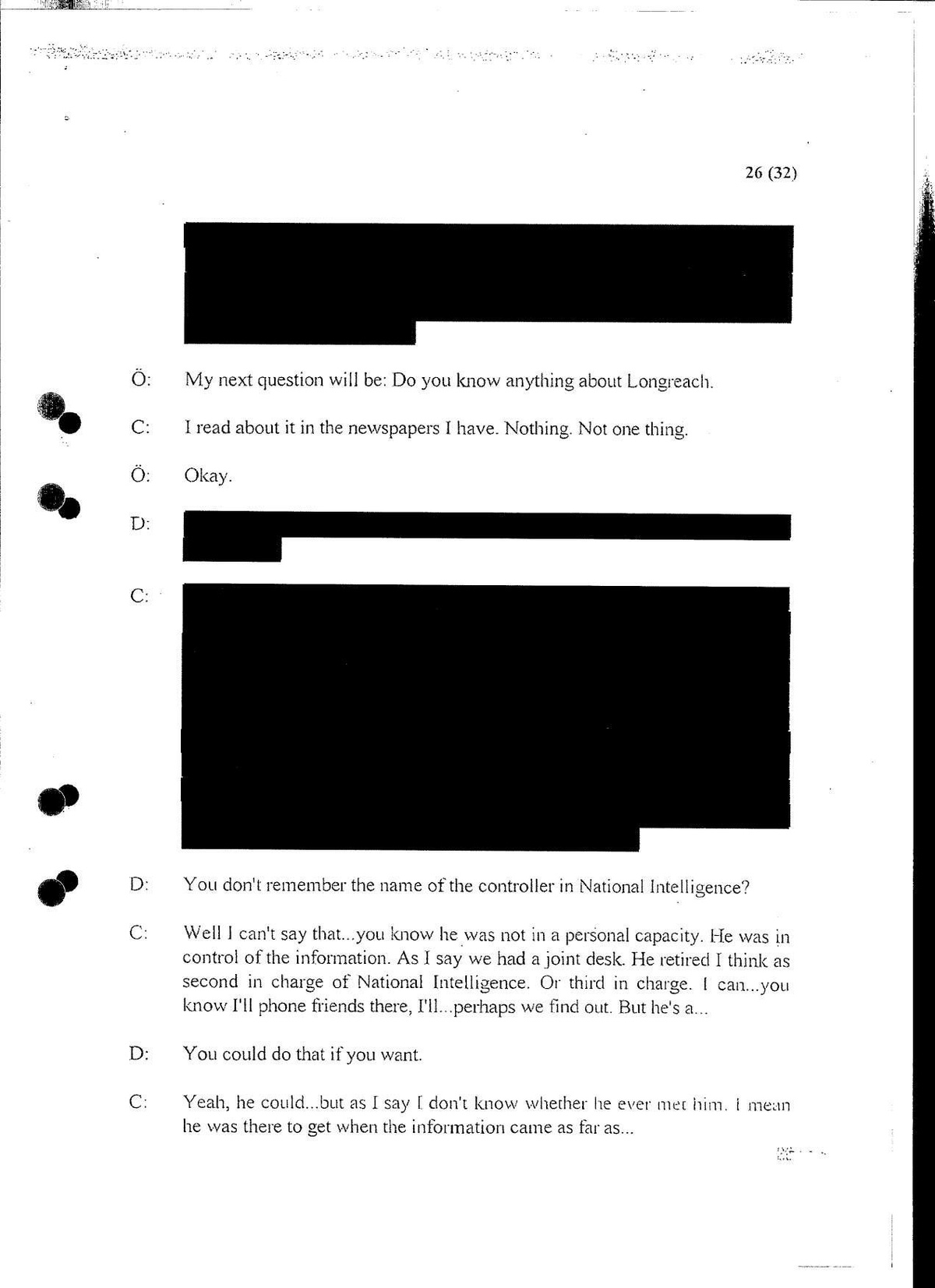
- - 26 (32) -
Johann Coetzee: Helt stycke maskerat
FHL Hans Ölvebro: My next question will be: Do you know anything about Longreach?
Johann Coetzee: I read about it in the newspapers I have. Nothing. Not one thing.
FHL Hans Ölvebro: Okay.
ÅKL Jan Danielsson:
Johann Coetzee: Helt stycke maskerat
ÅKL Jan Danielsson: You don't remember the name of the controller in National Intelligence?
Johann Coetzee: Well I can't say that ... you know he was not in a personal capacity. He was in control of the information. As I say we had a joint desk. He retired I think as second in charge of National Intelligence. Or third in charge. I can ... you know I'll phone friends there, I'll ... perhaps we find out. But he's a ...
ÅKL Jan Danielsson: You could do that if you want.
Johann Coetzee: Yeah, he could ... but as I say I don't know whether he ever met him. I mean he was there to get when the information came as far as ...
- - 27 (32) -
ÅKL Jan Danielsson: Okay.
Johann Coetzee: But Military Intelligence was not concerned there.
ÅKL Jan Danielsson: No.
Johann Coetzee: I won't tell you that says ...
ÅKL Jan Danielsson:
Johann Coetzee: Helt stycke maskerat
ÅKL Jan Danielsson: From the time Mister Craig Williamson comes back to South Africa in the beginning of 1980, till he leaves the security police in the end of 1985, I think, who would, within the security police know best of what Craig Williamson did from ... between 1980 and 1985?
Johann Coetzee: Now...
ÅKL Jan Danielsson: Who would have the best knowledge of this?
Johann Coetzee:
ÅKL Jan Danielsson: Yes.
Johann Coetzee: Helt stycke maskerat (Pomn)
Personer omnämnda:
Pomn) Craig Williamson
HBJ 17837 (Förhör 1996-10-18 med Craig Williamson
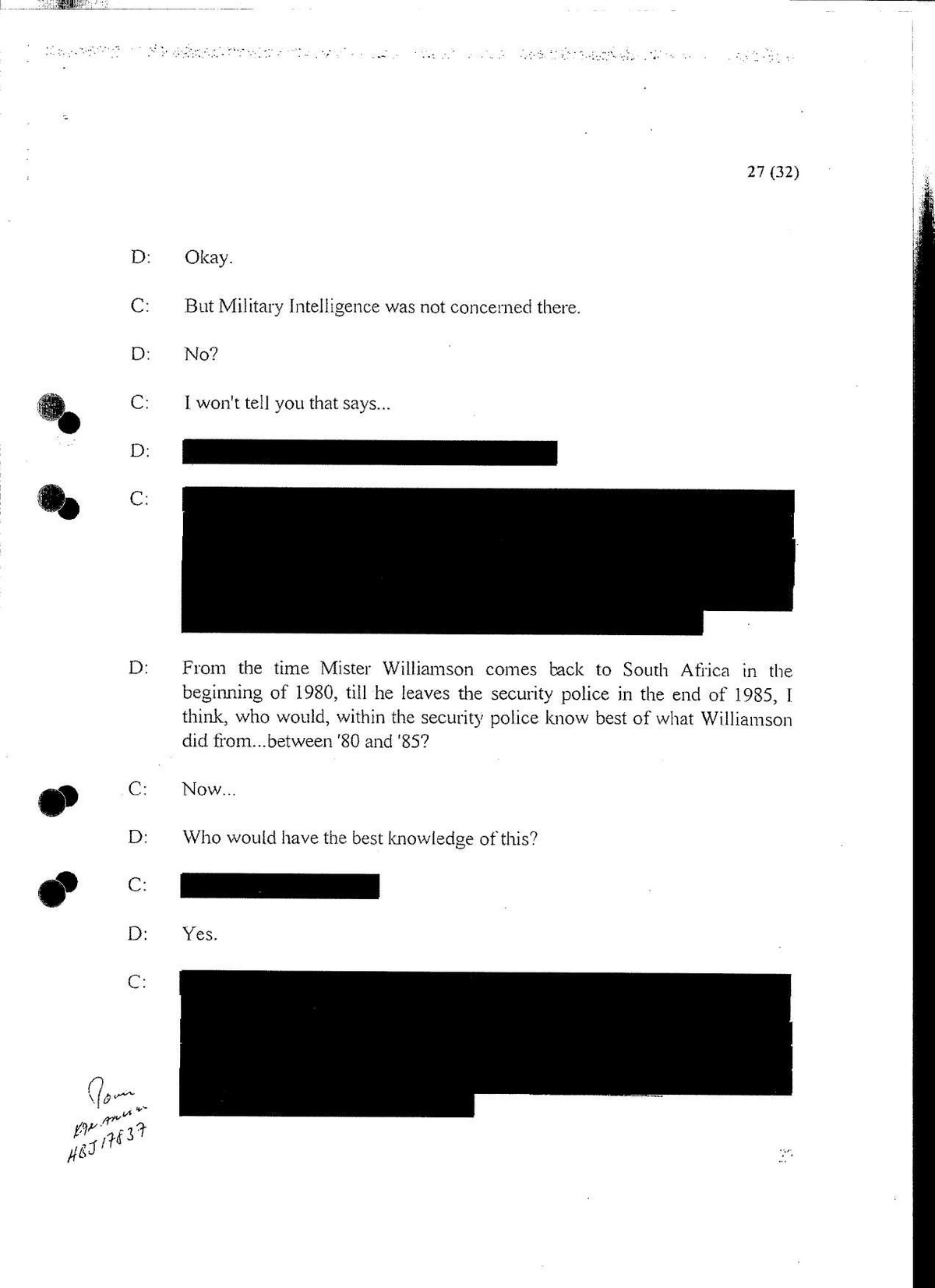
- - 27 (32) -
ÅKL Jan Danielsson: Okay.
Johann Coetzee: But Military Intelligence was not concerned there.
ÅKL Jan Danielsson: No.
Johann Coetzee: I won't tell you that says ...
ÅKL Jan Danielsson:
Johann Coetzee: Helt stycke maskerat
ÅKL Jan Danielsson: From the time Mister Craig Williamson comes back to South Africa in the beginning of 1980, till he leaves the security police in the end of 1985, I think, who would, within the security police know best of what Craig Williamson did from ... between 1980 and 1985?
Johann Coetzee: Now...
ÅKL Jan Danielsson: Who would have the best knowledge of this?
Johann Coetzee:
ÅKL Jan Danielsson: Yes.
Johann Coetzee: Helt stycke maskerat (Pomn)
Personer omnämnda:
Pomn) Craig Williamson
HBJ 17837 (Förhör 1996-10-18 med Craig Williamson
- - 28 (32) -
ÅKL Jan Danielsson: Can you spell this?
Johann Coetzee:
ÅKL Jan Danielsson: Yes.
Johann Coetzee:
ÅKL Jan Danielsson: Yes. And after him?
Johann Coetzee: I beg your pardon?
ÅKL Jan Danielsson: And after him?
Johann Coetzee: Helt stycke maskerat
ÅKL Jan Danielsson: Can you spell that?
Johann Coetzee: I'll just get his...
Casper Jonker: Try to remember what was his first name.
Johann Coetzee:
ÅKL Jan Danielsson:
Johann Coetzee:
ÅKL Jan Danielsson:
Hans Ölvebro: But Casper Jonker this is easy to find out.
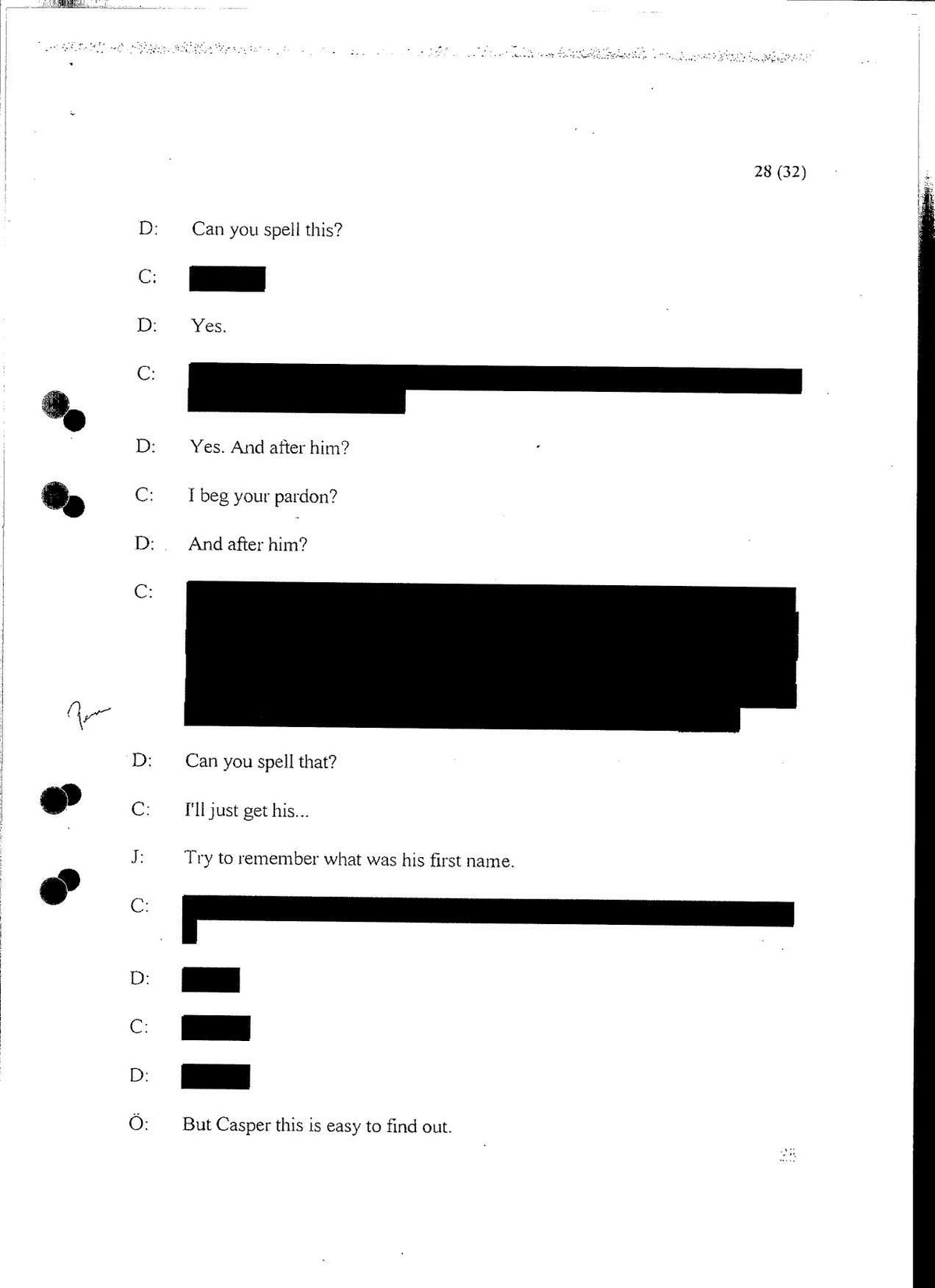
- - 28 (32) -
ÅKL Jan Danielsson: Can you spell this?
Johann Coetzee:
ÅKL Jan Danielsson: Yes.
Johann Coetzee:
ÅKL Jan Danielsson: Yes. And after him?
Johann Coetzee: I beg your pardon?
ÅKL Jan Danielsson: And after him?
Johann Coetzee: Helt stycke maskerat
ÅKL Jan Danielsson: Can you spell that?
Johann Coetzee: I'll just get his...
Casper Jonker: Try to remember what was his first name.
Johann Coetzee:
ÅKL Jan Danielsson:
Johann Coetzee:
ÅKL Jan Danielsson:
Hans Ölvebro: But Casper Jonker this is easy to find out.
- - 29 (32) -
Casper Jonker: Yes, it's easy to find out.
Johann Coetzee: Now I think, I'm not very sure but I think that when I, more or less the same time that I resigned, I went on retirement, early retirement.
I must say that I didn't last the whole thing, I decided at one stage I'm going on early retirement in 1987, end of 1986.
When I resigned I think he was still there, or it may have been someone else then, but I won't remember that at this stage. (Pomn) Perhaps, I don't know.
ÅKL Jan Danielsson: We'll find out.
Johann Coetzee: Helt stycke maskerat
ÅKL Jan Danielsson: Do you have any more questions?
Hans Ölvebro: No, I don't.
ÅKL Jan Danielsson: Helt stycke maskerat
This question will be somewhat speculative but as I know you have worked closely with Craig Williamson for some time, would you say that Craig Williamson would be a character capable of planning an operation like the murder of the minister of Sweden?
And, if capable, would he do it on his own or would he do it only on orders?
Johann Coetzee: No no, he wouldn't do it on his own. I doubt whether he would do a thing like that on his own unless there's a personal, a particular personal reason that I'm unaware of. I mean that is within the realm of possibilities. I don't know who, when I resigned, who was the chief of military intelligence.
I don't Helt stycke maskerat
So I don't know who became chief of ... you looking for something?
Personer omnämnda:
HBD17830 (Förhör 1996-10-23 med Dirk Coetzee)
HBJ17837 (Förhör 1996-10-18 med Craig Williamson)
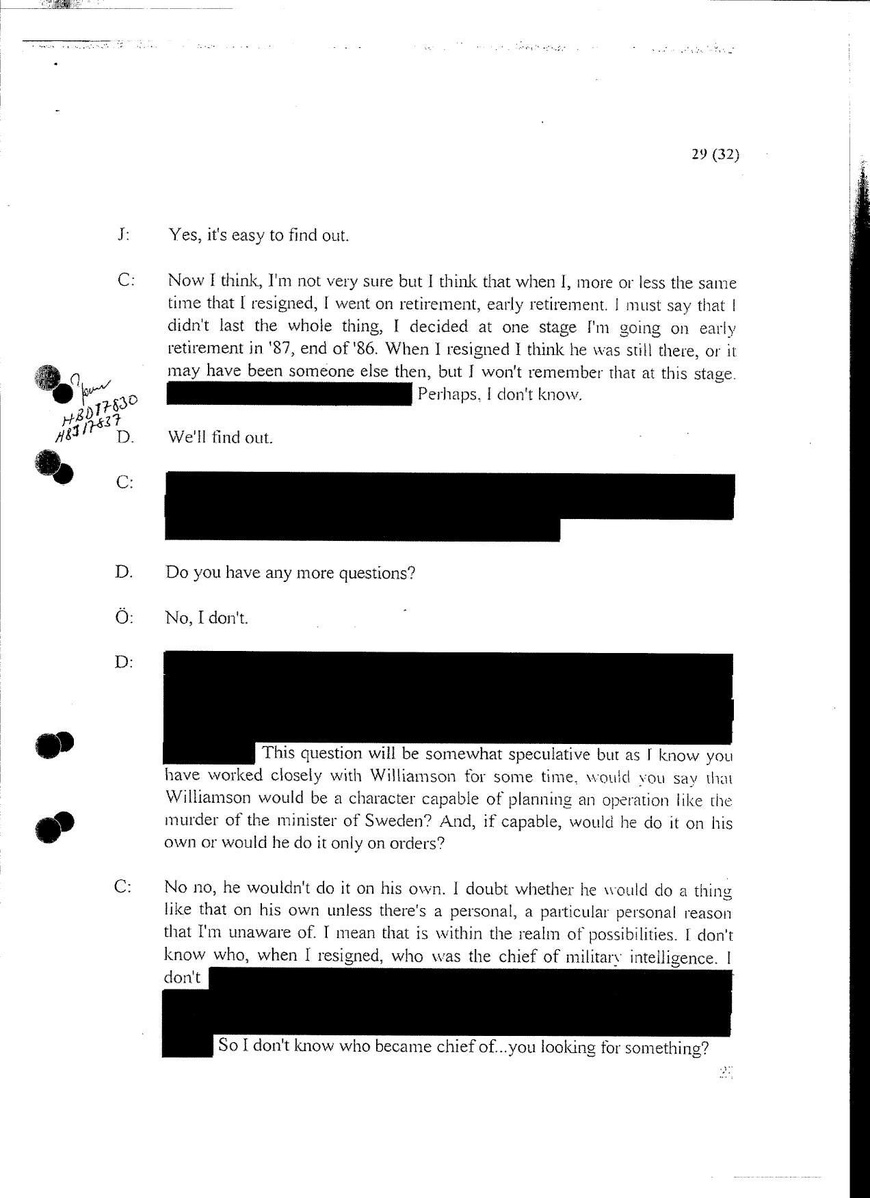
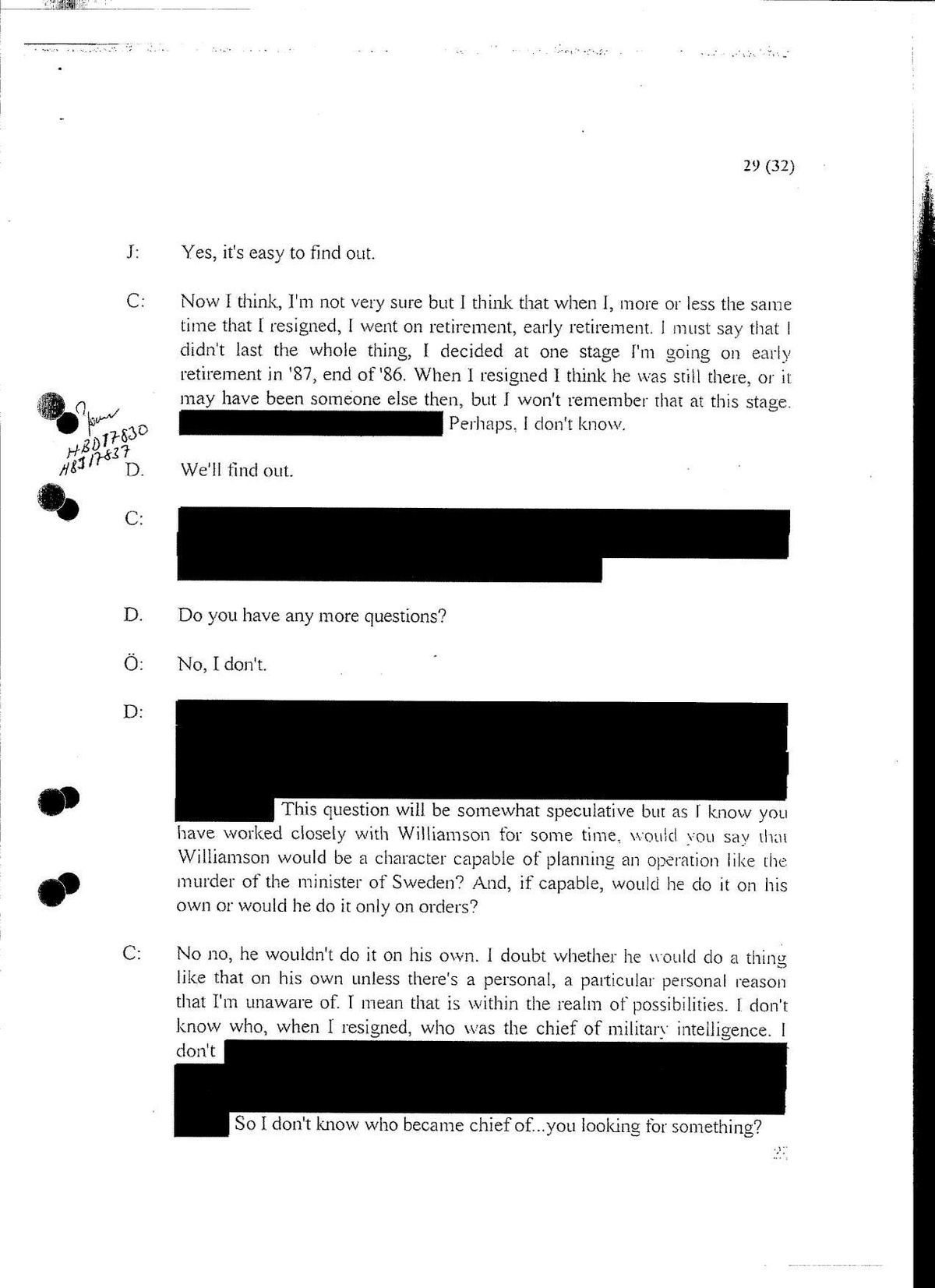
- - 29 (32) -
Casper Jonker: Yes, it's easy to find out.
Johann Coetzee: Now I think, I'm not very sure but I think that when I, more or less the same time that I resigned, I went on retirement, early retirement.
I must say that I didn't last the whole thing, I decided at one stage I'm going on early retirement in 1987, end of 1986.
When I resigned I think he was still there, or it may have been someone else then, but I won't remember that at this stage. (Pomn) Perhaps, I don't know.
ÅKL Jan Danielsson: We'll find out.
Johann Coetzee: Helt stycke maskerat
ÅKL Jan Danielsson: Do you have any more questions?
Hans Ölvebro: No, I don't.
ÅKL Jan Danielsson: Helt stycke maskerat
This question will be somewhat speculative but as I know you have worked closely with Craig Williamson for some time, would you say that Craig Williamson would be a character capable of planning an operation like the murder of the minister of Sweden?
And, if capable, would he do it on his own or would he do it only on orders?
Johann Coetzee: No no, he wouldn't do it on his own. I doubt whether he would do a thing like that on his own unless there's a personal, a particular personal reason that I'm unaware of. I mean that is within the realm of possibilities. I don't know who, when I resigned, who was the chief of military intelligence.
I don't Helt stycke maskerat
So I don't know who became chief of ... you looking for something?
Personer omnämnda:
HBD17830 (Förhör 1996-10-23 med Dirk Coetzee)
HBJ17837 (Förhör 1996-10-18 med Craig Williamson)
- - 3 (32) -
Johann Coetzee: his father.
His father was a very prominent Johannesburg businessman. They were concerned with tyres: motor-car tyres. It was called 'Williamson & Patterson'. Very very famous. I think they still exist.
I'm not sure, but his father died. When he was working in Switzerland his father died and I knew that he came back in secret to attend his father's funeral and we took him over the border at night to go and see his mother here and so on.
But I knew his father. This is how I got...became associated with him.
At that stage, at the University of the Witwatersrand, there was an organisation called NUSAS: National Union of South African Students. National Union of South African Students.
It was a... not a communist organisation, but it was very anti the government of that stage.
The organisation itself was a student organisation, for students and it had very many categories of political groupings within this organisation: very left people, very...you know this is very difficult definitions.
Very left people, very liberal people, conservative people and so on, but basically very opposed to the then policies of the South African government. So obviously the police or the security police also had to monitor them, their activities.
And at that stage I met Mister Craig Williamson and I ... well we decided that he would try and infiltrate into this organisation. Because he was a student there he could join, he was entitled to join, according to the regulations, which he did.
Now he was a very capable man as far as I am concerned, and it wasn't very long before he was one of the leaders at this university of this particular student organisation.
To the extent that eventually I think he was either the Witwatersrand leader of the organisation: chairman or the vice-chairman, I don't know exactly that.
But he was then transferred to Cape Town, not by the police, but by this student organisation, to the headquarters of NUSAS or the National Union of South Africa was in Cape Town.
He was transferred there and he became a fulltime worker as far as I'm concerned, for NUSAS.
In the meantime the police in Cape Town, they had a flat where they met him regularly and got information from him and so on and I still saw these reports coming through.
But obviously NUSAS, or this organisation, also had like all political organisations, leaks or tentacles to very many organisations, other organisations. And in that way he was a very valuable position that he had there.
It must have been a year or two after he had started ... commenced, working ...
(the telephone rings). All right. I'm sorry for the telephone call.
He was concerned at that stage in the National Union of South African Students, with the position of a link or a courier or a messenger between their headquarters and the organisation
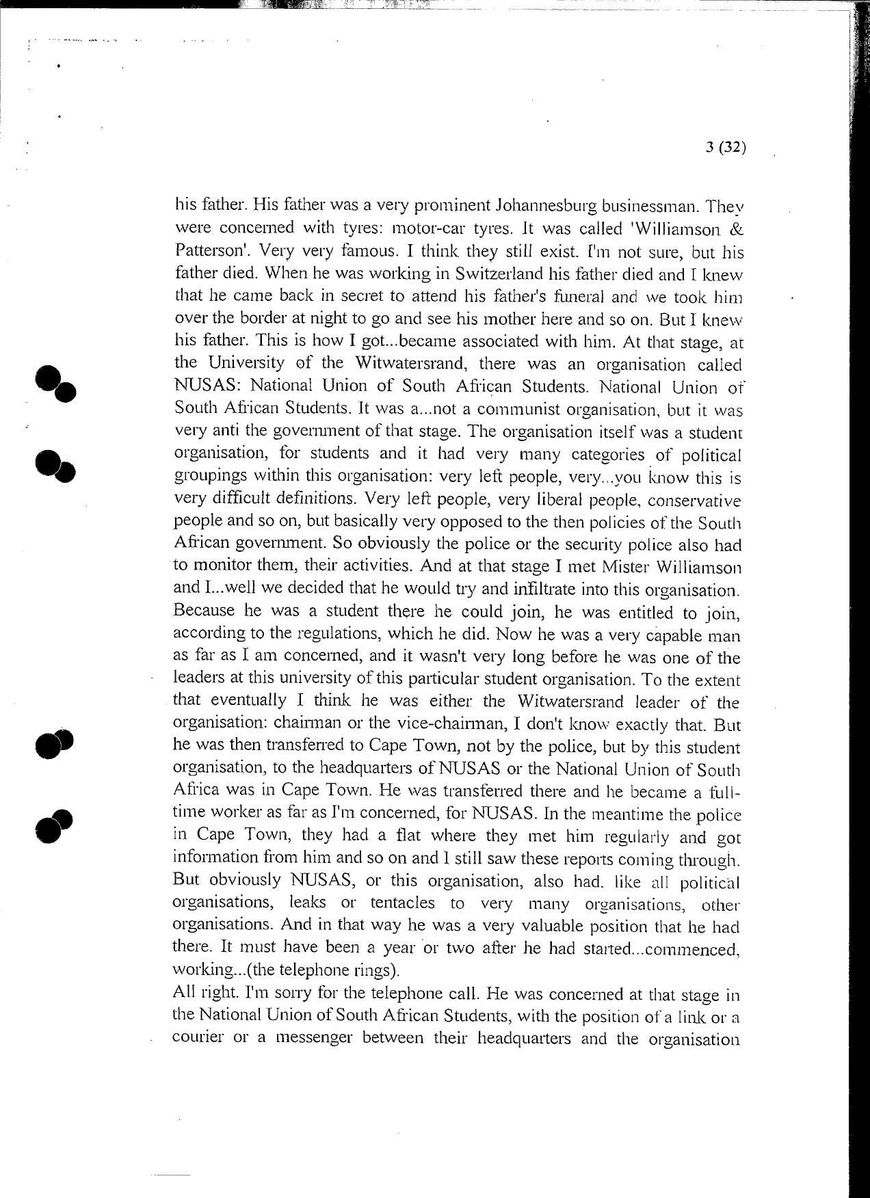
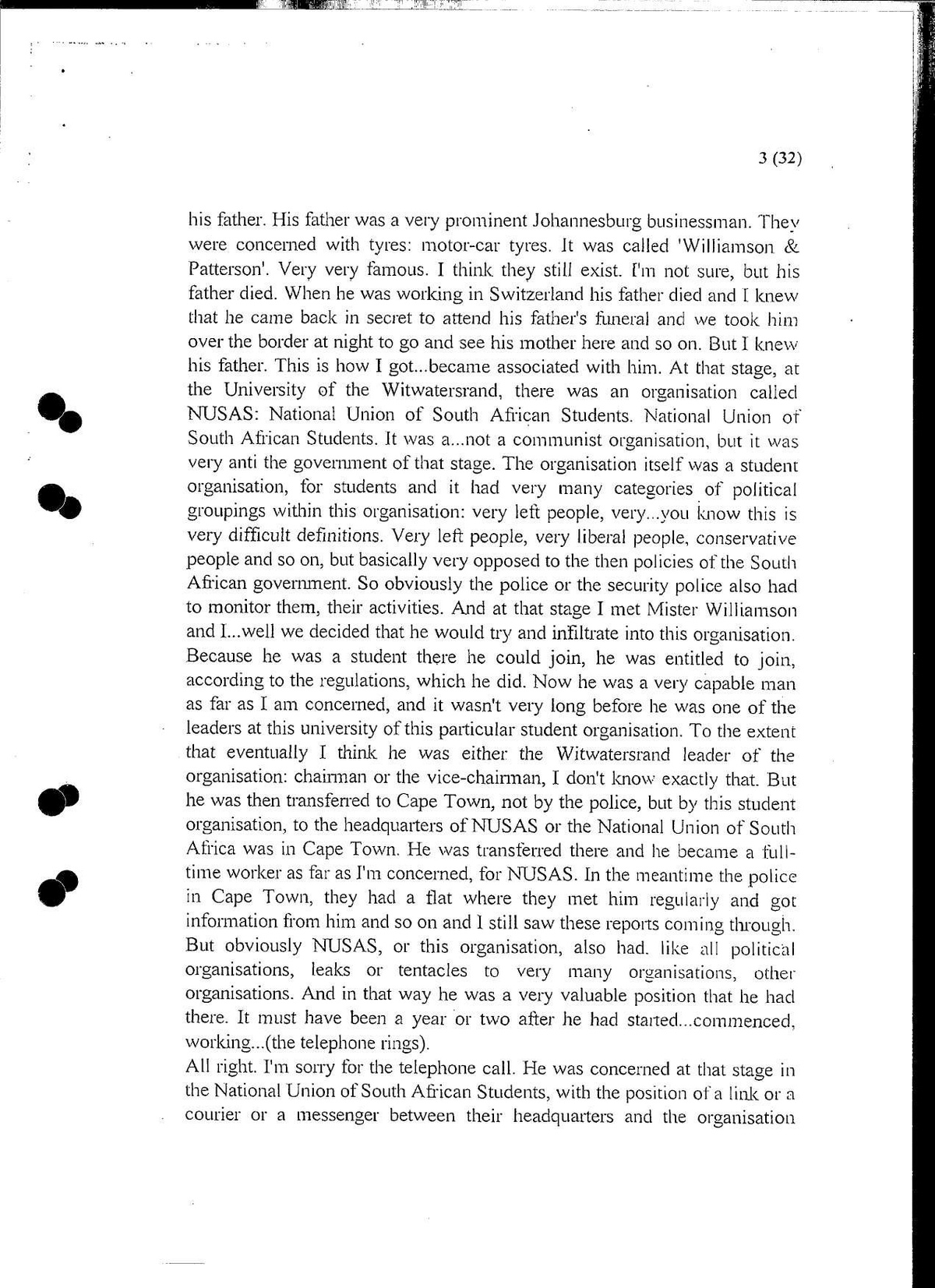
- - 3 (32) -
Johann Coetzee: his father.
His father was a very prominent Johannesburg businessman. They were concerned with tyres: motor-car tyres. It was called 'Williamson & Patterson'. Very very famous. I think they still exist.
I'm not sure, but his father died. When he was working in Switzerland his father died and I knew that he came back in secret to attend his father's funeral and we took him over the border at night to go and see his mother here and so on.
But I knew his father. This is how I got...became associated with him.
At that stage, at the University of the Witwatersrand, there was an organisation called NUSAS: National Union of South African Students. National Union of South African Students.
It was a... not a communist organisation, but it was very anti the government of that stage.
The organisation itself was a student organisation, for students and it had very many categories of political groupings within this organisation: very left people, very...you know this is very difficult definitions.
Very left people, very liberal people, conservative people and so on, but basically very opposed to the then policies of the South African government. So obviously the police or the security police also had to monitor them, their activities.
And at that stage I met Mister Craig Williamson and I ... well we decided that he would try and infiltrate into this organisation. Because he was a student there he could join, he was entitled to join, according to the regulations, which he did.
Now he was a very capable man as far as I am concerned, and it wasn't very long before he was one of the leaders at this university of this particular student organisation.
To the extent that eventually I think he was either the Witwatersrand leader of the organisation: chairman or the vice-chairman, I don't know exactly that.
But he was then transferred to Cape Town, not by the police, but by this student organisation, to the headquarters of NUSAS or the National Union of South Africa was in Cape Town.
He was transferred there and he became a fulltime worker as far as I'm concerned, for NUSAS.
In the meantime the police in Cape Town, they had a flat where they met him regularly and got information from him and so on and I still saw these reports coming through.
But obviously NUSAS, or this organisation, also had like all political organisations, leaks or tentacles to very many organisations, other organisations. And in that way he was a very valuable position that he had there.
It must have been a year or two after he had started ... commenced, working ...
(the telephone rings). All right. I'm sorry for the telephone call.
He was concerned at that stage in the National Union of South African Students, with the position of a link or a courier or a messenger between their headquarters and the organisation
- - 30 (32) -
Casper Jonker: No.
Johann Coetzee: Helt stycke maskerat
ÅKL Jan Danielsson: Well that was not exactly the question.
Johann Coetzee: Helt stycke maskerat
ÅKL Jan Danielsson:
Johann Coetzee: Helt stycke maskerat
ÅKL Jan Danielsson: What does that mean?
Johann Coetzee: Helt stycke maskerat
- - 30 (32) -
Casper Jonker: No.
Johann Coetzee: Helt stycke maskerat
ÅKL Jan Danielsson: Well that was not exactly the question.
Johann Coetzee: Helt stycke maskerat
ÅKL Jan Danielsson:
Johann Coetzee: Helt stycke maskerat
ÅKL Jan Danielsson: What does that mean?
Johann Coetzee: Helt stycke maskerat
- - 31 (32) -
Johann Coetzee: Helt stycke maskerat
ÅKL Jan Danielsson: Okay. Let us assume that Williamson has nothing to do with this, but in fact there is a South African connection besides Williamson.
Where would you look? Which organisation or unit in South Africa would be possibly involved in that case?
Johann Coetzee: Let me answer it, Sir, this way: you know although in practice, in practice it never works out completely that way...
END OF TAPE
Bandet tog slut innan Johann Coetzee svarat färdigt på sista frågan från chefsåklagare Jan Danielsson.
Undertecknad gjorde anteckningar utifrån Johann Coetzees svar och följande är en redovisning av anteckningarna:
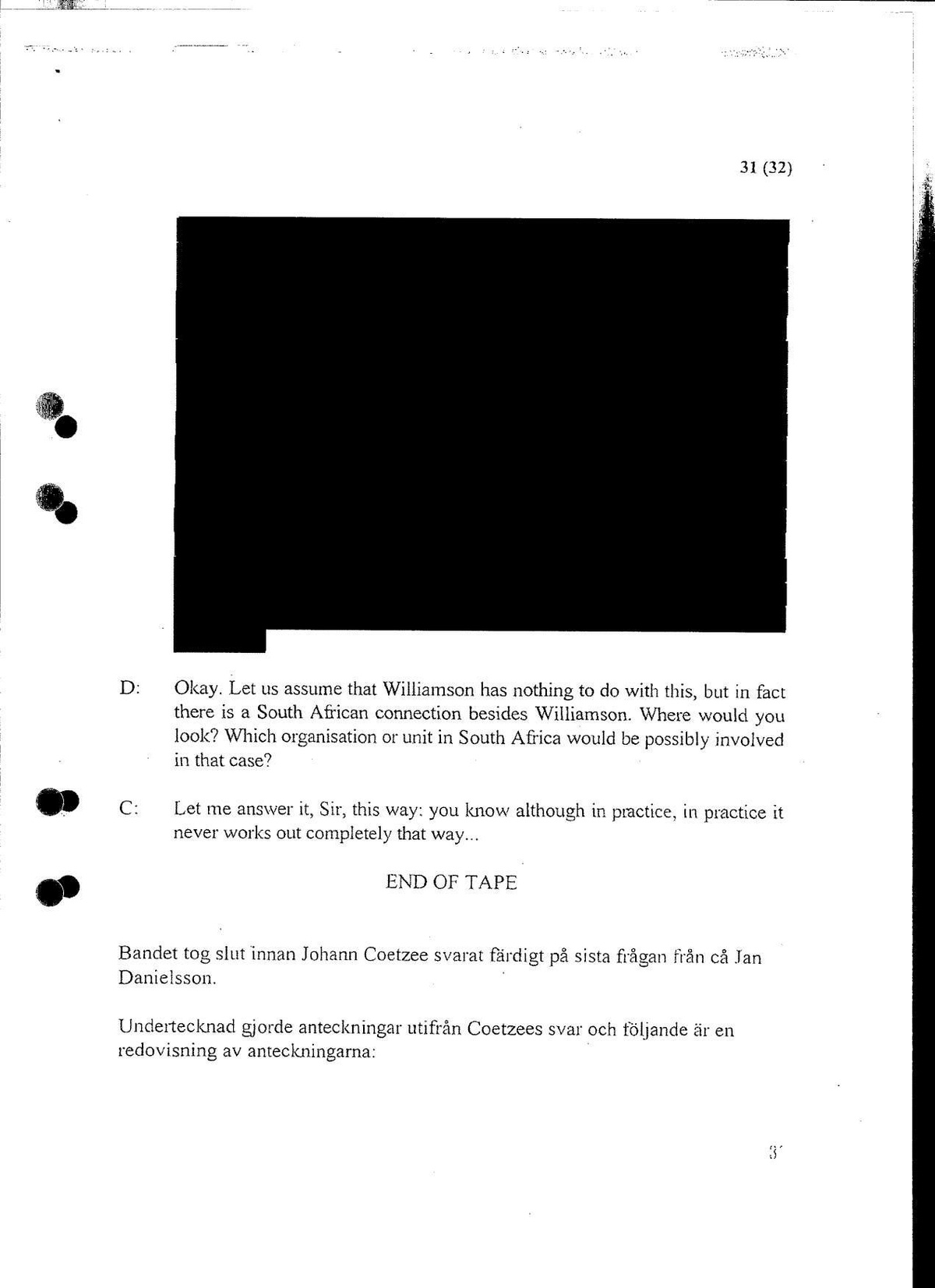
- - 31 (32) -
Johann Coetzee: Helt stycke maskerat
ÅKL Jan Danielsson: Okay. Let us assume that Williamson has nothing to do with this, but in fact there is a South African connection besides Williamson.
Where would you look? Which organisation or unit in South Africa would be possibly involved in that case?
Johann Coetzee: Let me answer it, Sir, this way: you know although in practice, in practice it never works out completely that way...
END OF TAPE
Bandet tog slut innan Johann Coetzee svarat färdigt på sista frågan från chefsåklagare Jan Danielsson.
Undertecknad gjorde anteckningar utifrån Johann Coetzees svar och följande är en redovisning av anteckningarna:
- - 32 (32) -
Eftersom den sydafrikanska polisen endast opererade inom landet och militären var aktiv inom Afrika är dessa organisationer uteslutna enligt Johann Coetzee. Däremot opererade National Intelligence i övriga världen.
Beträffande Eugene de Kock och Dirk Coetzee menade Johann att dessa två är något av. rättshaverister och att de trots förändringar i Sydafrika fortsatt med sin verksamhet plus att de också begått brott vid sidan av polisverksamheten.
Deras agerande den senaste tiden med anklagelser mot Craig Williamson bygger på rykten och avundsjuka.
Förhöret avslutat kl 12:45. Johann Coetzee önskade ej lyssna igenom bandet.
Stockholm 1997-03-04
(Namnteckning)
Hans Ölvebro
Personer omnämnda:
HBE17832 (Förhör med Eugene de Kock)
HBD17830 (Förhör 1996-10-23 med Dirk Coetzee)
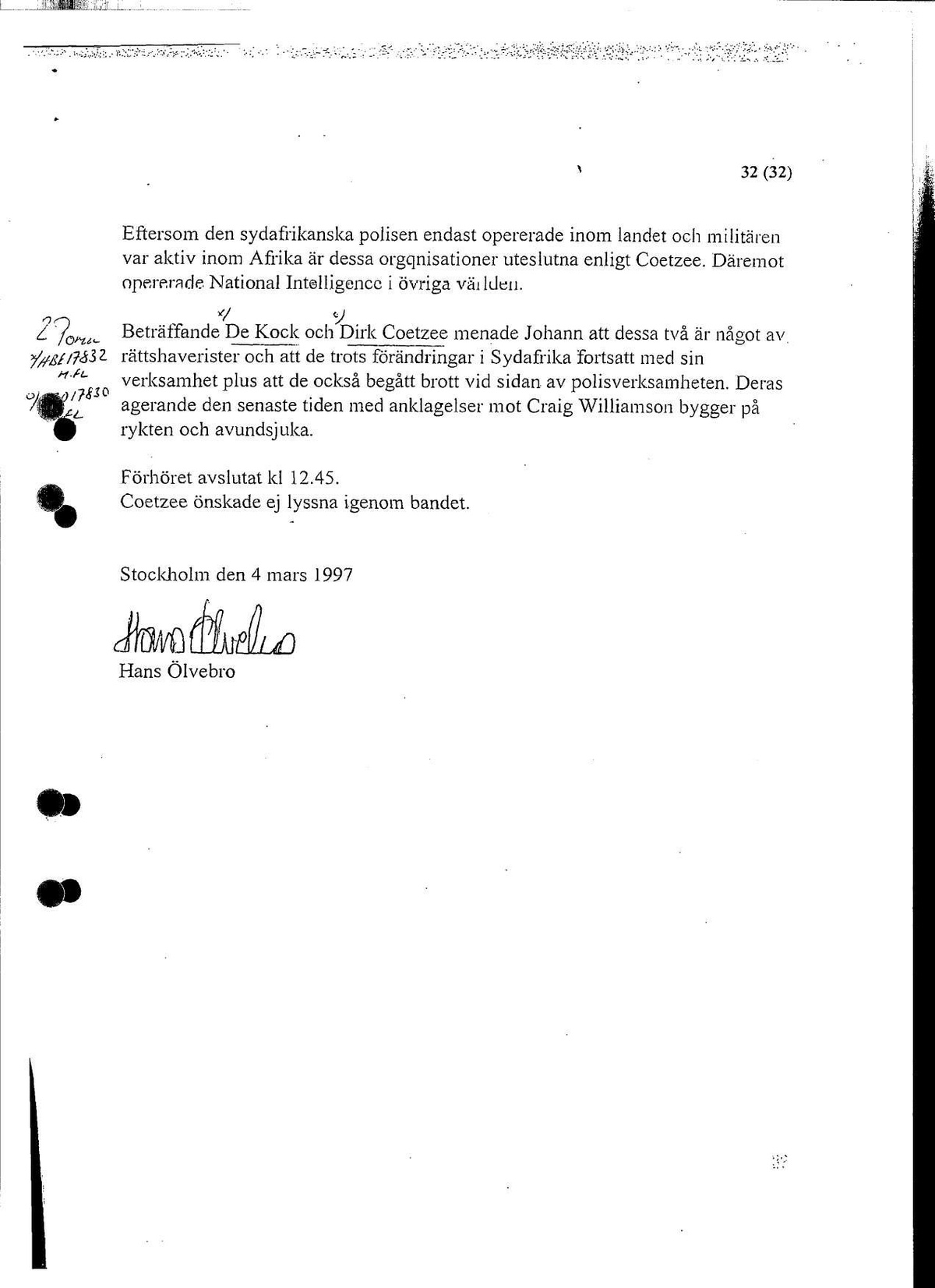
- - 32 (32) -
Eftersom den sydafrikanska polisen endast opererade inom landet och militären var aktiv inom Afrika är dessa organisationer uteslutna enligt Johann Coetzee. Däremot opererade National Intelligence i övriga världen.
Beträffande Eugene de Kock och Dirk Coetzee menade Johann att dessa två är något av. rättshaverister och att de trots förändringar i Sydafrika fortsatt med sin verksamhet plus att de också begått brott vid sidan av polisverksamheten.
Deras agerande den senaste tiden med anklagelser mot Craig Williamson bygger på rykten och avundsjuka.
Förhöret avslutat kl 12:45. Johann Coetzee önskade ej lyssna igenom bandet.
Stockholm 1997-03-04
(Namnteckning)
Hans Ölvebro
Personer omnämnda:
HBE17832 (Förhör med Eugene de Kock)
HBD17830 (Förhör 1996-10-23 med Dirk Coetzee)
- - 4 (32) -
Johann Coetzee: throughout South Africa: the different universities, academic institutions.
I think it ... I think, I'm not sure, but it was at this stage that he met Mister Lars-Gunnar Eriksson. I think it must be about this stage: vaguely I remember that he said that a man came to see him, or a report of that, and NUSAS was receiving funds for their own activities from this particular organisation.
he had been made an offer by Mister Lars-Gunnar Eriksson to come and work at the headquarters of this organisation, or the offices of the headquarters as far as I understood it, in Switzerland. Whether he would not come and work there.
Helt stycke maskerat
So he left South Africa. And he was sending his reports through various ways, conduits, back to South Africa. And it was very voluminous: this man is an exorbitant hard worker.
I know that, you know we all got frustrated when it came because it was reported about his activities every day, just about every day.
He became a confidant of this particular Mister Lars-Gunnar Eriksson. And information was really flowing to South Africa on a very big scale. In the process of his association with the IEUF I think it was called: International Union Educate...
ÅKL Jan Danielsson: Educational Foundation.
Johann Coetzee: Educational Foundation. In this process he made contact with our ... the people that we were very interested in: the African National Congress, the Pan-Africanist Congress, the South African Communist Party, that was operating at that stage from Europe. And in the process he also got involved
Personer omnämnda:
HB16363 => HBN16363 ( )
HB17684 => HBM17684 (Referens behövs
)
HBG16609 => HB16609 (PM
SYDAFRIKA Riian Stander , KÄLLA A)
HBJ17837 (Förhör 1996-10-18 med Craig Williamson)
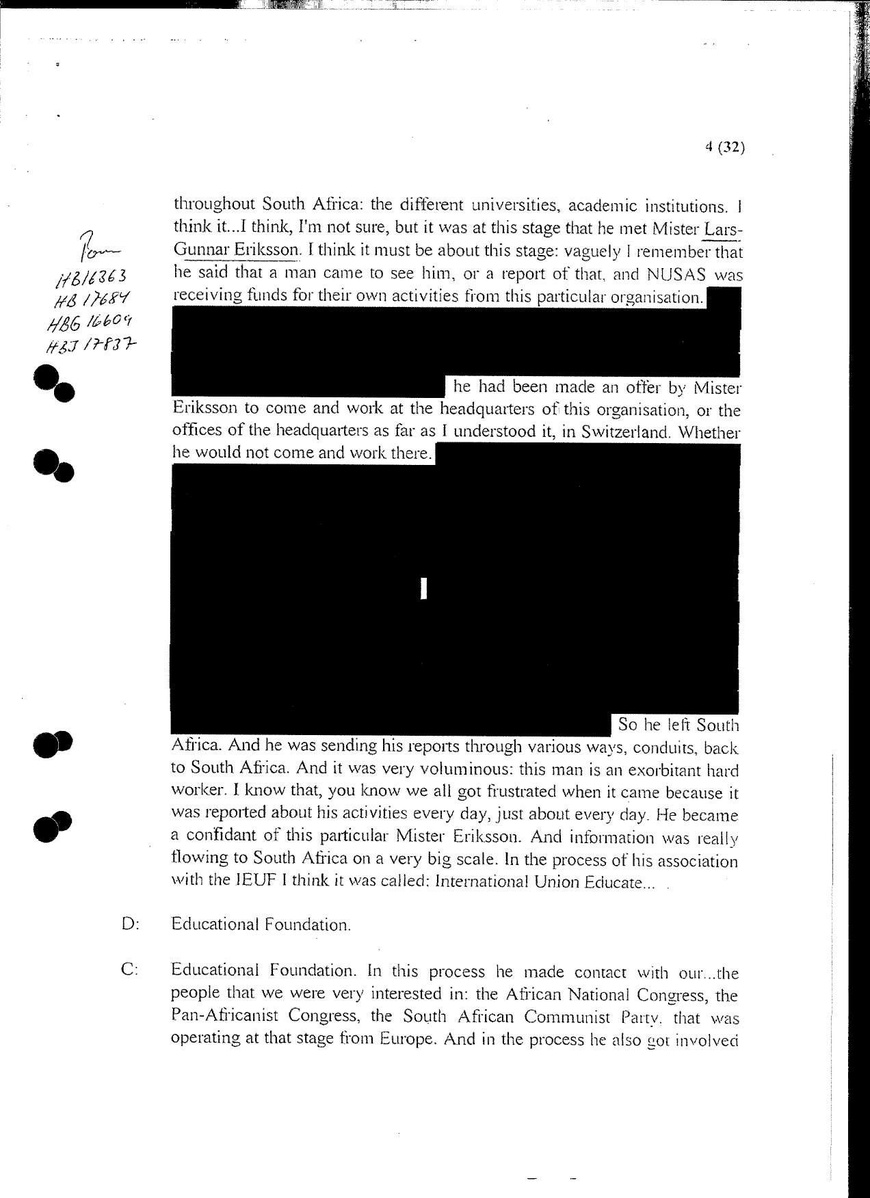
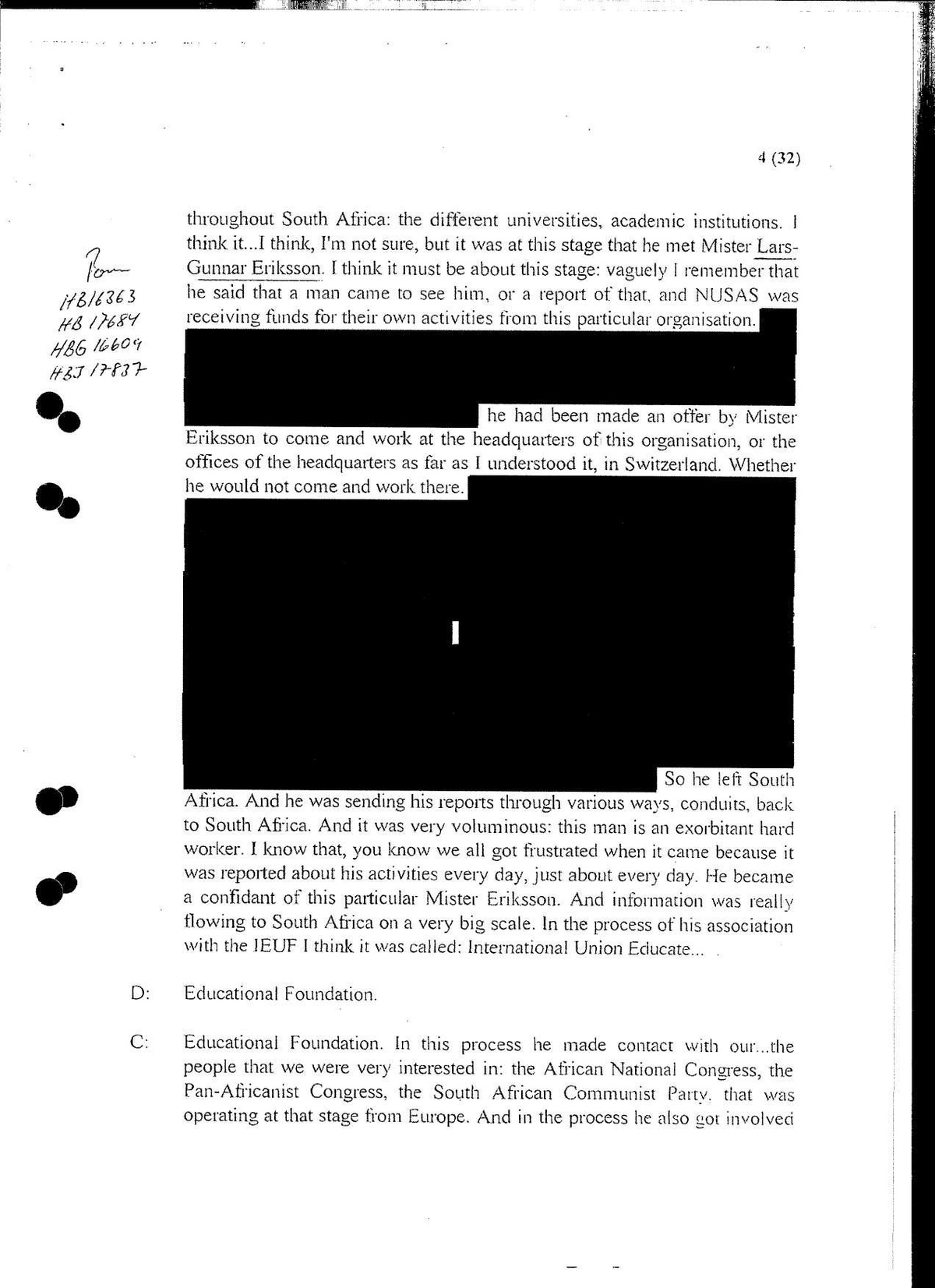
- - 4 (32) -
Johann Coetzee: throughout South Africa: the different universities, academic institutions.
I think it ... I think, I'm not sure, but it was at this stage that he met Mister Lars-Gunnar Eriksson. I think it must be about this stage: vaguely I remember that he said that a man came to see him, or a report of that, and NUSAS was receiving funds for their own activities from this particular organisation.
he had been made an offer by Mister Lars-Gunnar Eriksson to come and work at the headquarters of this organisation, or the offices of the headquarters as far as I understood it, in Switzerland. Whether he would not come and work there.
Helt stycke maskerat
So he left South Africa. And he was sending his reports through various ways, conduits, back to South Africa. And it was very voluminous: this man is an exorbitant hard worker.
I know that, you know we all got frustrated when it came because it was reported about his activities every day, just about every day.
He became a confidant of this particular Mister Lars-Gunnar Eriksson. And information was really flowing to South Africa on a very big scale. In the process of his association with the IEUF I think it was called: International Union Educate...
ÅKL Jan Danielsson: Educational Foundation.
Johann Coetzee: Educational Foundation. In this process he made contact with our ... the people that we were very interested in: the African National Congress, the Pan-Africanist Congress, the South African Communist Party, that was operating at that stage from Europe. And in the process he also got involved
Personer omnämnda:
HB16363 => HBN16363 ( )
HB17684 => HBM17684 (Referens behövs
)
HBG16609 => HB16609 (PM
SYDAFRIKA Riian Stander , KÄLLA A)
HBJ17837 (Förhör 1996-10-18 med Craig Williamson)
- - 5 (32) -
Johann Coetzee: with people that was associated with intelligence organisations of other nations, to the extent, to the extent that we here in South Africa at some stage thought that this IEUF was a front for either the CIA or a front for the Russians, because why are these people - they're supposed just to give money for humanitarian things, but they are involved in activities in South America, they're involved in activities in the Middle East, they're involved in activities in Britain, with this group that's fighting the Brits.
Hans Ölvebro: I.R.A.
Johann Coetzee: Yeah, I.R.A.. They know about, I don't say they're intimately involved, but they had links to these people and they had conferences and they spoke. And they had links with the Arabs, with what is it? Yassir Arafat and so on.
Helt stycke maskerat
He travelled extensively. He travelled to the Soviet Union, the old Soviet Union. He travelled to
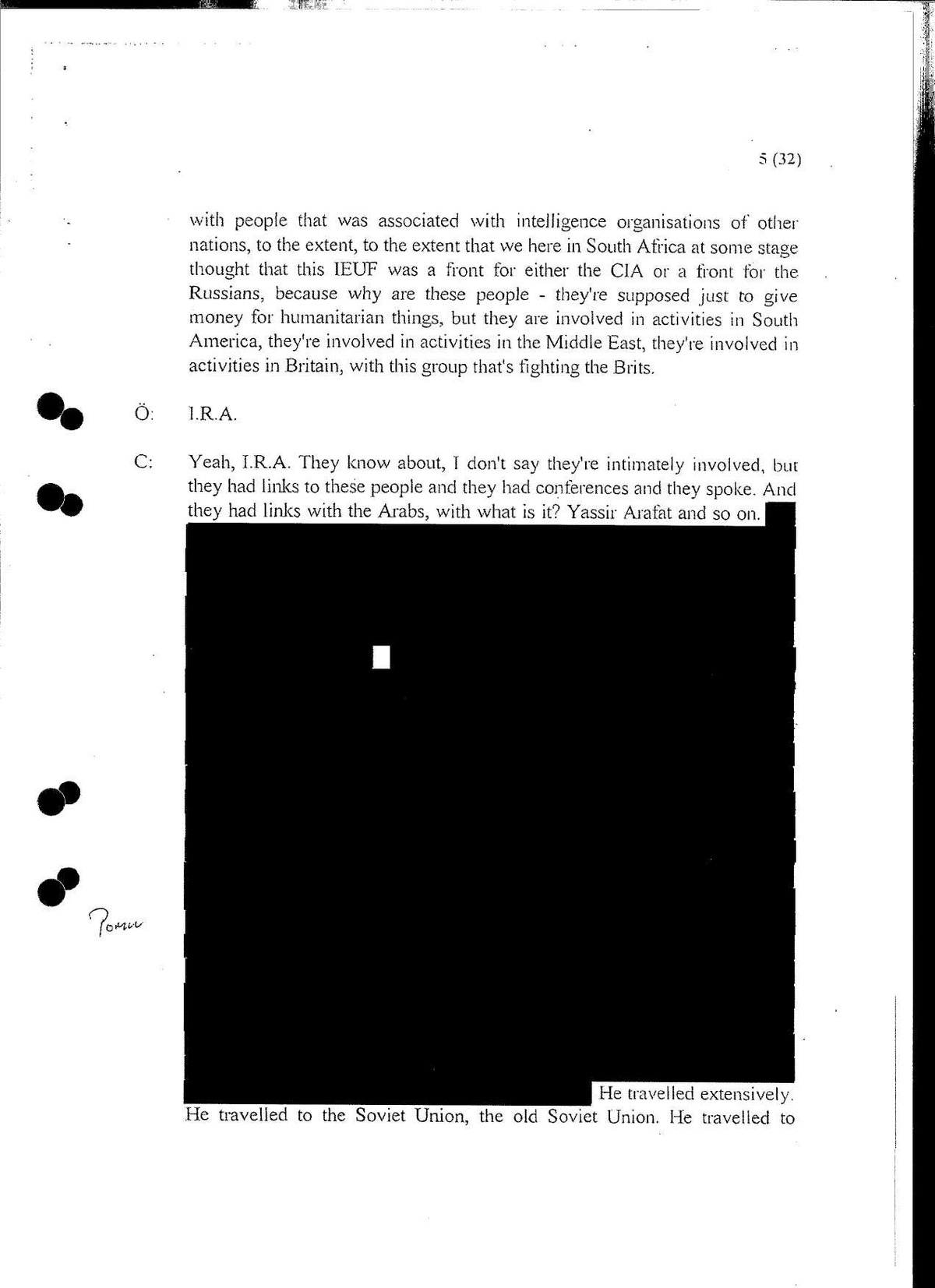
- - 5 (32) -
Johann Coetzee: with people that was associated with intelligence organisations of other nations, to the extent, to the extent that we here in South Africa at some stage thought that this IEUF was a front for either the CIA or a front for the Russians, because why are these people - they're supposed just to give money for humanitarian things, but they are involved in activities in South America, they're involved in activities in the Middle East, they're involved in activities in Britain, with this group that's fighting the Brits.
Hans Ölvebro: I.R.A.
Johann Coetzee: Yeah, I.R.A.. They know about, I don't say they're intimately involved, but they had links to these people and they had conferences and they spoke. And they had links with the Arabs, with what is it? Yassir Arafat and so on.
Helt stycke maskerat
He travelled extensively. He travelled to the Soviet Union, the old Soviet Union. He travelled to
- - 6 (32) -
Johann Coetzee: Britain regularly.
He travelled throughout the length and breadth of South ... of Africa, all the countries.
So we were ... we had a man that if it leaked out at all that he was associated with the South African intelligence organisations, he would immediately be shot. That's that.
So I mean we would ... had to be very careful for him.
But money was coming through to South Africa on a reasonably regular scale: in cash, basically in cash.
I must say what happened, that we created in South Africa an organisation that was supposed to be his organisation, you understand.
He pretended there that he had people here that could do certain things: collect certain information or do certain jobs and so on.
For instance: Mister Lars-Gunnar Eriksson approached him and said ... Can we just stop the thing? We have to...
FHL Hans Ölvebro: At this point we were interrupted by Johan Coetzee's daughter who offered us refreshments. The interrogation was therefore interrupted for ten minutes but is now being resumed at 11:10.
Yes please sir, can you go on? Do you remember where you were?
Johann Coetzee: Yes I remember that I said that Mister Lars-Gunnar Eriksson approached Mister Craig Williamson and said they wanted in South Africa a place, a secluded place, where people who wanted to join the ANC and go for military training outside the country could be hidden for a period before they go on what we termed 'the escape route', you know because I mean you've got to go over the border and so on.
Now obviously this was very valuable for us, because that way we knew who was going to leave for military training, you know.
And the information that came from Mister Craig Williamson indicated that they must rent a place. Rent a place.
Now obviously we couldn't go in South Africa and say:
- "We're the police, we want to rent a place" for a thing like that.
We've got to do it in a hidden way. I'm coming back to the position that I said: we had to create an organisation that was supposed to support him here: a small organisation consisting basically of policemen that was under cover, that people didn't know.
So in between Johannesburg and Pretoria a place was identified as a possible place that we could rent.
And they would pay from Switzerland something like a thousand or two thousand Rand per month.
And now I've said that there was a group of about ten people working with all this information between ...
The group consisted of National Intelligence and police chaps.
And once or twice a month I went to this ... this offices and you know we ... they put the difficult, the delicate things in front of me or
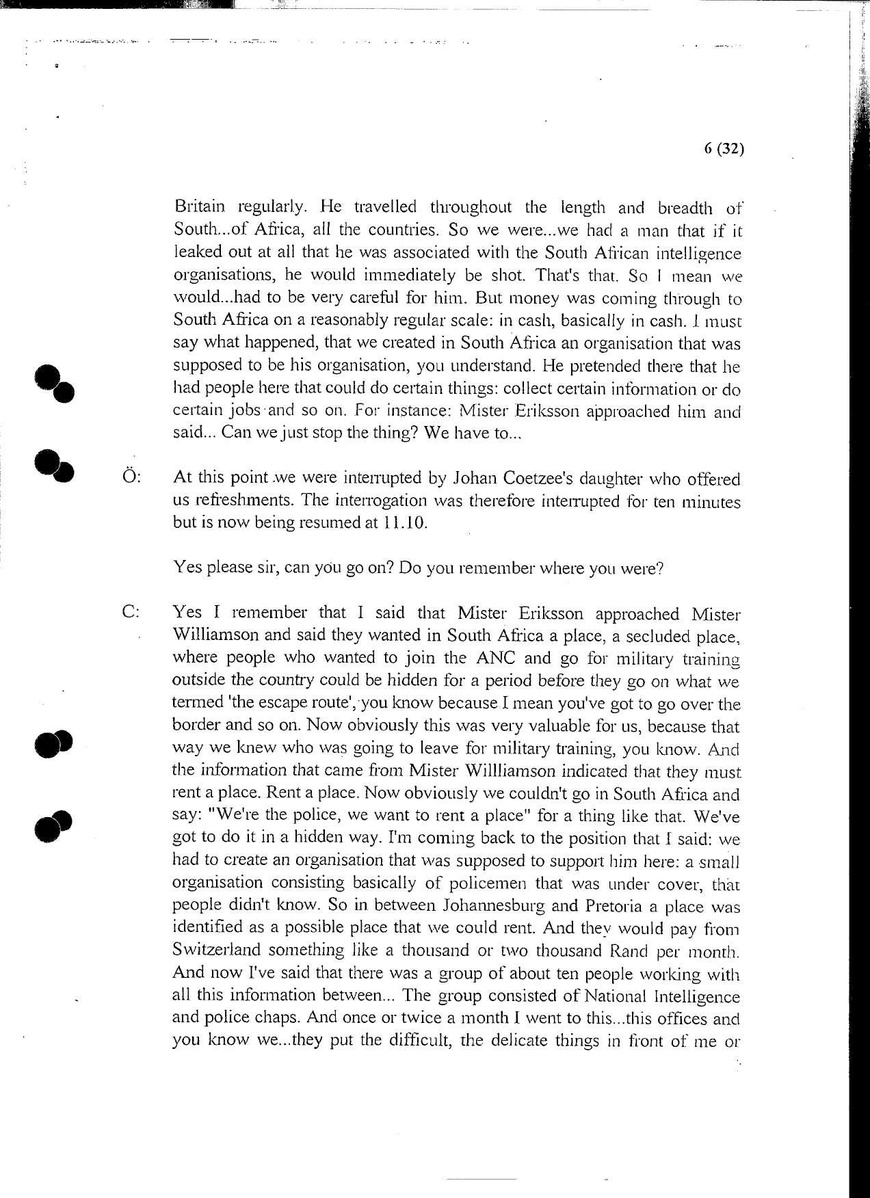
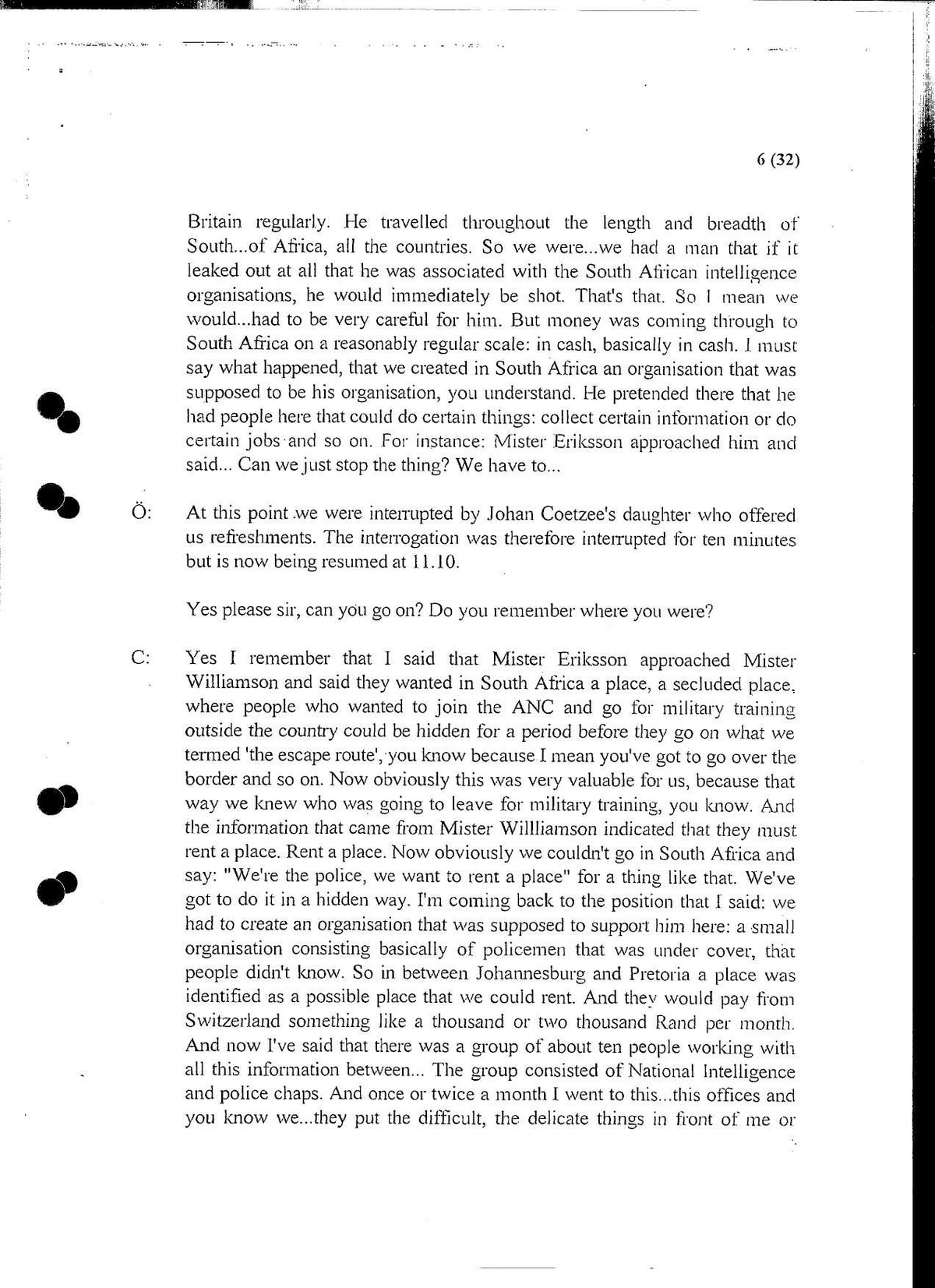
- - 6 (32) -
Johann Coetzee: Britain regularly.
He travelled throughout the length and breadth of South ... of Africa, all the countries.
So we were ... we had a man that if it leaked out at all that he was associated with the South African intelligence organisations, he would immediately be shot. That's that.
So I mean we would ... had to be very careful for him.
But money was coming through to South Africa on a reasonably regular scale: in cash, basically in cash.
I must say what happened, that we created in South Africa an organisation that was supposed to be his organisation, you understand.
He pretended there that he had people here that could do certain things: collect certain information or do certain jobs and so on.
For instance: Mister Lars-Gunnar Eriksson approached him and said ... Can we just stop the thing? We have to...
FHL Hans Ölvebro: At this point we were interrupted by Johan Coetzee's daughter who offered us refreshments. The interrogation was therefore interrupted for ten minutes but is now being resumed at 11:10.
Yes please sir, can you go on? Do you remember where you were?
Johann Coetzee: Yes I remember that I said that Mister Lars-Gunnar Eriksson approached Mister Craig Williamson and said they wanted in South Africa a place, a secluded place, where people who wanted to join the ANC and go for military training outside the country could be hidden for a period before they go on what we termed 'the escape route', you know because I mean you've got to go over the border and so on.
Now obviously this was very valuable for us, because that way we knew who was going to leave for military training, you know.
And the information that came from Mister Craig Williamson indicated that they must rent a place. Rent a place.
Now obviously we couldn't go in South Africa and say:
- "We're the police, we want to rent a place" for a thing like that.
We've got to do it in a hidden way. I'm coming back to the position that I said: we had to create an organisation that was supposed to support him here: a small organisation consisting basically of policemen that was under cover, that people didn't know.
So in between Johannesburg and Pretoria a place was identified as a possible place that we could rent.
And they would pay from Switzerland something like a thousand or two thousand Rand per month.
And now I've said that there was a group of about ten people working with all this information between ...
The group consisted of National Intelligence and police chaps.
And once or twice a month I went to this ... this offices and you know we ... they put the difficult, the delicate things in front of me or
- - 7 (32) -
Johann Coetzee: National Intelligence and the senior man there and then we decided, 'well we're going to do this', or 'this is what we must do'.
In this case we decided it's very risky to every month one of us to go to a owner of a place and say:
- "Well, here's your rent. Here's your rent."
You've got to give a name, you've got to say where you are, who are you and so on. This is a risky business. What we must do, we must buy a place, on a permanent basis and pay it from this money that he has sent.
And this is what we did there.
And then we decided now how are we going to buy a place that no-one would know was the police buying it.
So I had, not long before that, bought a property from a Jewish firm. You know, a Jewish lady, but in South Africa when you transfer property you've got to go to an attorney.
And I went to the same old lady and I said "I ... my name is so-and-so" and I gave a false name, and I said
- "I'm buying from this man a property and here's the money."
I think it was something like ten or twenty thousand Rand. And she said to me:
- "But don't I know you? Don't I know you?"
But she's an old lady. I say
- "No, no." "I'm sure... Must be your brother or something."
Anyway, we bought the place in the name of Mister John Davis, Mister John Davis. Now that is the place that they refer to sometimes as 'Daisy Farm'.
You've come across it in this process. It's in between Johannesburg and Pretoria in the area of the Modder Rivierspoort Dam, more or less there, in the scrub area: there's tough mountains. Very secluded and so on.
- Helt stycke maskerat
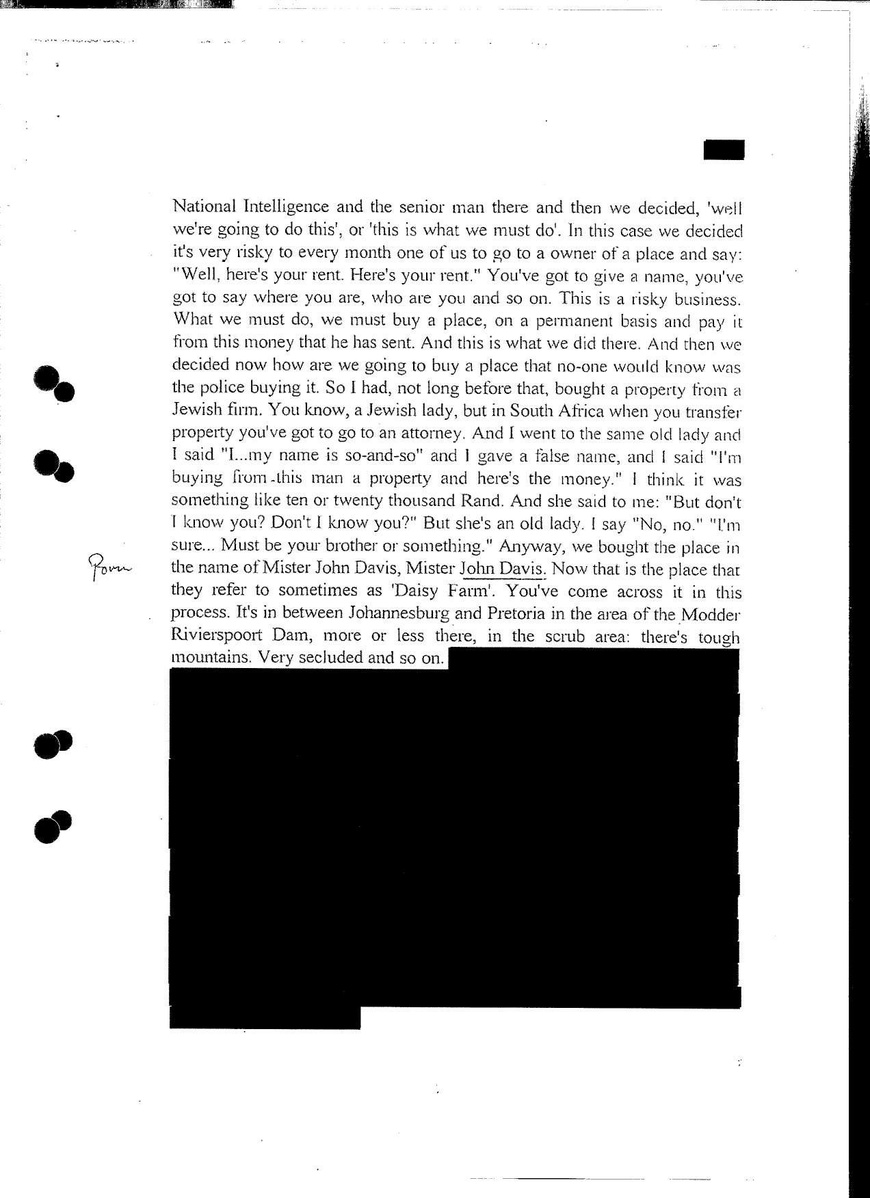
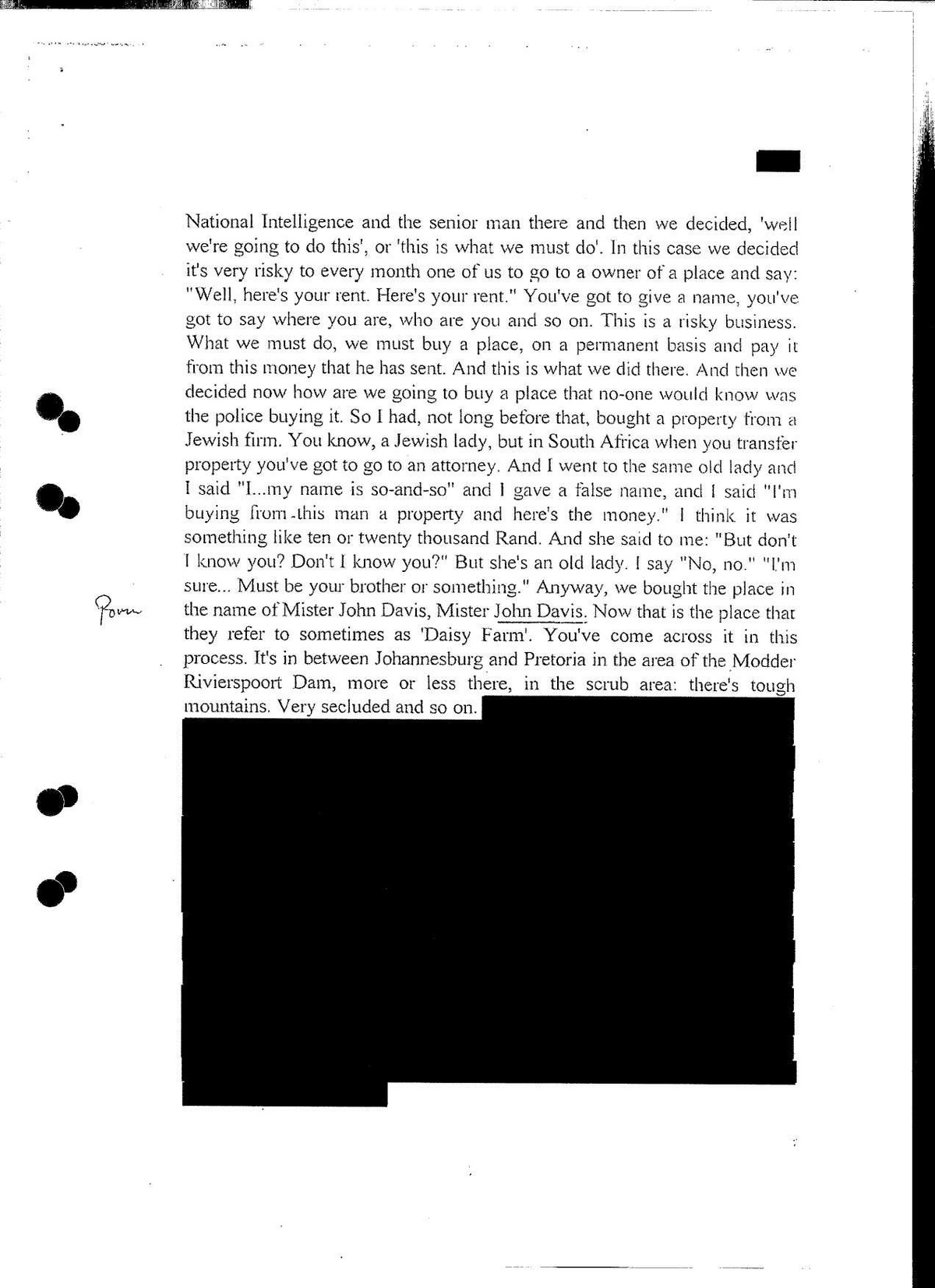
- - 7 (32) -
Johann Coetzee: National Intelligence and the senior man there and then we decided, 'well we're going to do this', or 'this is what we must do'.
In this case we decided it's very risky to every month one of us to go to a owner of a place and say:
- "Well, here's your rent. Here's your rent."
You've got to give a name, you've got to say where you are, who are you and so on. This is a risky business. What we must do, we must buy a place, on a permanent basis and pay it from this money that he has sent.
And this is what we did there.
And then we decided now how are we going to buy a place that no-one would know was the police buying it.
So I had, not long before that, bought a property from a Jewish firm. You know, a Jewish lady, but in South Africa when you transfer property you've got to go to an attorney.
And I went to the same old lady and I said "I ... my name is so-and-so" and I gave a false name, and I said
- "I'm buying from this man a property and here's the money."
I think it was something like ten or twenty thousand Rand. And she said to me:
- "But don't I know you? Don't I know you?"
But she's an old lady. I say
- "No, no." "I'm sure... Must be your brother or something."
Anyway, we bought the place in the name of Mister John Davis, Mister John Davis. Now that is the place that they refer to sometimes as 'Daisy Farm'.
You've come across it in this process. It's in between Johannesburg and Pretoria in the area of the Modder Rivierspoort Dam, more or less there, in the scrub area: there's tough mountains. Very secluded and so on.
- Helt stycke maskerat
- - 8 (32) -
ÅKL Jan Danielsson: Do you remember when you bought the farm?
Johann Coetzee: It must have been ... we can ... you can check that at the police. When I left the police ...
You know now I'm sitting now with a small farm on my land when I retire from the police. Then I went to the then security and I said:
- "Listen, you remember this place? You must ... I want it off my name now, or otherwise you must give it to me as a present. And I then ... they went to an attorney and I never went to the attorney but they brought documents that this Mister John Davis is now giving a present to the South African State, to South Africa.
- (Nästa mening obegriplig. Afrikaans?).
And I said:
- "Well this is a nice present for you"
so I gave it to the state as a present. Perhaps I should have kept it and sold it!
But anyway it was given back and they can research it there, you know when exactly because there must be documents and there must be ... the title deeds must show all this: that Mister John Davis, that's why I mentioned the name, has given this as a present.
Remember now the IUEF has disappeared many years ago, now what do you do with it? What can you do with this thing?
But this is the Daisy Farm that they referred to and so on.
All right, now I've spoken about the money situation: the money situation, I think I must elaborate a little bit on that, because I see there are many allegations about that.
The money situation was that the IEUF would draw up a budget.
They'd compile a budget for their operations throughout the world, in a vague type of way, but the money is there, the money is stipulated there.
And we were given a copy of this budget in South Africa, through Mister Craig Williamson, for his activities here.
Now then this money came to South Africa in various ways. Some of them we could never exactly work out how did this money come to South Africa. Through what means? What conduits?
For instance, what they would do: they would go to South Africa and they'd say: "Have you got an interest or an investment in a European country? Italian or a Greek and so on.
And, but you stay in South Africa. Or do you want an investment somewhere in Europe? And this man would say: "Yes", perhaps.
Then they'd say:
- "Well all right, we'll put in your bank account in Germany or in Greece or in Holland or in England so much money. Will you make that money available in South Africa?"
So we'd be placed in a position that we've got an account which is now supposed to be Craig Williamson's account, and suddenly there's a lot of money in there and no-one knows.
How ... you know there's no trace of how this money came.
Then afterwards you'd find out that neither could Craig Williamson find out exactly there who they had approached.
In a few cases I think he was able to say it's big
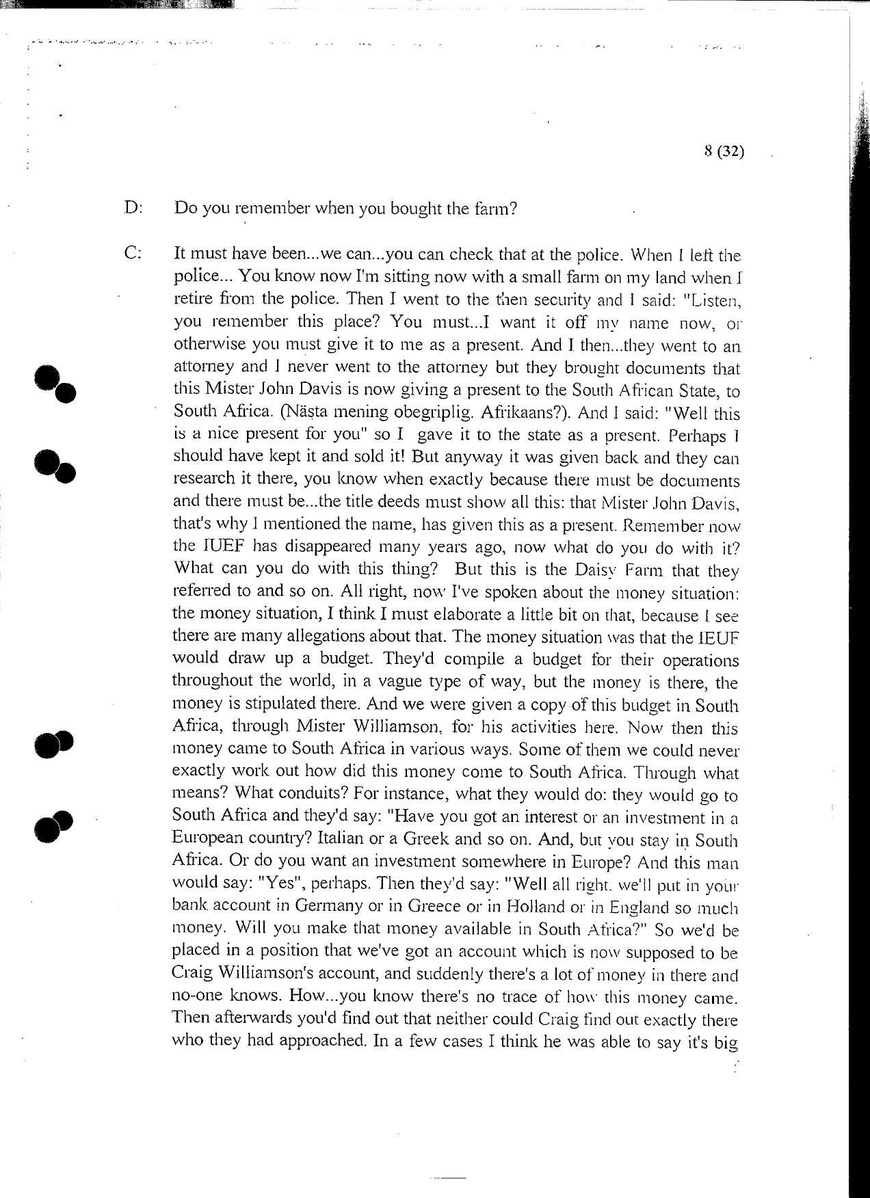
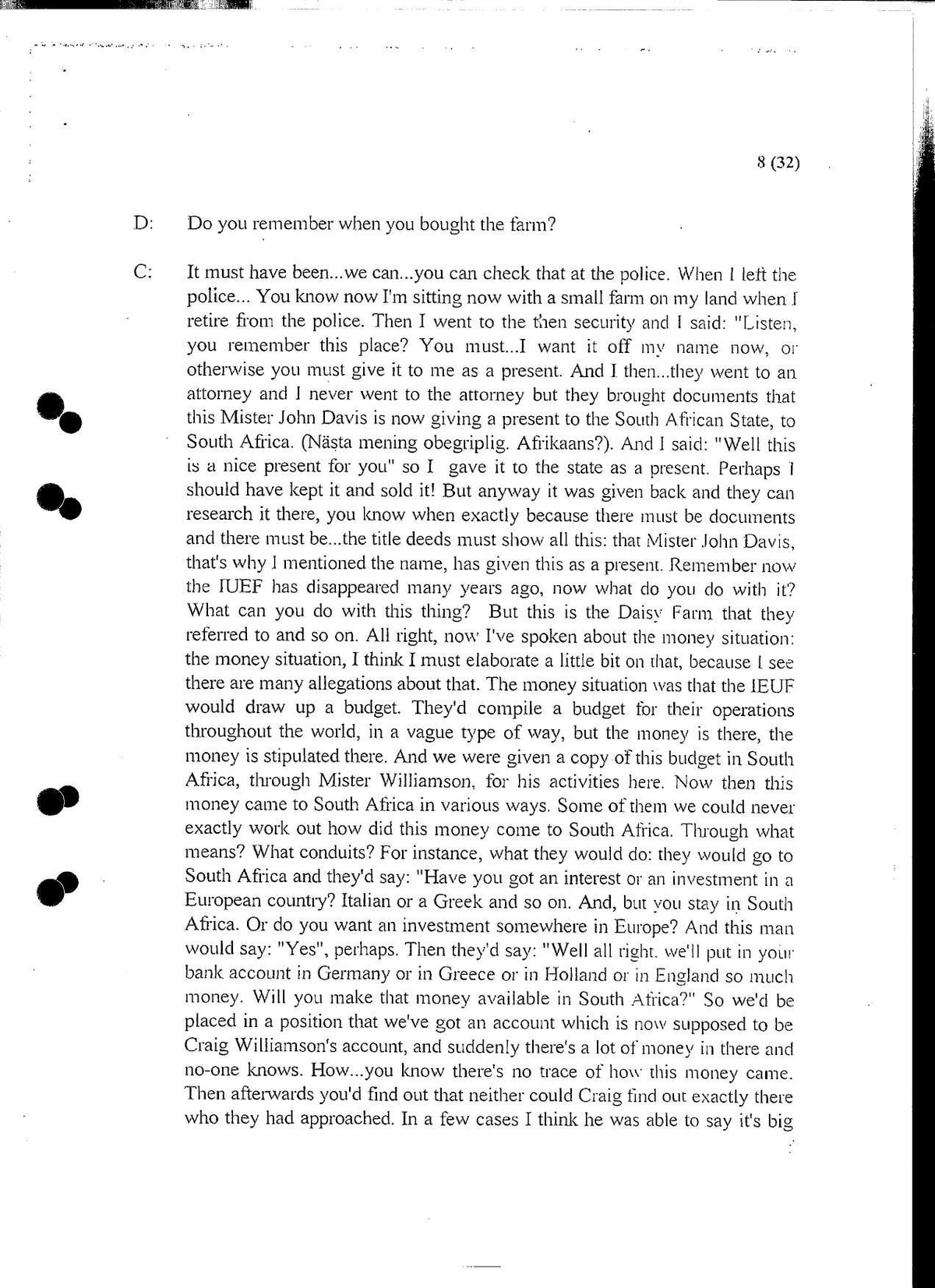
- - 8 (32) -
ÅKL Jan Danielsson: Do you remember when you bought the farm?
Johann Coetzee: It must have been ... we can ... you can check that at the police. When I left the police ...
You know now I'm sitting now with a small farm on my land when I retire from the police. Then I went to the then security and I said:
- "Listen, you remember this place? You must ... I want it off my name now, or otherwise you must give it to me as a present. And I then ... they went to an attorney and I never went to the attorney but they brought documents that this Mister John Davis is now giving a present to the South African State, to South Africa.
- (Nästa mening obegriplig. Afrikaans?).
And I said:
- "Well this is a nice present for you"
so I gave it to the state as a present. Perhaps I should have kept it and sold it!
But anyway it was given back and they can research it there, you know when exactly because there must be documents and there must be ... the title deeds must show all this: that Mister John Davis, that's why I mentioned the name, has given this as a present.
Remember now the IUEF has disappeared many years ago, now what do you do with it? What can you do with this thing?
But this is the Daisy Farm that they referred to and so on.
All right, now I've spoken about the money situation: the money situation, I think I must elaborate a little bit on that, because I see there are many allegations about that.
The money situation was that the IEUF would draw up a budget.
They'd compile a budget for their operations throughout the world, in a vague type of way, but the money is there, the money is stipulated there.
And we were given a copy of this budget in South Africa, through Mister Craig Williamson, for his activities here.
Now then this money came to South Africa in various ways. Some of them we could never exactly work out how did this money come to South Africa. Through what means? What conduits?
For instance, what they would do: they would go to South Africa and they'd say: "Have you got an interest or an investment in a European country? Italian or a Greek and so on.
And, but you stay in South Africa. Or do you want an investment somewhere in Europe? And this man would say: "Yes", perhaps.
Then they'd say:
- "Well all right, we'll put in your bank account in Germany or in Greece or in Holland or in England so much money. Will you make that money available in South Africa?"
So we'd be placed in a position that we've got an account which is now supposed to be Craig Williamson's account, and suddenly there's a lot of money in there and no-one knows.
How ... you know there's no trace of how this money came.
Then afterwards you'd find out that neither could Craig Williamson find out exactly there who they had approached.
In a few cases I think he was able to say it's big
- - 9 (32) -
Johann Coetzee: business concerns and so on, but in many cases we never knew exactly how there.
Another matter that we never solved was: when Craig Williamson came to South Africa, or Africa actually, and we could meet him, he gave us money in cash: brand new South African ten-Rand notes, brand new.
How they got it in Europe and from what source they got it in Europe, we could never find out. That was one thing that was baffling us.
We tried to, because it was handed, they had a treasurer also there, it was just handed to Craig Williamson in cash:
- "There's ten thousand for your South African operation."
There's that. That is the one problem that we could never solve.
The other problem that was a difficult problem to solve in South Africa is: you are now, you've created an organisation that's supposed to underpin Craig Williamson's activities.
Now for instance, I think to give you an example gives you a better, as a prosecutor. They'd say:
- "We must give ten thousand Rand to Mister Sam Nyoma's mother."
You know they were also in contact with SWAPO in Namibia.
- "Go and give her this ten thousand Rand."
Now it comes in cash or through this conduit that we don't know who deposited this in our account.
We had the banks on our side: we eventually went to the senior people of the banks and said:
- "But you must tell us where the money comes from."
And they said, well they can't: it's overseas transfers, basically overseas transfers, we don't know.
It's from Barclay's Bank in London, it's from Deutsche Bank in Germany and so on. So we're stuck with this problem.
And we couldn't go and investigate and say:
- "It's the police, we're investigating"
because then we're revealing it.
So now we've got to give ten thousand Rand to Mister Sam Nyoma's mother in ...
Now, how do you do that? You send a courier with the money.
Who pays for this? The police? With a police card? And you give him subsistence to like ...
Or do you send someone to rent a car and pretend he's someone else with this money and to crop up at night at this house and without saying anything and says:
- "You know there's this money for you."
You understand it was a very difficult problem that eventually I approached in South Africa the Treasury about, you know to give us guidelines.
How much do ... this man is working for the police he gets a salary.
Now Craig Williamson says:
- "Give the courier a thousand Rand."
The regulations for the police say you can't give a man a thousand Rand as a present.
What do you do with this money now?
You understand you're always in a difficult problematical situation.
That's why I say that this ... in this process there were very many difficult situations that arose: you've got to buy a property, you've got to buy a thousand watches.
How do you do it? Do you do it with South African money or do you do it
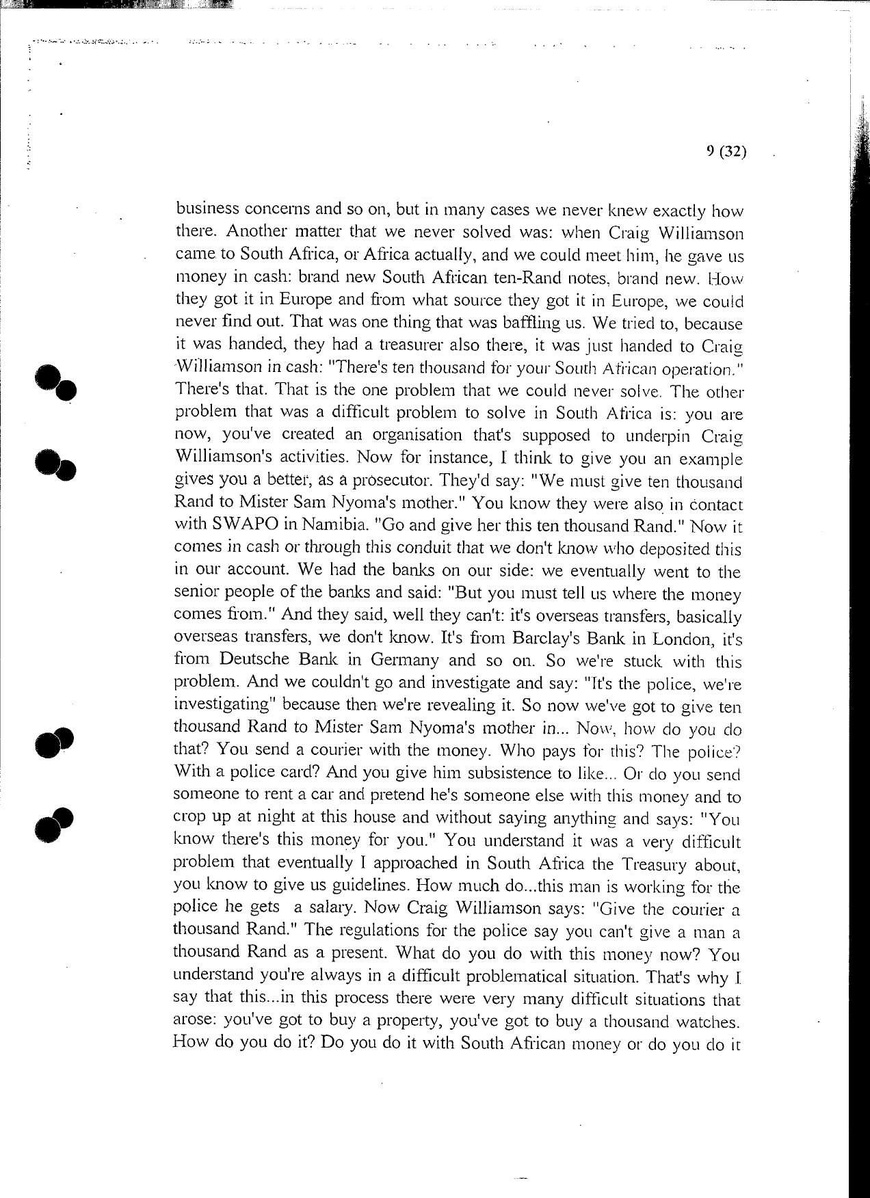
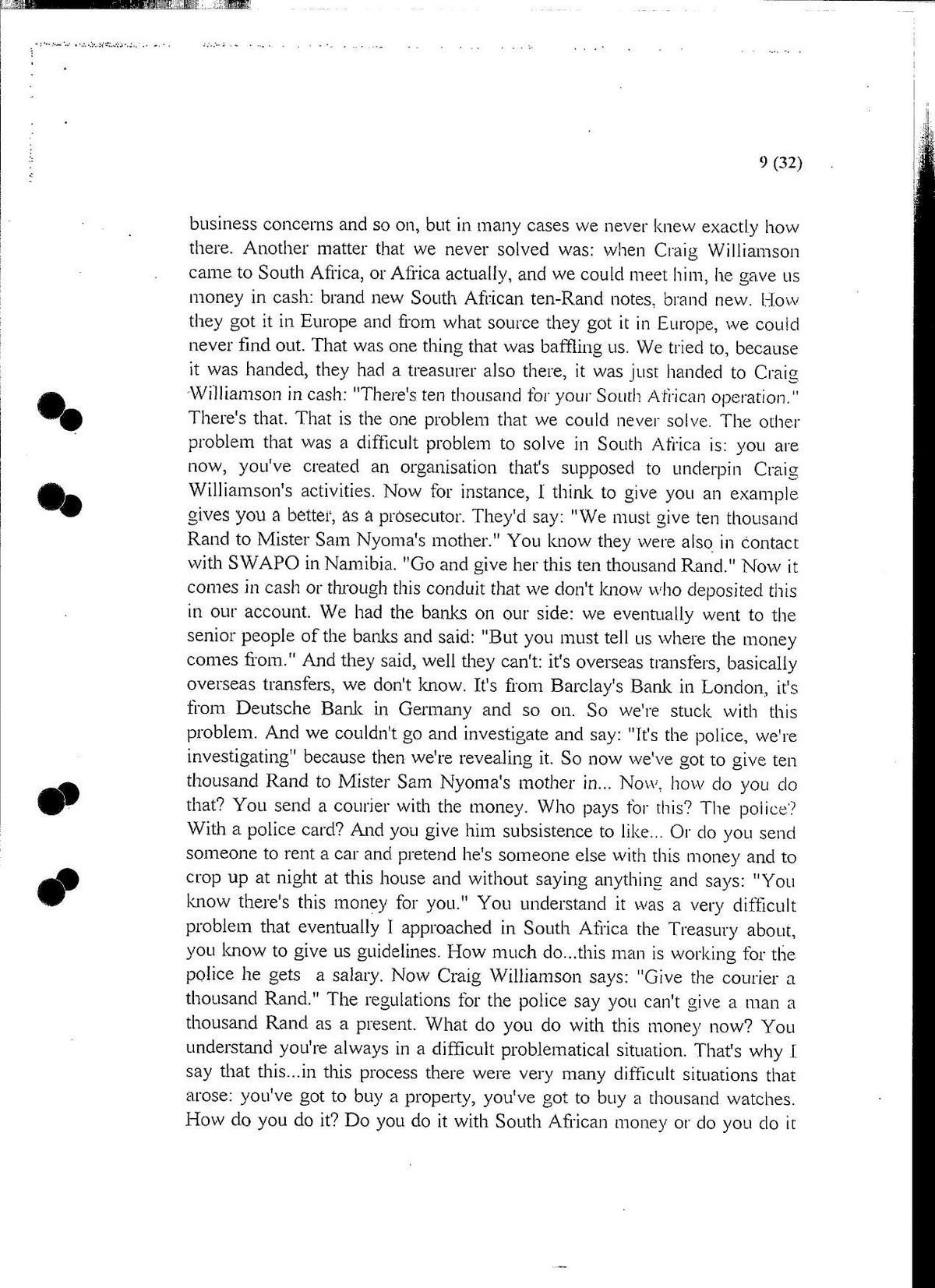
- - 9 (32) -
Johann Coetzee: business concerns and so on, but in many cases we never knew exactly how there.
Another matter that we never solved was: when Craig Williamson came to South Africa, or Africa actually, and we could meet him, he gave us money in cash: brand new South African ten-Rand notes, brand new.
How they got it in Europe and from what source they got it in Europe, we could never find out. That was one thing that was baffling us.
We tried to, because it was handed, they had a treasurer also there, it was just handed to Craig Williamson in cash:
- "There's ten thousand for your South African operation."
There's that. That is the one problem that we could never solve.
The other problem that was a difficult problem to solve in South Africa is: you are now, you've created an organisation that's supposed to underpin Craig Williamson's activities.
Now for instance, I think to give you an example gives you a better, as a prosecutor. They'd say:
- "We must give ten thousand Rand to Mister Sam Nyoma's mother."
You know they were also in contact with SWAPO in Namibia.
- "Go and give her this ten thousand Rand."
Now it comes in cash or through this conduit that we don't know who deposited this in our account.
We had the banks on our side: we eventually went to the senior people of the banks and said:
- "But you must tell us where the money comes from."
And they said, well they can't: it's overseas transfers, basically overseas transfers, we don't know.
It's from Barclay's Bank in London, it's from Deutsche Bank in Germany and so on. So we're stuck with this problem.
And we couldn't go and investigate and say:
- "It's the police, we're investigating"
because then we're revealing it.
So now we've got to give ten thousand Rand to Mister Sam Nyoma's mother in ...
Now, how do you do that? You send a courier with the money.
Who pays for this? The police? With a police card? And you give him subsistence to like ...
Or do you send someone to rent a car and pretend he's someone else with this money and to crop up at night at this house and without saying anything and says:
- "You know there's this money for you."
You understand it was a very difficult problem that eventually I approached in South Africa the Treasury about, you know to give us guidelines.
How much do ... this man is working for the police he gets a salary.
Now Craig Williamson says:
- "Give the courier a thousand Rand."
The regulations for the police say you can't give a man a thousand Rand as a present.
What do you do with this money now?
You understand you're always in a difficult problematical situation.
That's why I say that this ... in this process there were very many difficult situations that arose: you've got to buy a property, you've got to buy a thousand watches.
How do you do it? Do you do it with South African money or do you do it
















